
Fratelli Carli S.p.A. Società Benefit


Fratelli Carli S.p.A. Società Benefit
Our Responsible Progress: tradition, excellence, environment
Fratelli Carli S.p.A. Società Benefit
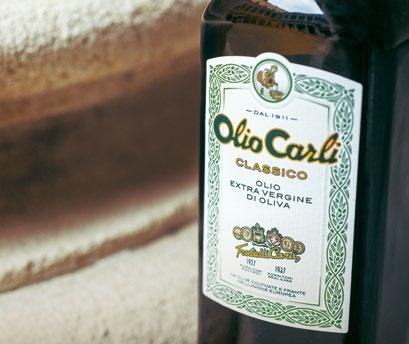



In the following pages, you will find an account of our projects and activities, of the commitments we are able to meet every day, thanks to a solid, structured system of sustainability governance, reflected in our Benefit Corporation status and our B Corp certification, a first in Italy.
The presentation of the Sustainability Report is always an important occasion for reflection and sharing, and all the more so following such a challenging year as the one that has just ended.
The world of oil has had to deal with another poor harvest, due to a prolonged drought that severely impacted olive oil production, resulting in an unprecedented spike in prices, particularly for high-quality oil.
The skills acquired throughout our long history have enabled us to rise to this challenge with the serious, attentive approach to our customers we have always been renowned for, without compromising on quality, and with a stronger-than-ever focus on sustainability.
So in the pages that follow, you will find an account of the practical actions adopted with regard to People, Products and Materials, the Supply Chain, Energy and Resources, and the Mediterranean Tradition and Culture.
We are able to meet these commitments every day, thanks to our solid, structured sustainability governance, reflected in our Benefit Corporation status and our B Corp certification, a first in Italy, which allow us to take effective, shared action aimed at achieving the mediumterm goals we have set ourselves.
Welcome to our Sustainability Report: an effective illustration of our desire to continue down this road, engaging our workers, suppliers and customers in our efforts, in the awareness that our role – as a business and as a family – is to build what we call Responsible Progress
Claudia, Gian Franco and Carlo Carli
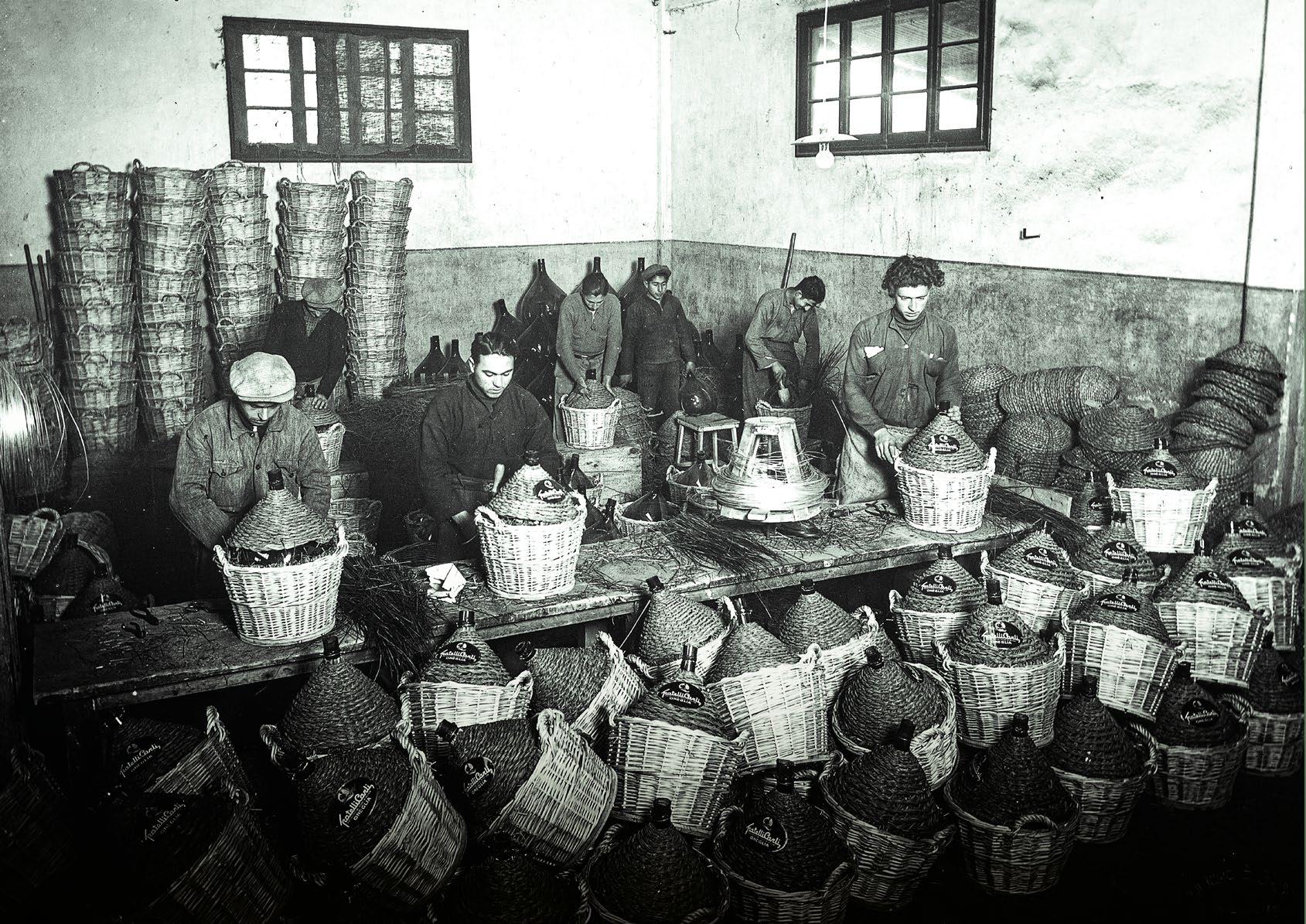
Working hard, getting it right. With intelligence, tenacity and humility. No showing off, no getting disheartened. Confident, without being smug, that we’ve always strived to get things right, undertaking to use our experience to do better every day. Always ready, when necessary, to study and to learn something new. In short, our approach to work means trusting in and relying on ourselves and our strengths.
Fratelli Carli is a longstanding Ligurian olive oil company. Since 1911, we have sold our products directly to consumers, with home deliveries both in Italy and abroad. The company is inextricably linked to its home in the Imperia area, a timehonored, traditional Italian olive oil production zone. A heritage that Fratelli Carli has been able to preserve over many decades, handing down unique skills and experience from one generation to the next to ensure prime quality.
Fratelli Carli produces olive oil, traditional Ligurian and Mediterranean preserves and various delicacies, with our olive oil contributing to their excellence. The company is also renowned for its wines and cosmetic products.
A signature feature of the company has always been our distribution model. Consumers worldwide can place their orders directly by phone, by regular mail or online. Delivery is ensured by a broad-reaching logistics network. The national network is operated by trusted transporters and a fleet of vans with the company livery. Full satisfaction and efficiency are guaranteed.
In the 2000s, we decided to also open a retail channel, with directly run single-brand stores. Twenty Emporiums have been opened to date, thus offering customers an omnichannel sales model, and the opportunity to choose how they purchase our products.
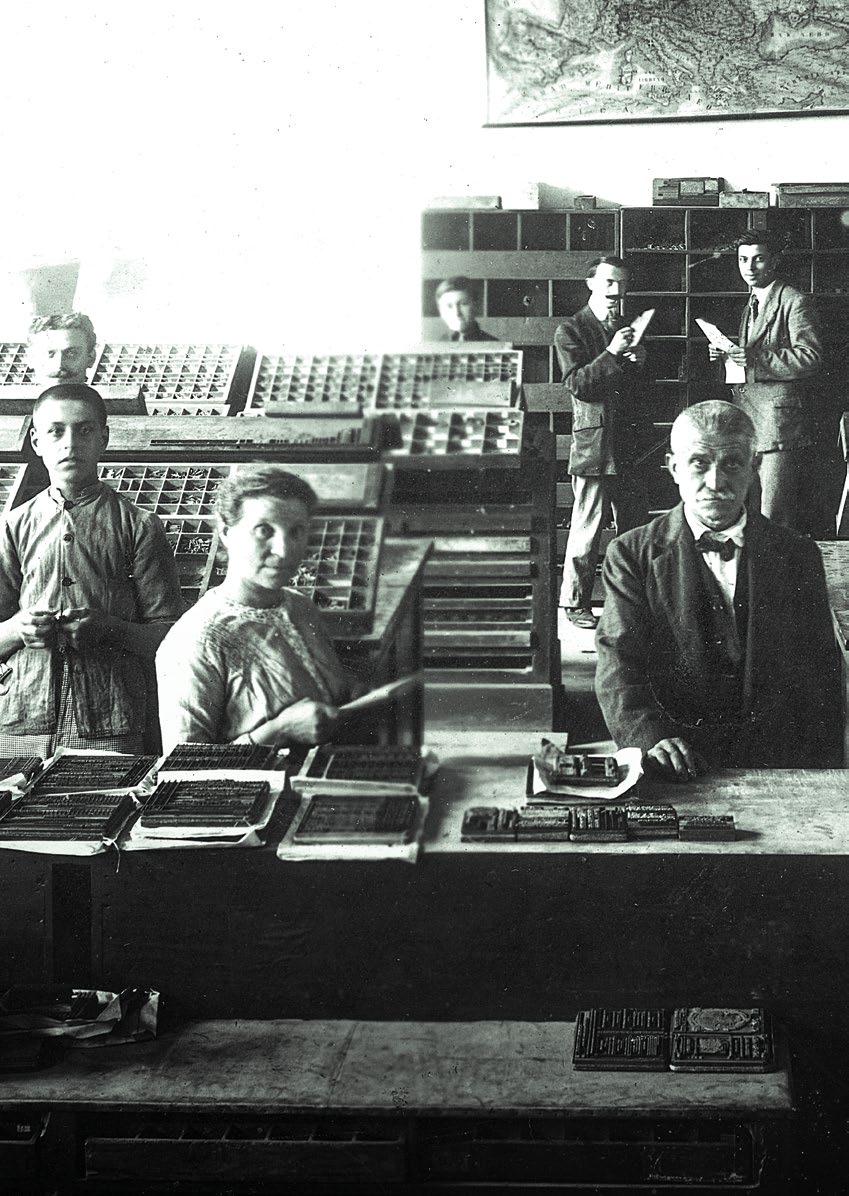
This is what we have achieved so far… and we plan to do more and better going forward. .
This detailed account reaches out to the public at large, seeking in particular to remind our children and grandchildren how the company began and how it has grown, telling the story of a family whose achievements deserve to be recognized and acknowledged.
1961
The power of an idea
A record of excellence spanning more than a hundred years
Fratelli Carli was founded in 1911 by Giovanni Carli, who saw a great future in store for the olive-growing tradition of his native Imperia.
The business continues to this day as a repository of unique knowledge and skills handed down over four generations, not to mention the love we nurture for the olive, part of the company’s DNA.
This year saw an exceptional harvest in the Carli family’s olive grove. The twentyyear-old Giovanni, one of the six children of Carlo Carli, a printer in Oneglia, thought he would offer the abundant olive oil not to local traders, but directly to families residing in the nearby Piedmont region.
1920
The creativity that shaped the company’s history
The renowned commercial artist, Plinio Codognato, devised the Fratelli Carli logo that accompanied the firm for 87 years.
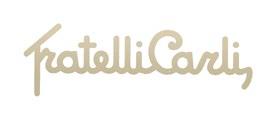
1948
The first post-war price list
The 1943 and 1944 bombing raids destroyed the plant. The young Carlo Carli, Giovanni’s son, rebuilt the company, and sales resumed in 1948.
1912
The first price list
1936
The first Ricettario Carli cookery book
1965
The first Fratelli Carli vans
The family’s printing business was key to the success of the enterprise, allowing them to produce price lists in order to reach out to new customers.
A year before the company was honored as a Purveyor to the Royal Household, the chef of the Royal Household, Cav. Pettini, penned the first Ricettario Carli (Carli cookery book), enriched with illustrations by Cappadonia. This gift to all Carli customers ushered in a tradition that remains to this day.
In its effort to fully satisfy demand, Fratelli Carli launched its fleet of vans for home delivery, replacing delivery by rail.
Fratelli Carli, a Benefit Corporation
At the heart of the new headquarters, built in 1971, was an innovative Data Processing Center, allowing the company to look ahead to the future.
The company’s hallmark philosophy of well-being prompted the launch of the Mediterranea olive oil cosmetics range.
A celebration of a century of tradition, quality and sustainability, which continues with the fourth generation of the family, who joined the company during the 2000s.
As a testament to the company’s commitment to sustainable innovation, the Fratelli Carli articles of association were amended, and it became a Benefit Corporation.
Fratelli Carli was one of the first companies to believe in the potential of internet. After the first website, oliocarli.it, came the platforms in the languages of the countries in which Carli products are sold.
The first Fratelli Carli Emporium opened in the Imperia factory, inaugurating a successful retail format subsequently replicated in the main cities in Italy.
B Corp certification
2022
Toward Carbon Neutrality
Fratelli Carli was the first Italian manufacturing company to obtain B Corp certification.
Rising to a global challenge, Fratelli Carli has set out a plan to measure and reduce emissions, and has decided to embark on a process to offset them, prioritizing delivery logistics.
Scan the QR code to learn about the key moments in the history of Fratelli Carli
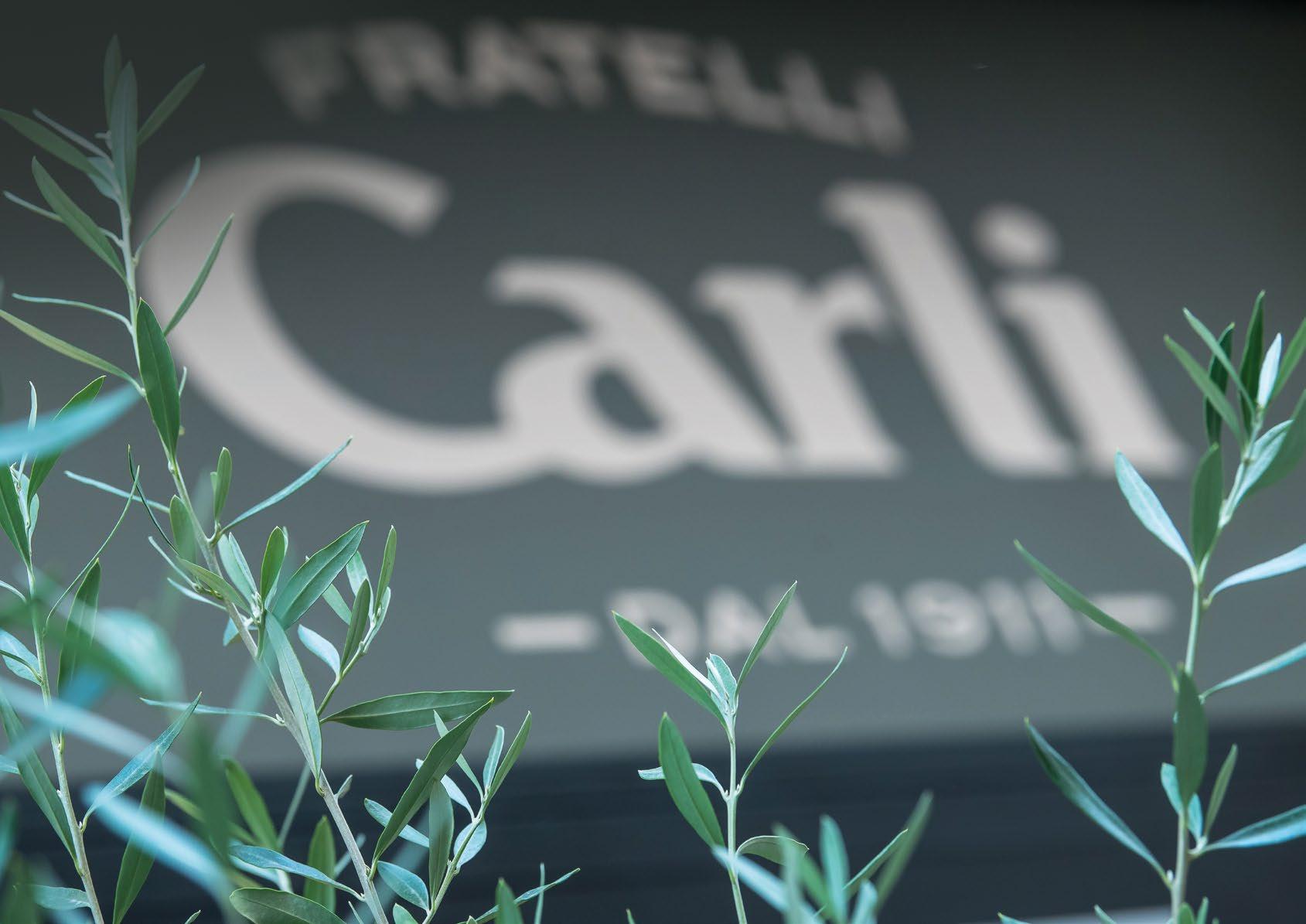
Fostering the culture of the olive and of Italian taste, by engaging directly with our customer base, always under the banners of ethics, quality, and respect for the environment and for people.
For over a century, the company has placed importance on the local culture, with a passion for quality and respect for hard work. On a daily basis, Fratelli Carli enters customers’ homes, not just to deliver products, but to convey its vision and values, with the aim of preserving a unique relationship, which in many cases stretches back decades.
Sustainability Working to make a difference
We comply with rigorous social and environmental standards, with a keen awareness of our responsibility toward society and the planet.
Doing good is what we do best. This is the guiding principle that drives us to devote attention to every detail, every day: in our products, our service, and our exclusive relationship with our customers.
Making every moment at the table a unique taste experience
The accent is on Carli Flavor: the goodness you can serve up any time, with products suitable for both special occasions and everyday fare, making every moment around the table an extraordinarily flavorful experience.
A benchmark in the olive world
The hallmark elements of our brand
Our company was established and has grown in sunny Imperia, where the olive is a symbol of culture and a passion for the production of prime-quality oil. For four generations, our skills and knowledge have been preserved, enhanced and nourished, driven by fresh enthusiasm every day.
Behind each product lies imagination and hard work, ideas, sacrifices, aspirations – and indeed the pride we take in the end results. These are all truths that deserve to be said and transmitted.
Giovanni Carli Monthly advertising and expansion program, 1971
Excellence is something our company seeks in all its products: from our olive oil, which we started off with over a hundred years ago, to the gourmet specialties that are our vocation. Moving on to accompanying our oil with the specialties and cuisine of Liguria and the Mediterranean came naturally to us, driven by a strong desire to share the most authentic, genuine flavors with our customers.
The oil-tasting ritual remains the preserve of Carli family members. This ensures quality, guaranteed by the selection of the best oils from trusted olive growers in the finest olive-growing zones of the European Mediterranean. The range includes various extra virgin olive oils and an olive oil, to satisfy a variety of tastes and requirements, both at the table and for cooking.
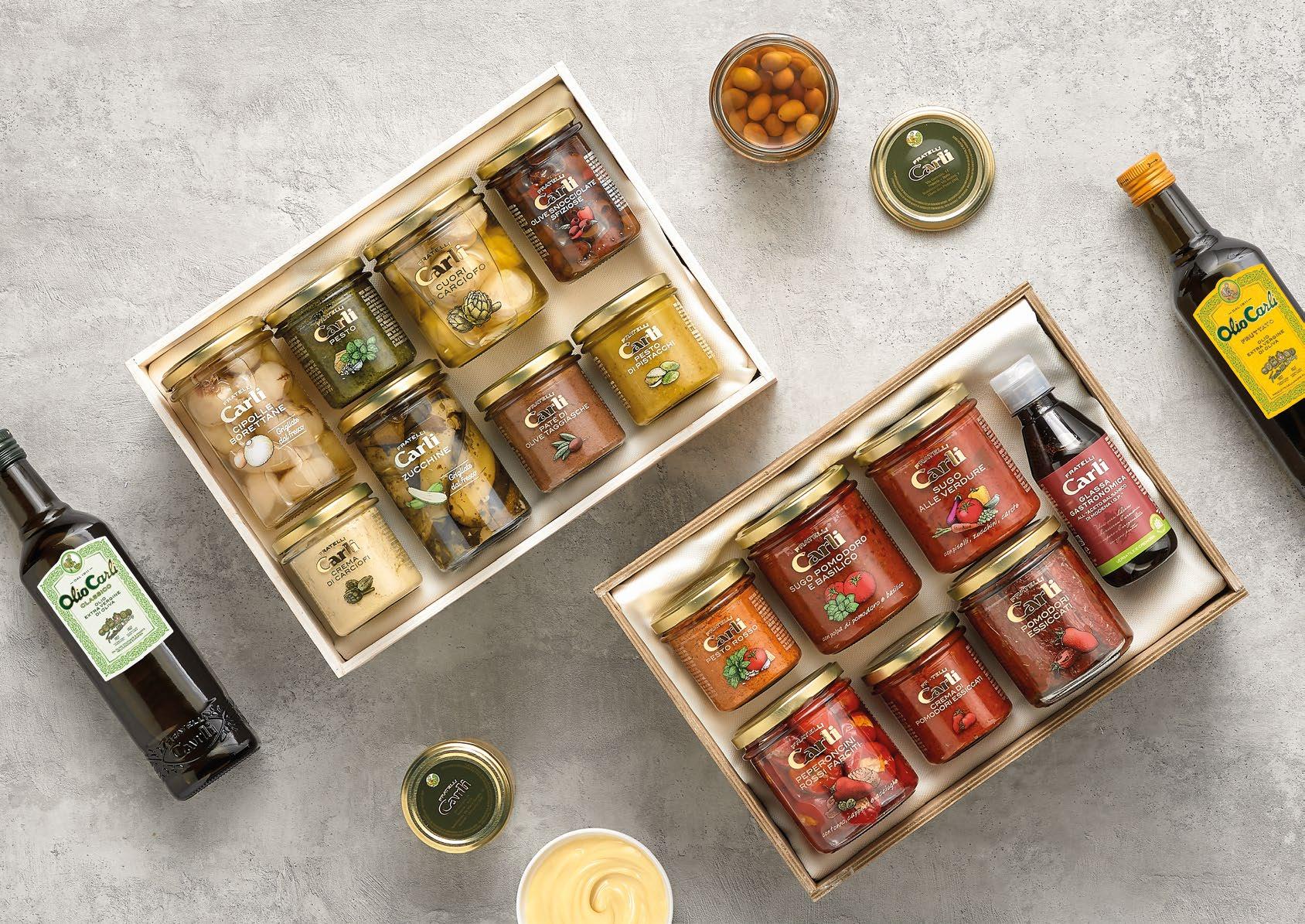
Many Fratelli Carli specialties are produced at the facility located in Gazzelli, a small town set amid the olive groves of the hinterland of Imperia. This facility also defines the quality standards the company develops together with its external suppliers, factoring in the selection of prime raw materials and an ability to seamlessly blend industrial practices with artisanship. The Gazzelli plant and a network of traditional local growers produce a comprehensive range of specialties linked to olive oil and the genuine “pleasures of the table” so typical of Italian households
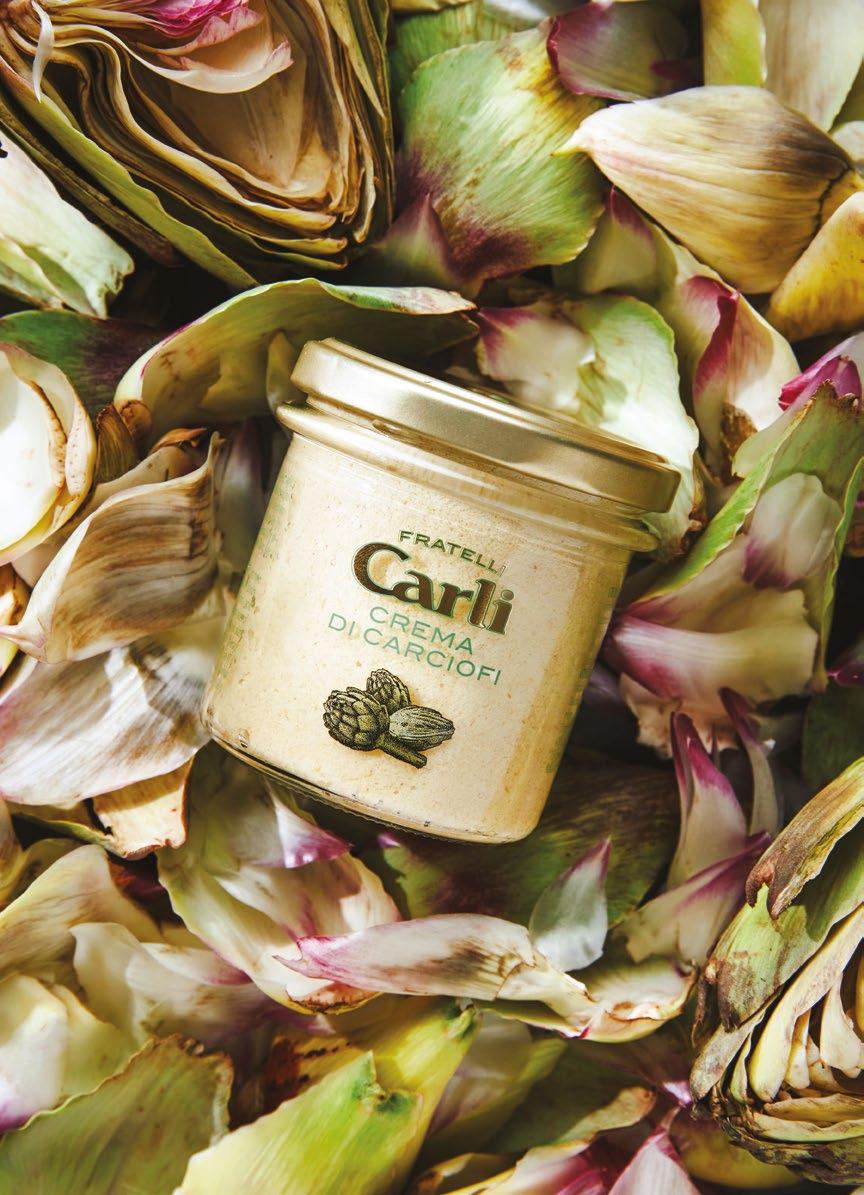
Moving on to accompanying our oil with the specialties and cuisine of Liguria and the Mediterranean was a natural step forward, driven by a desire to share our passion with our customers.


ETHICS AND TRANSPARENCY
The governance system of Fratelli Carli S.p.A. S.B. is based on a set of rules, practices and processes underpinning and ensuring transparency, efficiency and accountability.
The governance system of Fratelli Carli S.p.A. is based on a set of rules, practices and processes underpinning and ensuring transparency, efficiency and accountability
Within the ambit of accountability, governance at Fratelli Carli ensures a work environment conducive to our constant efforts to combat corruption, and underscores the value of legality.
The most senior governance body, appointed by the Shareholders’ Meeting, is the Board of Directors.
The Board of Directors, made up of one woman and four men, has a key role in setting strategies and organizational coordination Two members are in the 30-50 year age range, and the others are more senior. Since 2019 there have been no changes to the composition of the Board of Directors of Fratelli Carli.
The members of the Board of Directors are endowed with all the skills and knowledge necessary to identify and manage sustainabilityrelated issues and impacts within the scope of their management. They are supported by both the Sustainability Committee (CO.SO.) and the Management Committee, with which they actively cooperate to guarantee sustainable management of the company.
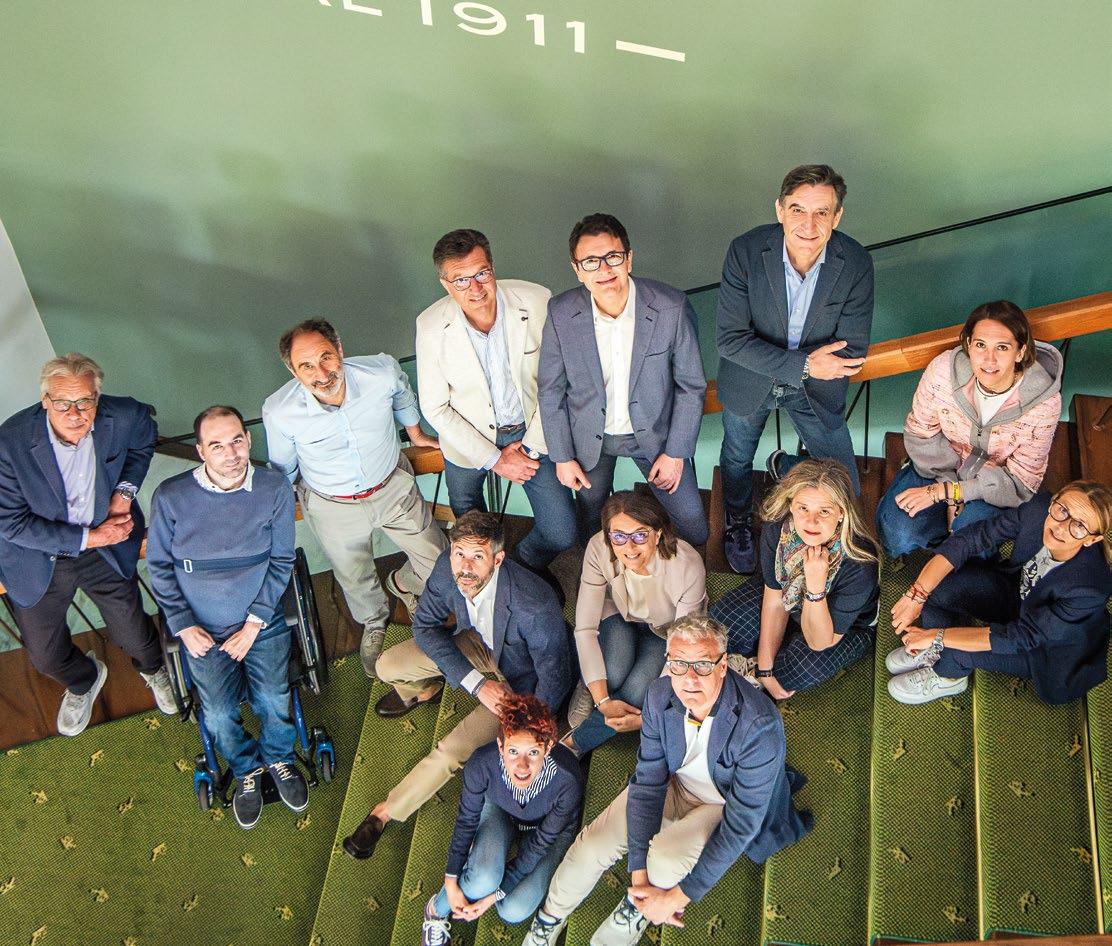
The Sustainability Committee is the body entrusted by the Board of Directors with the management of sustainable innovation issues. It was set up in 2013 to propose and advise on possible goals and actions to promote sustainability. The Committee, which includes representatives of all the corporate functions and is chaired by a member of the BoD, coordinates and guides the efforts of the company to work toward a new social and developmental model.
The Management Committee is responsible for managing the organization’s impact on the economy, the environment and people. It is composed of top management figures of the company, and thus offers a global vision of the organization, providing a comprehensive evaluation of the matters submitted to it for attention, considering how they are interconnected and their implications at organizational level.
With regard to remuneration, the Board of Directors administers a budget set by the Shareholders’ Meeting. The distribution of the budget is defined by the BoD, depending on the positions of the members. For the executive members, remuneration is made up of both fixed and variable elements.

No entry bonus is envisaged, and payment of severance indemnity is complied with. There are no specific contract clauses regarding sustainability performance, but pension benefits and remuneration policies are contemplated, which, although not specifically coded as such, are linked to the achievement of the corporate objectives. The procedure for determining remuneration is updated periodically.
The promotion of responsible conduct within the company is based on two main elements: sustainability and the articles of association. The articles of association make up the key document that guides the company’s operations, setting out the efforts and objectives designed to ensure responsible management. Management of issues regarding the pillars of sustainability and the articles of association is entrusted to the pertinent functions in the company.
It is the task of these functions to promptly collect and manage any comments made and issues raised by the stakeholders, assessing whether they are effectively valid, and the magnitude and urgency of any such issues.
This is followed by an assessment of appropriate remedial action to mitigate and solve the issue.
This approach makes it possible to maintain an open dialogue with stakeholders, and to act swiftly to tackle any issues raised.
At 31 December 2023 no conflicts of interest have been reported. Some directors are members of other Boards of Directors: according to the Articles of Association, service on the Board of other companies does not breach the principle of competition.
A whistleblowing channel was set up during the first half of 2023, in compliance with the current regulations, in order to ensure significant issues can be reported safely and confidentially. This system allows employees and other interested parties to report critical issues anonymously, so they are protected.
This allows the company to act promptly on the issues reported, guaranteeing transparency and the responsible management of serious issues. Significant critical issues are promptly reported to the company’s top governance body.
In short, the company undertakes to promote responsible conduct, through the commitments set out in the articles of association and in the pillars, and thanks to the tools available to its customers, employees and stakeholders.

Below are the business associations the company belongs to:

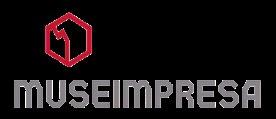


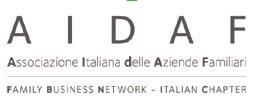
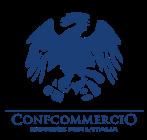
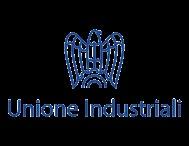
In the three-year reporting period, there were no significant instances of failure to comply with laws and regulations.
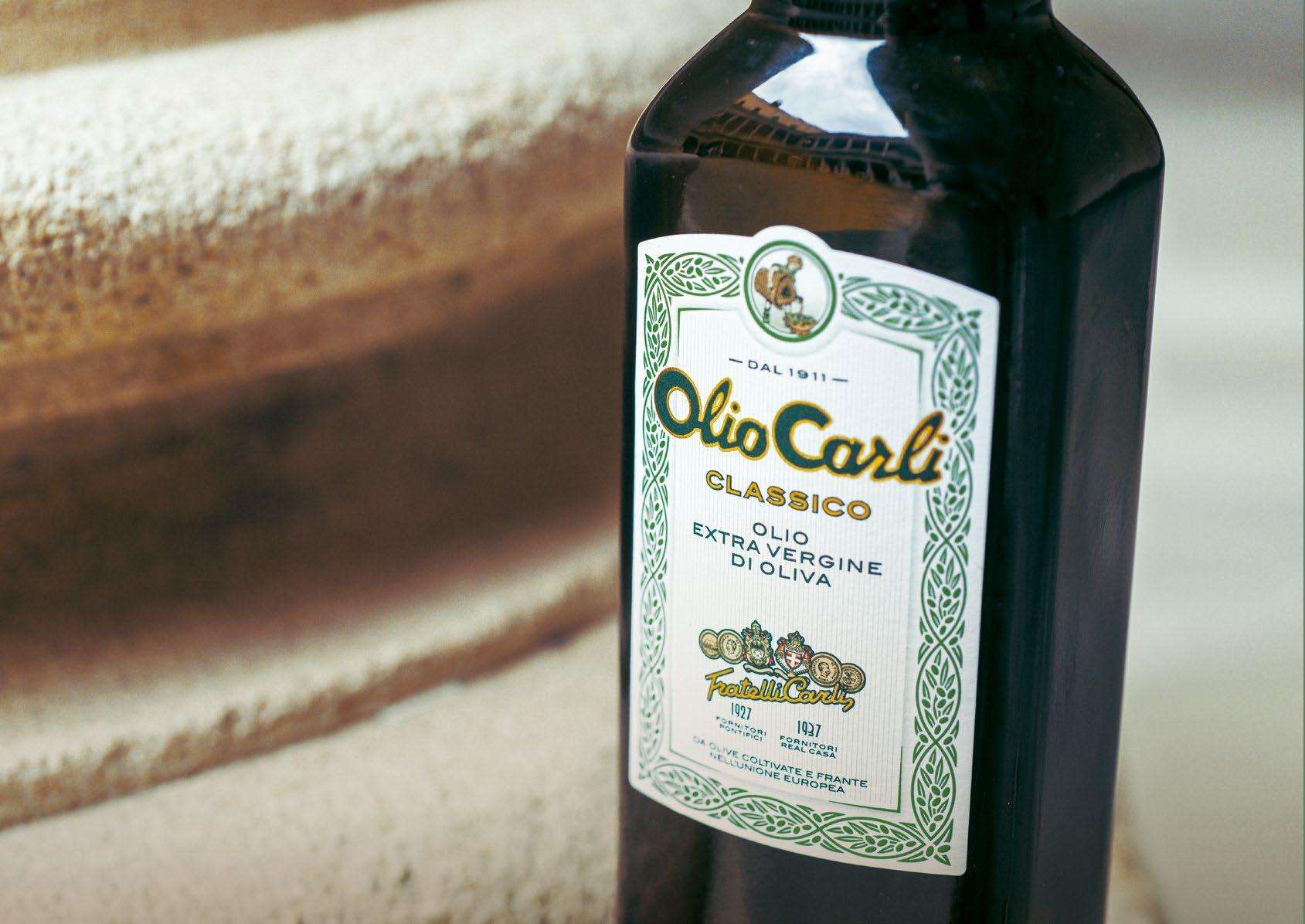
OUR RESPONSIBLE PROGRESS: TRADITION, EXCELLENCE, ENVIRONMENT
The common good means pursuing one or more positive effects, and/ or reducing negative impacts on individuals, communities, the local area and the environment, cultural and social assets and activities, entities and associations, and other stakeholders.
The certification procedure entails a rigorous B Impact Assessment that evaluates the organization’s social and environmental impact. Certification requires a minimum score of 80; Fratelli Carli scored 90 in 2014, 97 in 2016 and 98.3 in 2019.
As part of the certification renewal process, which will be completed during 2024, Fratelli Carli underwent the B Impact Assessment this year.
In addition, from 2016 to 2021, Fratelli Carli was acknowledged as one of the best B Corps in the world in terms of its actions to safeguard the environment (in the class of companies with more than 250 employees), as a Best For The World – Environment company.
Following impact assessment, Fratelli Carli SpA scored a total of 98.3. The average score for participating companies currently stands at 50.9.
B Corp Certified
In 2014, Fratelli Carli S.p.A. S.B was the first Italian manufacturing company to be certified as a Benefit Corporation1, with the aim of building a better future for people and the planet. Being a B Corp means seeking not only to be the best company in the world but also the best company for the world.
“B Corporation Certification” is granted on license by B Lab, a private non-profit entity, to businesses, such as ours, that have passed its B Impact Assessment (“BIA”) and therefore meet B Lab requisites in terms of social and environmental performance, accountability and transparency.
B Lab is not a conformity assessment body pursuant to Regulation (EU) no. 765/2008, or a standardization body pursuant to Regulation (EU) no. 1025/2012 , and that the BIA is independent from harmonized standards, and is not ratified by public institutions.
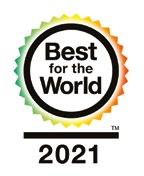
Score required for B Corp certification 80
50.9
Average score of companies
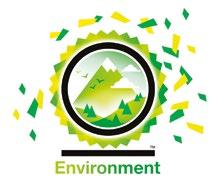
B Corporations (B Corps) are companies that voluntarily abide by rigorous social and environmental standards, without sacrificing “marketplace presence”, but with a keen awareness of their responsibility toward society and the planet.
These companies see sustainability as a fundamental part of their work and the sole path toward future opportunities.
In December 2019, Fratelli Carli chose to adopt the legal form of a “Società Benefit” (Benefit Corporation) according to Italian law, including in its Articles of Association the commitment to pursue the common good as well as profit. The common good means pursuing one or more positive effects, and/or reducing negative impacts on individuals, communities, the local area and the environment. Including this clear commitment in the Articles of Association means making it an integral part of the company, however it may change and evolve.
Benefit Corporations (BCs) are "an evolution of the very concept of a company2 that with its legal status is committed to the achievement of
Through the B Corp framework, companies undertake to create value for both their shareholders and all stakeholders. The fundamental principle of the B Corporations is interdependence, i.e. an awareness that we all depend on each other and therefore are all accountable to all stakeholders and to future generations. B Corps are key players in a world capable of creating the right balance between consumption, well-being, wealth creation, and respect for people and the ecosystem.
B Impact Assessment (BIA) is the rigorous B Corp certification control model. It enables companies to gauge their economic, environmental and social impacts. If they score more than 80 points, on a scale of 0 to 200, they can be B Corp Certified
a dual purpose: the pursuit of profit and of social and environmental responsibility." The legal form of “Società di Benefit” was introduced in 2016 in Italy, which became the first country in Europe and in the world - outside the United Statesto introduce this legal form. This has enabled companies to align their corporate mission with the pursuit of long-term shared value. Directors and management are in charge of ensuring that the business is conducted with the aim of generating a positive impact and in pursuit of the common good purposes declared in the Articles of Association.
2 See here for more information: hiip://www.societabenefit.net/cosa-sono-le-societa-benefit/.
+8,600 B Corps worldwide
+3,600 Benefit Corporations in Italy
Fratelli Carli’s longstanding commitment takes the form of the five Pillars of Responsible Progress, listing the company’s fields of engagement.
These pillars are the cornerstones of Fratelli Carli’s actions. On becoming a Benefit Corporation, these pillars were officially incorporated into the Articles of Association, setting forth the common good purposes the company seeks to pursue.
Providing customers with outstanding products and services, responding to their needs in a timely manner and with due care and attention.
Motivating people who work with Fratelli Carli and contributing to its success on a daily basis, thanks to a relationship inspired by respect for others and acknowledgement of diversity as a value, while prioritizing the safety and rights of employees and collaborators.
Furthering widespread well-being, in full awareness of the social role of companies and their responsibilities as a part of society at large.
Analyzing and enhancing sustainability at each stage of the life cycle of Fratelli Carli products: from cultivation of the raw materials through to consumption.
Increasing the use of eco-friendly, recyclable, biodegradable and renewable materials, especially by decreasing the amount of packaging used for products.
Ensuring optimal food safety, quality, genuine flavor and natural goodness for Fratelli Carli products.
Sharing the values and goals of Fratelli Carli with collaborators and suppliers, to help create a new model for development.
Promoting sustainable agricultural practices that respect the ecosystem and landscape heritage.
Turning to best account our local assets and economic and industrial fabric, with particular attention paid to small farmers.
Cutting back constantly on the use of nonrenewable natural resources, with particular reference to energy sources
Reducing the amount of waste generated by production and ensuring correct disposal of recyclable waste.
Fostering a widespread culture of sustainability and a new model of a regenerating society, both inside and outside the company.
Promoting good practices for a correct dietary culture aligned with Mediterranean tradition and inspired by health and wellbeing.
Our business practices are guided by and oriented toward the common good purposes of the company, which annually plans its impact goals, the actions necessary to gradually achieve them and the criteria for assessing the impact generated.
By pursuing the common good, Fratelli Carli also undertakes to work in order to achieve the Sustainable Development Goals (SDGs) approved by the United Nations in 2015. Specifically, the common good purposes indicated in the Articles of Association aim toward attaining the following SDGs:
QUESTIONS ANSWERS 21/22
QUESTIONS ANSWERS 23/23
Through its SDG Action Manager, able to gauge the company’s impact by collating B Lab’s B Impact Assessment guidelines and the ten principles of the United Nation’s Global Compact, Fratelli Carli has calculated its impact on the reference SDGs. By these means, the noteworthy corporate actions are flagged and developed, also via benchmarking, conducive to ongoing improvement of the positive impacts on various Sustainable Development Goals.
The assessment has also highlighted the positive impact of Fratelli Carli on all the SDGs, and not only the reference goals. This is an important indication of the commitment and sensitivity demonstrated by the company in its everyday operations.
QUESTIONS ANSWERS 34/34
SDG 3
Good health & well-being
The assessment considers how the company can contribute to everyone’s health and well-being, for example by providing occupational health cover and safety programs for all operators.
The assessment considers how the company can take steps to provide clean and affordable energy for all, for example through the use of low-impact renewable energy, or by improving energy efficiency.
The assessment considers how the company can take steps to deliver decent work and economic growth, such as paying a living wage and ensuring fair development conditions for workers in its operations and supply chain.
Responsible consumption and production
The assessment considers what the company can do to keep production and consumption at responsible levels, such as adopting the principles of the circular economy and conducting assessments on the impact of suppliers on the consumption of resources.
SDG 14
below water
The assessment considers how the company can conserve and use the oceans, seas and marine resources sustainably, e.g. by conducting an assessment of the company's impact on the health of the oceans.
The assessment considers how the company can protect, restore and promote sustainable use of ecosystems, with actions such as sustainable land use practices, and environmental management screening.

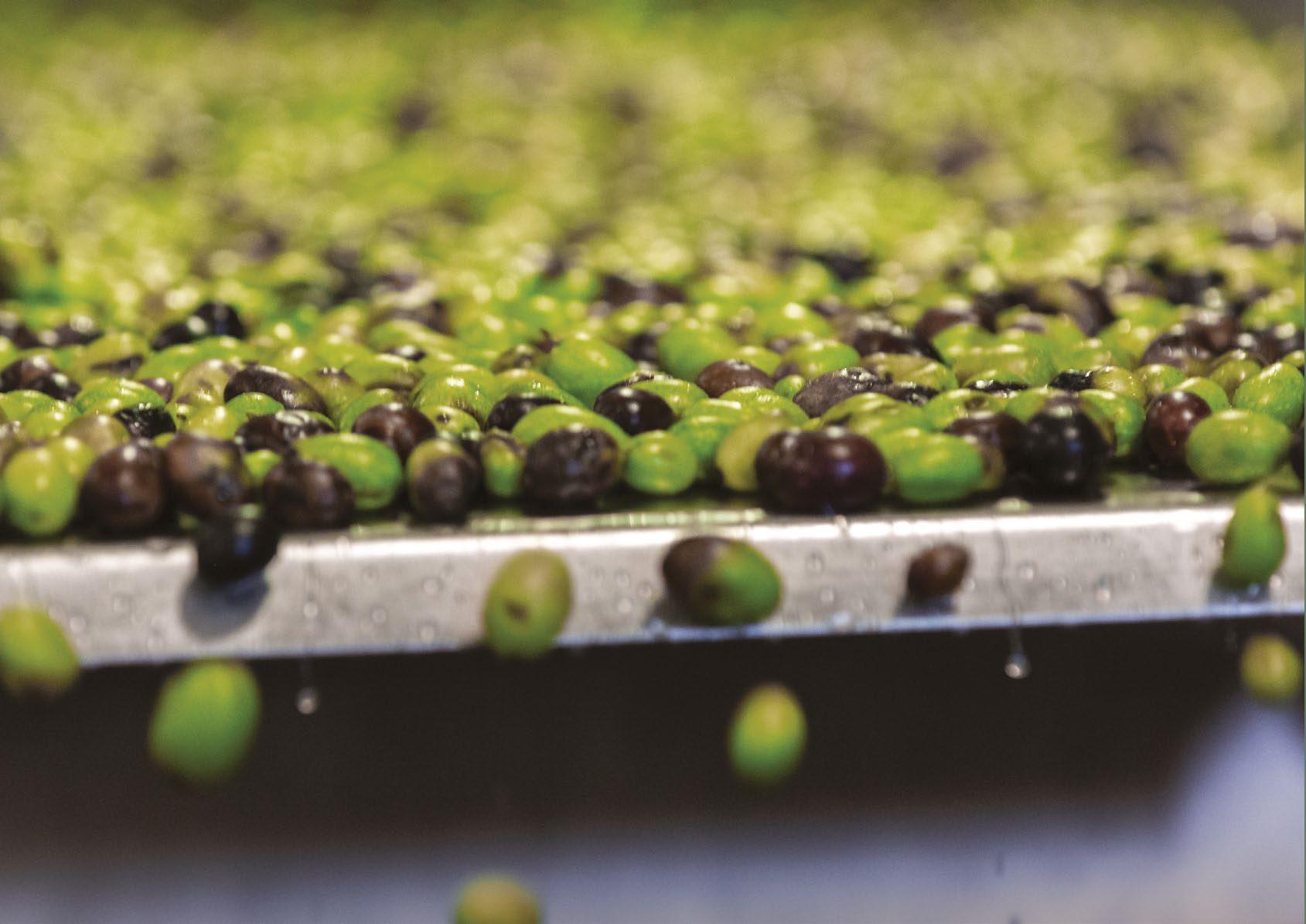
MATERIALITY ASSESSMENT: THE KEY ISSUES
The procedure for materiality analysis is deployed as a starting point for reporting on sustainability as transparently, clearly and effectively as possible.
In continuity with 2021 and 2022, Fratelli Carli also conducted a materiality analysis for 2023, as a first step to identifying the sustainability issues of greatest relevance for the company, in economic, environmental and social terms. The analysis was carried out using the new methodology introduced by the Global Reporting Initiative Standards (GRI 2021).
This new methodological approach is based on the concept of impact, defined as the effect an organization has (actual impact) or could have (potential impact) on the economy, environment, people and human rights. In addition, impacts may be positive if they contribute to the sustainable progress of people, local communities and the environment, or negative if they cause damage to them.

The materiality analysis is therefore used as a starting point for the development of sustainability reporting that is as transparent, clear and effective as possible, taking into account the entire value chain of Fratelli Carli, and thus considering not only the core business activities, but also everything that occurs upstream and downstream from the company.
With a view to identifying the significant sustainability issues, a preliminary analysis was conducted, as in previous years, to illustrate the context Fratelli Carli operates in. This analysis regarded a number of sources, both internal and external, aimed at understanding the sustainability trends and comparing them with the performance of companies operating in sectors similar to Fratelli Carli’s business.
The new methodological approach introduced by the GRI Standards 2021 is based on the concept of impact, defined as the effect an organization has or could have on the economy, environment, people and human rights.
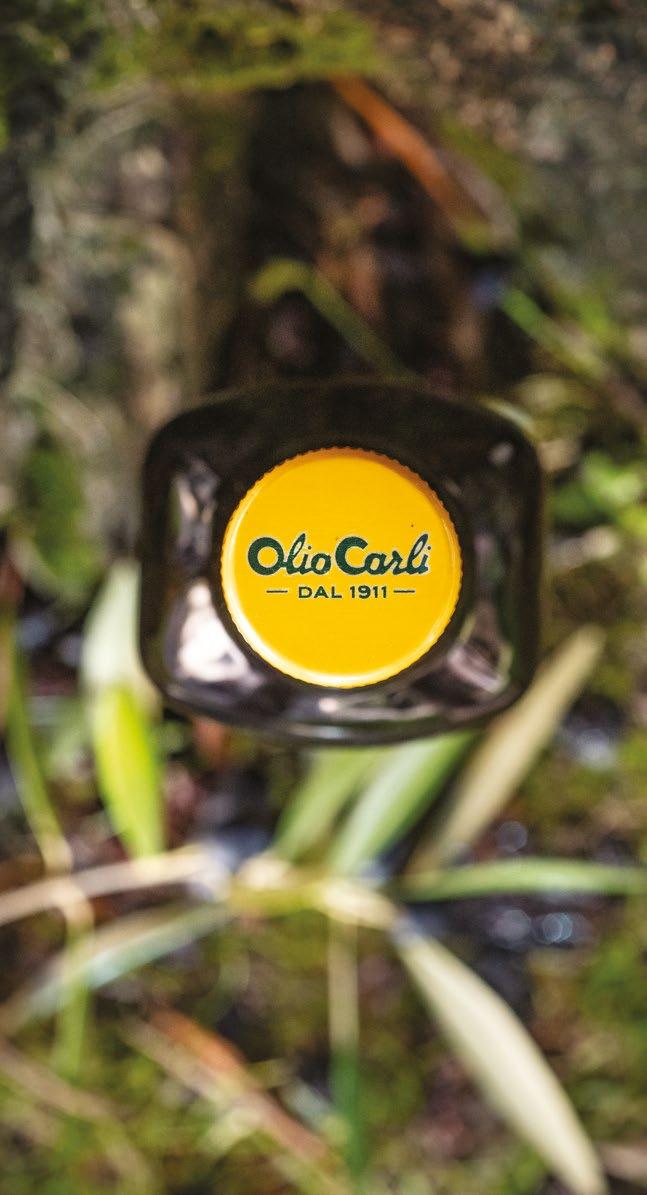
Lastly, a mean analysis was conducted again to identify the external pressures coming from the main communication channels. Based on the information collected and taking account of all the phases that make up the value chain, the actual or potential impacts generated by Fratelli Carli were identified: the new analysis highlighted a number of additional issues compared to the previous year, which were taken into consideration for the subsequent phase of assessment of the significance of each impact.
The impacts were then assessed, taking into consideration:
• The severity of the impact, defined in turn by the scope (how frequently and widely it occurs along the value chain), the scale (i.e. the severity of the impact that occurs), and the irremediable nature (the possibility of limiting the damage caused and restoring the situation prior to the occurrence of the impact),
• and the likelihood of it happening.
The prioritization of the impacts according to the methodology described here above therefore made it possible to identify the impacts that are most significant and therefore worthy of attention: in addition to the 2022 issues, the analysis confirmed a further two new issues that are the focal points of the company’s actions.
EMPLOYEES’ SAFETY AND RIGHTS
Damage to the health and safety of workers caused by failure to comply with regulatory obligations
Discrimination and breaches of human rights due to inadequate safeguarding practices.
PERSONAL WELL-BEING AND DEVELOPMENT
Development of employees’ skills through training activities
DIVERSITY AND EQUAL OPPORTUNITIES
Failure to respect diversity and ensure equal opportunities due to inadequate D&I practices
CUSTOMER SATISFACTION AND SAFETY
Safeguarding customer satisfaction levels with a dedicated assistance service
Protecting customers through transparent communication
FOOD SAFETY
Protecting customers by developing healthy, wholesome products
PRODUCT QUALITY AND EXCELLENCE
Development and production of quality products thanks to the use of excellent raw materials
SUSTAINABLE MATERIALS AND PRODUCT ECO-DESIGN
Development of products with sustainable packaging
RESPONSIBLE SUPPLY CHAIN MANAGEMENT
Development of a network of trusted suppliers, by monitoring and controlling the supply chain
ENHANCING LOCAL COMMUNITIES
Creation of economic and cultural value for local communities
CLIMATE ACTION
Contribution to climate change due to greenhouse gas emissions
REDUCING THE IMPACTS OF PRODUCTION
Damage caused to the environment by incorrect disposal of waste produced
Impoverishment of water resources due to inefficient use of sources of water
Reducing waste
Damage to biodiversity
ENCOURAGING HEALTHY LIFESTYLES BY PROMOTING THE MEDITERRANEAN DIET
Promoting a healthy lifestyle by developing recipes belonging to the Italian tradition
ETHICAL BUSINESS CONDUCT
Consequences of unfair business practices on the social and economic system
SAFEGUARDING PRIVACY
Breach of privacy caused by inadequate IT control systems
The table summarizes the material issues and the impacts associated with them. In addition, a brief description is provided for each impact.
3
SUBJECT MATERIAL ISSUE IMPACT
EMPLOYEES’ SAFETY AND RIGHTS
Damage to the health and safety of workers caused by failure to comply with regulatory obligations
Negative Potential
Discrimination and breaches of human rights due to inadequate safeguarding practices
Negative Potential
Description: damage to the health and safety of workers caused by failure to comply with regulatory obligations.
Countermeasures adopted: Fratelli Carli has always implemented measures for the management and safeguarding of workers’ health and safety. The company has also implemented an Integrated Environmental and Occupational Health and Safety Management System for even closer control over this question3
Description: Failure to protect and safeguard human rights in direct and indirect activities could lead to cases of discrimination among employees and along the supply chain.
Countermeasures adopted: Fratelli Carli undertakes to comply with international measures regarding human rights and discrimination3
PERSONAL WELL-BEING AND DEVELOPMENT
Development of employees’ skills through training activities
DIVERSITY AND EQUAL OPPORTUNITIES
Failure to respect diversity and ensure equal opportunities due to inadequate D&I practices
Negative Potential
Description: to guarantee employees’ professional growth, it is essential to promote the development of specific skills, offering the necessary resources and training. Fratelli Carli provides valuable, customized training for its employees.
Description: the absence of practices for the protection of diversity and the promotion of inclusion among employees could have a negative impact on respect for human rights, on well-being in the company and on the ability to attract and retain talent.
Countermeasures adopted: respect for diversity and guaranteeing equal opportunities is one of the founding principles of Fratelli Carli. The company undertakes to guarantee gender equality and an inclusive workplace that fully respects human rights3
CUSTOMER SATISFACTION AND SAFETY
Safeguarding customer satisfaction levels with a dedicated assistance service
TYPE OF IMPACT
DESCRIPTION OF IMPACT AND COUNTERMEASURES ADOPTED
Description: customer satisfaction is one of the main objectives of Fratelli Carli. The high quality of the services offered, together with the various channels provided for customers to interact with the company, offer a brand experience able to satisfy all kinds of needs.
Materials and products
FOOD SAFETY
PRODUCT QUALITY AND EXCELLENCE
Protecting consumers by developing healthy, wholesome products
Development and production of quality products thanks to the use of excellent raw materials
SUSTAINABILITY OF MATERIALS AND PRODUCT ECO-DESIGN
Development of products with sustainable packaging
Description: Fratelli Carli prioritizes the protection of its customers’ health and safety, by constantly and carefully monitoring aspects of product safety and quality.
Description: Fratelli Carli uses only the finest-quality raw materials for its products. Control over the entire supply chain and a lasting, personal relationship with suppliers allows for a careful selection of ingredients.
Description: Fratelli Carli undertakes to use increasingly biodegradable, renewable and recyclable packaging.
RESPONSIBLE SUPPLY CHAIN MANAGEMENT
Supply chain
Development of a network of trusted suppliers, by monitoring and controlling the supply chain
ENHANCING LOCAL COMMUNITIES
Creation of economic and cultural value for local communities
Description: the company has always involved its suppliers in its pathway toward Responsible Progress, also by means of the Sustainability Codes created along with the various Districts in the supply chain, to offer increasingly sustainable products right along the value chain.
Description: Fratelli Carli provides direct and indirect support to the communities and the areas it operates in.
CLIMATE ACTION
TYPE OF IMPACT
Contribution to climate change due to greenhouse gas emissions Negative
DESCRIPTION OF IMPACT AND COUNTERMEASURES ADOPTED
Description: the activities carried out by Fratelli Carli and in its value chain generate CO2 emissions.
Countermeasures adopted: Fratelli Carli undertakes to use energy from renewable sources in all its premises, Emporiums and warehouses. In addition, the company has obtained Carbon Neutrality certification for its entire delivery logistics chain in Italy4
REDUCING THE IMPACTS OF PRODUCTION
Impoverishment of water resources due to inefficient use of sources of water
Damage caused to the environment by incorrect disposal of waste produced
Damage to biodiversity
4 For further information on the countermeasures adopted by the company, see Chapter 5 Energy and Resources.
Description: efficient management of transport and the adoption of suitable product conservation practices during the logistics phases enable a reduction of possible waste at the various stages of the value chain.
Description: inefficient use of water resources could lead to a deterioration of the resources, to the detriment of local communities and ecosystems.
Countermeasures adopted: The company monitors its water consumption constantly. Management of water resources is also supervised by Fratelli Carli’s suppliers4.
Description: if not disposed of/recovered correctly, waste could cause negative impacts on both ecosystems and local communities.
Countermeasures adopted: waste management and proper waste delivery is governed by dedicated internal procedures, in full compliance with the regulations in force4
Description: the activities involved in the production of Fratelli Carli products, such as farming and fishing, pose a threat to biodiversity as a result of air pollution, deforestation, soil erosion and the conversion of natural ecosystems.
Countermeasures adopted: choosing suppliers carefully and and involving them in the value chain through activities focused on ESG issues helps Fratelli Carli to reduce its impact in this area.
Mediterranean culture and tradition
ENCOURAGING HEALTHY LIFESTYLES BY PROMOTING THE MEDITERRANEAN DIET
TYPE OF IMPACT
Promoting a healthy lifestyle by developing recipes belonging to the Italian tradition
Positive Actual
DESCRIPTION OF IMPACT AND COUNTERMEASURES ADOPTED VALUE CHAIN
Description: Fratelli Carli undertakes to promote top-quality traditional Italian food products rooted in the Mediterranean culture and tradition.
ETHICAL BUSINESS CONDUCT
Ethical business conduct
Consequences of unfair business practices on the social and economic system
Negative Potential
Description: the absence of adequate checks along the value chain could expose the company to the risk of unfair business practices.
Countermeasures adopted: Fratelli Carli’s governance system is founded on the principles of accountability, ethics and transparency. This is why the company undertakes to implement a series of actions aimed at ensuring constant control5
Direct Downstream
SAFEGUARDING PRIVACY
Breach of privacy caused by inadequate IT control systems
Negative Potential
Description: data breach episodes could have negative consequences in terms of the violation of the personal data of employees and consumers.
Countermeasures adopted: management of privacy, security and protection when processing personal data is a priority concern in all fields of corporate activity. Fratelli Carli has ISO 27001 certification regarding existing and prospective customer data5 Upstream Direct Downstream
5 For further information on the countermeasures adopted by the company, see the Paragraph “Accountability, Ethics and Transparency”.
Fratelli Carli believes that on-going, active dialogue with its stakeholders is fundamental for maintaining relations based on the principles of collaboration, honorability and mutual respect. On a dayto-day basis, the company is committed to reaching out to all stakeholders, seeking to fulfil their expectations and generate value throughout the value chain.
The company has identified its key stakeholders with a desk analysis, from which the following main categories emerged: local communities, trade unions, regulatory bodies, sector and B Corp organizations, suppliers, customers, trade associations and employees. Upstream and downstream from the company, the stakeholders involved are mainly suppliers, farmers, logistics operators, self-employed transporters and customers.
A close relationship with the company’s stakeholders is essential for product quality. Fratelli Carli and its stakeholders have therefore developed a solid, enduring relationship of collaboration and consultation.
Fratelli Carli has always sought stakeholder involvement through a variety of communication channels and modes of engagement.
The following table outlines the key elements:
Employees Presentations and training on sustainability issues
Communications from top management Communications posted on the corporate Intranet notice board
Customers Institutional website
Handling of complaints
Customer Care
Communication campaigns
Factory visits
Suppliers Institutional website
Presentations and questionnaires on sustainability issues
Meetings and joint events regarding the Code
Regulatory bodies Institutional website
Certifications
Trade unions
Local communities
Trade associations
Sector and B-Corp organizations
Contractual negotiations
Participation in meetings/events
Institutional website
External communication
Press releases
Collaboration with external bodies
Institutional website
Participation in meetings/events
Institutional website
Participation in B-Corp community events
Specific initiatives
Every year, the company reports on wealth creation and distribution to its stakeholders. It illustrates the impact of the company’s economic and financial performance on stakeholders and the local community.
The value generated by Fratelli Carli is largely redistributed locally, and mainly within Italy, by creating employment and choosing local suppliers.
n 2023, the economic value directly generated stood at € 138 million, down 15% compared to the previous year. The economic value retained stood at around € 5 million, an increase compared to the previous year.
The following graph shows the economic value distributed (€132.5 million): specifically, 84% is accounted for by operating costs and 13% by personnel costs (salaries and benefits), while the rest is accounted for by investments in the community (sponsorships), and payments to capital providers and the Public Administration.
Economic value directly generated in 2023
The actions we will be presenting below illustrate the real significance and commitment of Fratelli Carli to pursuing its common good purposes as a Benefit Corporation.

Patrizia Sacco Sustainability & B-Corp Coordinator
Viewing matters from the long-term angle means focusing largely on our ideals, above all to modify those aspects that cannot be tackled as short-term issues. We therefore chose not to limit ourselves to an account of our performance in these fields, but embarked instead on a three-year plan to sustain our Pillars of Sustainability and orient them toward specific ends conducive to the common good.
For Fratelli Carli, adopting a long-term vision means looking to the future, starting out from our roots and the solid foundations patiently constructed over the years. This is why the company has made an effective commitment to invest in continually enhancing our business practices. This commitment has allowed us both to become one of the most attentive Italian companies with regard to ESG (Environment, Social, Governance) issues and to receive widespread recognition also within the B Corp community, as we carefully and publicly monitor the progress we are making with regard to all prospective activities.
The strategy developed by Fratelli Carli for responsible business development is implemented through the definition of a medium-term Sustainability Plan, which includes both a report on performance and a plan setting forth the company’s commitment to sustainability over the next three years.
The plan is based on the Pillars of Sustainability, which clearly outline the common good purposes, as well as the impact generated on the material issues and on the pertinent sustainable Development Goals (SDG).
The strategy developed by Fratelli Carli for responsible business development is implemented through the definition of a medium-term Sustainability Plan, with a plan setting forth the company’s commitment over the next three years.
This solid, shared work base highlights the importance and depth of the sustainability issues in each area of the company’s operations.
The Sustainability Committee has confirmed its effective guiding role in directing the company's efforts regarding ESG issues and in constructing the medium-term Sustainability Plan in a shared and participatory manner.
The actions we will be illustrating below are indicative of the true significance of Fratelli Carli’s efforts to pursue its common good purposes as a Benefit Corporation.
The plan is based on the Pillars of Sustainability, which clearly outline the common good purposes, as well as the impact generated on the material issues and on the pertinent Sustainable Development Goals (SDG).


Customer satisfaction and safety
Product quality and excellence
Sustainable materials and product eco-design
Food safety
Promoting occupational health.
Implementing a new welfare plan for employees.
Increasing the hours dedicated to training, above all sustainability training.
Facilitating equal opportunities at all corporate levels
Developing customer care to make it a special, interactive experience for customers
Maintaining the highest standards of customer care.
Constantly implementing the services offered and keeping contact channels with the company open for all customers, in step with technological evolution.
Contributing to projects designed to help the disadvantaged, facilitating access to water, treatment and research.
Meeting the needs of local communities, also by donating products.
Continuing to offer new Mediterranean food specialties, lovingly prepared in the traditional way, using just a few simple, top-quality ingredients.
Increasing to 55% the amount of product ranges analyzed using the Life Cycle Sustainability Assessment (LCSA), which quantifies their environmental, social and economic impact.
Carefully and constantly monitoring the nutritional, safety and quality aspects of our products, to offer our customers top levels of excellence.
Constantly renewing the primary and secondary packaging of our products and free gifts, with a view to continual improvement in terms of sustainability.
Increasing the percentage of materials, raw materials and food specialties with sustainability certification and/or produced by B Corp certified companies or Benefit Corporations.
Responsible supply chain management
Enhancing local communities
Reducing the impacts of production
• Refuse and waste management
• Water management
• Management of impacts on biodiversity
Supply chain Energy and resources
91
20232025 TARGETS
Turning the Goodness District into a Benefit District.
Opening up the Transport District to new suppliers of logistics services.
Bringing the Transport District on board the “Carbon Neutrality” project.
Working with the entire supply chain to gather all the shared sustainability KPI into the pertinent codes, using the tools established.
Increasing the percentage of major suppliers involved in the Codes and assessed according to environmental and social criteria to 55%.
20232025 TARGETS
Updating and validating Scope 1, Scope 2 and Scope 3 emissions inventories.
Defining measurable actions to mitigate the company’s impact on climate change.
Implementing and extending the scope of the new integrated safety and environmental management system.
Offsetting the environmental impact of all home deliveries to Italian customers.
Designing an Ecodrive course for our primary transport drivers.
Keeping the percentage of total waste sent for recovery above 90%.
Encouraging healthy lifestyles by promoting the Mediterranean diet
Mediterranean culture and tradition
20232025 TARGETS
Promoting the culture of olives and olive oil and the Mediterranean tradition
Spreading the culture of Sustainability
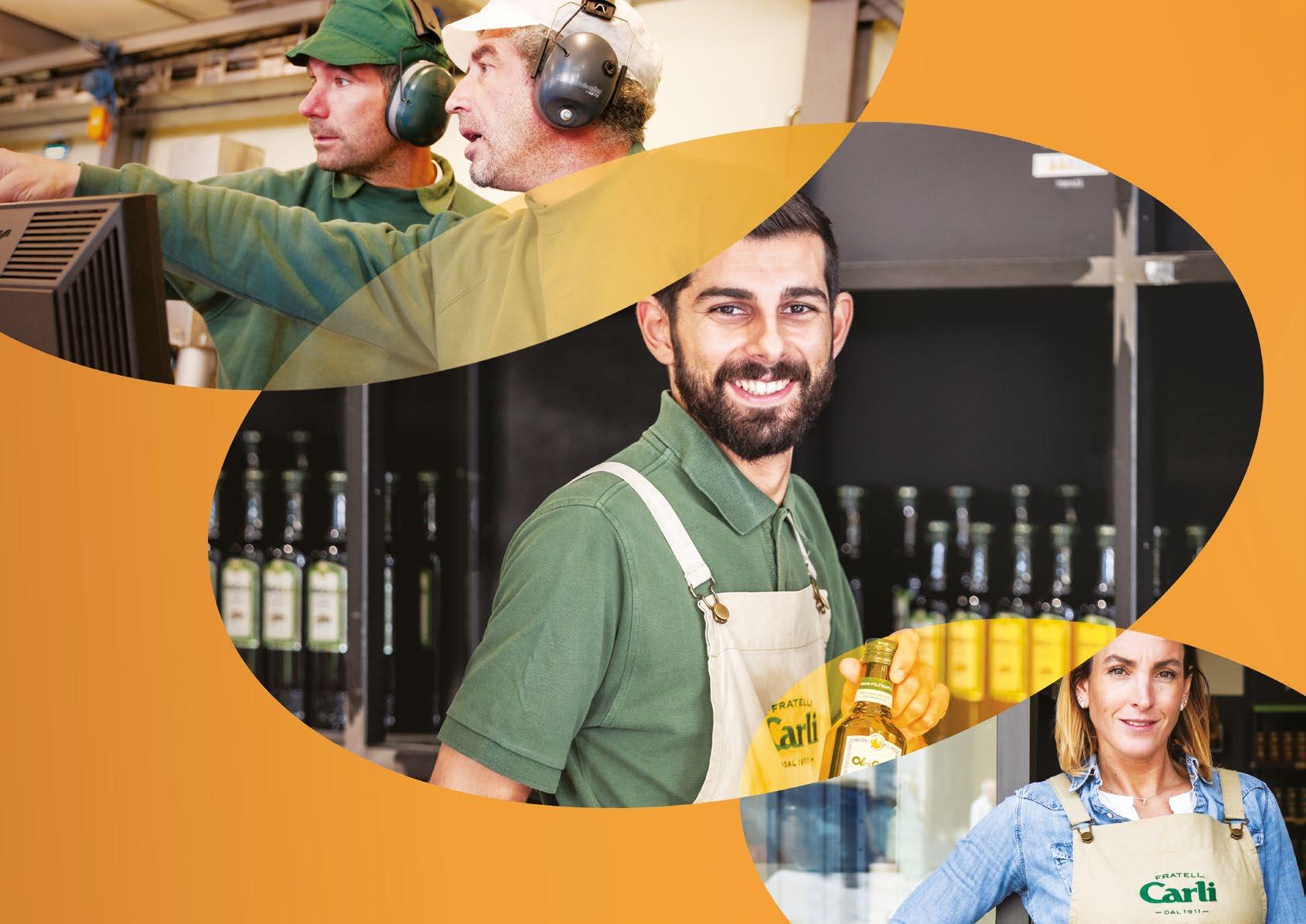
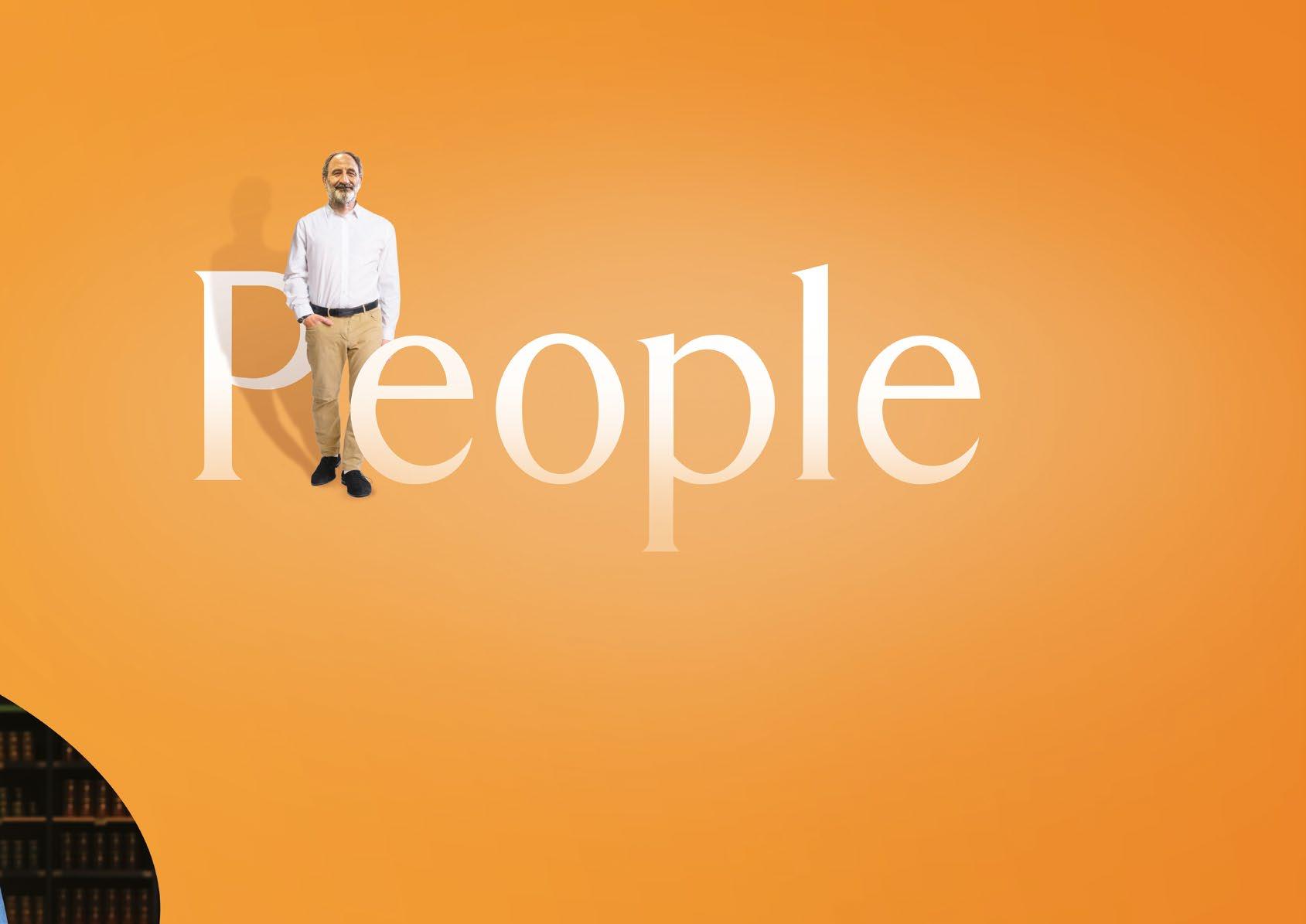
Our main desire is to become a large community of people, customers and employees, with a set of aspirations, motivations and abilities able to create value. Special people we meet and work with every day, to shape a major shared project designed to contribute to a social model founded on shared wellbeing, respect for rights and participation in community life.
• Promoting occupational health
• Implementing a new welfare plan for employees
• Increasing the hours dedicated to training, above all sustainability training
• Facilitating equal opportunities at all corporate levels
• Developing all aspects of customer care to make it a special, interactive experience for customers
• Maintaining the highest standards of service quality for customers
• Constantly implementing the services offered and keeping contact channels with the company open for all customers, in step with technological evolution
• Contributing to projects designed to help the disadvantaged, facilitating access to water, treatment and research
• Supporting the needs of local communities, also by donating products
2023 Highlights
1,100 More than hours of training dedicated to sustainability +67% the percentage of women in the company (+2% since 2021) 52% employees at 31.12.2023
378 of home deliveries of our products made with no errors or delays 99.26% hours of training at the Orders Hub to meet the needs of our customers increasingly effectively
CUSTOMERS COMMUNITIES of our employees have used our corporate welfare service 45% Almost cancer prevention examinations conducted free of charge on the company premises since 2016
2,268,000
1,700 chat-mode exchanges with customers from all countries served 9,009 female operators at our Orders Hub for Italy and Abroad 60 associations supported with donations of our products +40 tons of food products donated +9 liters of drinking water guaranteed for water projects worldwide
Fratelli Carli has always been aware that our people are the secret of our success, sharing aspirations and needs with them and keeping a constant, careful eye on their health and safety.
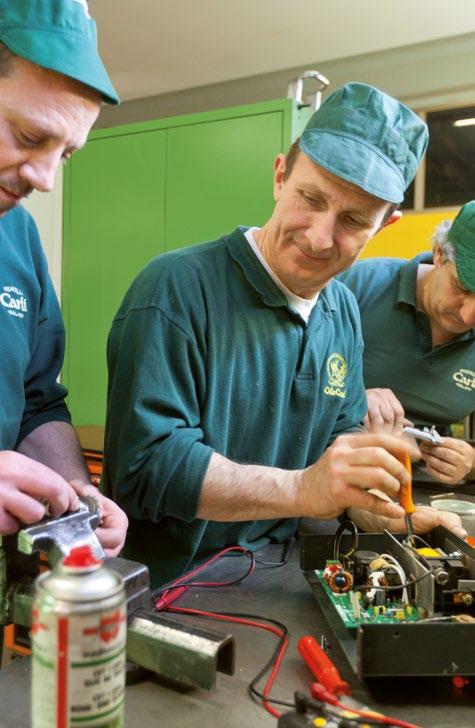
In 2023, this earned the company a place, for the second consecutive year, among the top 20 list of “Italy’s Best Employers”, drawn up by Corriere della Sera and Statista to reward those businesses with the highest level of satisfaction among their employees. Fratelli Carli was ranked third.
Thanks to on-going development and a stimulating environment, Fratelli Carli staff are renowned for their skills and their passion for sustainability. For years now, the company has thus adopted an ethical, attentive approach to human resources management, striving to strike a healthy work-life balance by offering a series of welfare benefits to its employees and protecting their health and safety.
Thanks to a rich training offer, Fratelli Carli employees have access to both bespoke courses organized based on the needs of the various functions in the company and training aimed at everyone in the company, such as sustainability training.
In order to ensure optimal personnel management by combining economic efficiency and expertise, certain HR activities, including salary operations, have been outsourced to a third party. For some time now, the company has been utilizing IT tools by means of which metrics are constantly verified and monitored.
of employees have an open-ended work contract 89.6%
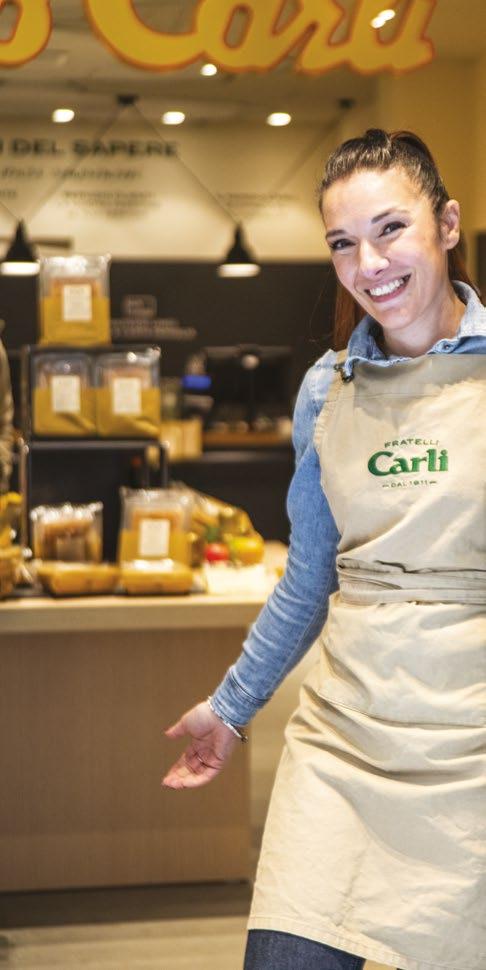
52% of employees are women (+ 2% since 2021).
This is indicative of the importance Fratelli Carli continues to place, year after year, on the presence of women in the company.
At the end of 2023, 378 people were working for Fratelli Carli, 377 of them employed directly and just one on an agency contract, fewer than in 2022. This is indicative of the importance Fratelli Carli continues to place, year after year, on the presence of women in the company.
The principles of non-discrimination, equal opportunities and equal dignity and inclusion are the cornerstones of Fratelli Carli’s approach to diversity. An analysis of the contracts of those working for Carli immediately shows the attention paid to them by the company: at 31 December 2023, in line with the previous year, 89.68% of employees were on an open-ended contract, while 66.4% were working full time, compared to 73% the previous year.
Employees by gender (2023)
The graph shows that most Fratelli Carli employees are white or blue collar workers, while managers and executives account for around 4% of the total.
Employees by professional category (2023)
The relationship between Fratelli Carli and its employees is founded on mutual, lasting trust, evident from the long time they remain with the company. Thanks to this stability, our staff have a sound skills base for handling everyday operations. It is important to note that 139 of our employees have been with us for over 20 years
Turnover rates show a trend in line with previous years. Recruitment is influenced both by seasonal work and the opening of new Emporiums, while most workers leaving the company do so because their temporary contract has expired, or because they are seasonal workers. The trend with regard to new recruitment shows a continual rise in the number of female workers in the company (+1.59% compared to 2022, +2% compared to 2021).
Turnover (rates of hires and terminations)
36% of employees have been with the company for more than 20 years
45% have used corporate welfare
For the seventh consecutive year, Fratelli Carli has constantly strived to guarantee the well-being of its staff, with the "Liberi di… Welfare" program. This plan, based on flexible benefits, offers a range of customized services to make everyday life easier for its employees and boost their spending power. Benefits include the reimbursement of expenses sustained for treatment and children’s education, assistance for non-selfsufficient family members and medical prevention and check-up systems. In addition, vouchers can be generated for medical treatments, travel and wellness centers, as well as shopping vouchers that can be used at our partner stores locally. The company undertakes to guarantee a broad, diversified range of welfare benefits, including the signing of agreements with medical and sports facilities and wellness centers in the city of Imperia. 2023 saw a rise in the use of corporate welfare, with almost 45% of our workers using the services offered, and the percentage of welfare credits converted – and therefore spent –amounted to 39%, up 3% compared to 2022. This increase is also due to the training provided regarding how the welfare system works, in order to encourage staff to use the services available.
More
than cancer screening examinations for employees conducted free of charge on the company premises since 2016
Fratelli Carli acknowledges the need to safeguard employee health and actively work toward the well-being of the local community, and for many years has been offering its employees medical examinations and tests free of charge, collaborating with associations and bodies such as FIDAS, the Imperia Province Blood Donors’ Association, and the cancer associations LILT Lega Italiana Lotta Tumori (in Sanremo) and ANT (Associazione Nazionale Tumori). Since 2016, a “Prevention Week” has been organized, during which preventive medical examinations are offered free of charge, directly in the workplace.
In 2023, the examinations were organized in collaboration with ANT Associazione Nazionale Tumori, which carried out more than 100 cancer prevention examinations free of charge for the company’s workers (in particular for the detection of melanoma and thyroid cancer).
In addition, during 2023, the company joined the national project "Workplace Health Promotion" (WHP).
This program, developed in the local area with the support of the ASL 1 Liguria Regional Health System, aims to create a role for workplaces in active health promotion, by raising awareness of the importance of prevention and of maintaining a healthy lifestyle.
Fratelli Carli Welfare Platform
The company has completed the process required for the implementation of a corporate organizational model to adopt an Occupational Health and Safety Management System aligned with UNI-INAIL Guidelines. This system − implemented voluntarily, thus attesting to the attention paid by the company to health and safety issues – entails periodic internal and third-party audits to objectively assess the compliance, functionality and efficacy of the system adopted. By means of a periodic review process, this management system enables Fratelli Carli to constantly monitor its occupational health and safety performance, and to identify any possible shortfalls, with a view to continual improvement.
Generally speaking, the procedures that Fratelli Carli has implemented for management of health and safety issues impacting its employees comply with national legal provisions. The tasks of monitoring and supervision are entrusted to the various corporate functions, each with specific competences and responsibilities updated and upgraded via specific training programs.
With a view to ongoing improvement, Fratelli Carli undertakes to promote and support all the actions required to ensure prevention and protection for employees.
The risk assessment procedures, for example, are conducted by Fratelli Carli health and safety managers, or officers with a similar role, assisted by third-party experts. In compliance with current regulations, inspections and consultations are carried out, with employee involvement, to promptly pinpoint risks, complete the necessary assessments and, where necessary, propose measures to mitigate risks and prevent future accidents.
The same procedure applies to accidents at work, depending on the seriousness of the event. The Occupational Health and Safety Management System also includes a procedure for the analysis of near-misses, if reported by employees, who are in any case encouraged to play an active role, and are protected against any risk of repercussions.
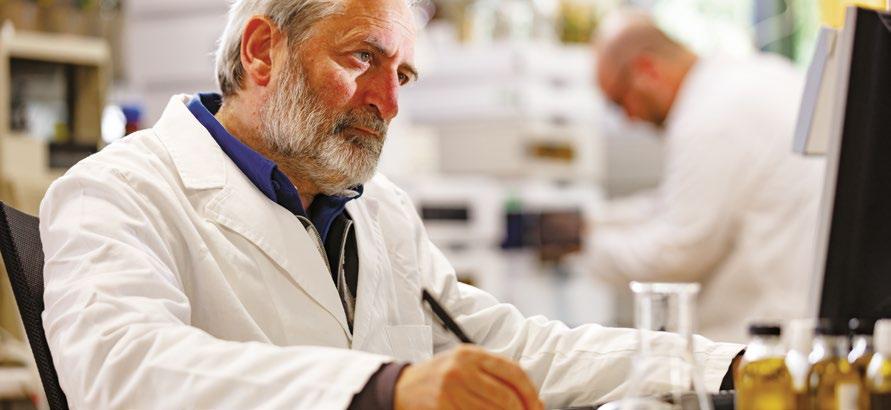
In 2022, Fratelli Carli consolidated its management of health and safety issues by combining the Environmental Management System and the Safety Management System into a single Integrated Management System.
The Workers’ Safety Representatives play a vital role that links all the levels in the health and safety management chain. They have access to all documentation and are consulted for the purposes of risk assessment and the adoption of prevention and protection measures.
In compliance with the law, and in the light of the company’s organizational structure, a number of company physicians have been recruited, one of whom is the medical coordinator of the staff, an integral part of the corporate health and safety management practices and procedures. The company physician takes part in risk assessment and guarantees the confidentiality of any information that may emerge during the regular inspections with employees, in observance of the privacy regulations. The medical fitness examinations conducted by the company physician are structured based on a dedicated health protocol drawn up for the various tasks; this is essential to eliminate risks.
In 2022, Fratelli Carli consolidated its management of health and safety issues by combining the Environmental Management System and the Safety Management System into a single Integrated Management System.
These management systems are based on requisites defined by standards recognized at international level, guaranteeing a consistent approach that is compliant with best practices regarding health, safety and the environment. The integration of the two management systems was the result of effective collaboration and the sharing of the skills and knowledge of the pertinent corporate functions. The integrated approach adopted has allowed us to maintain close, effective control across all these critical aspects, thus enabling an improvement in company performance.
The control guaranteed by the company over issues regarding occupational health and safety has allowed us to keep our workplace injury rate very low: in 2023, just three (non-serious) injuries occurred in the company.
Fratelli Carli considers attention and respect for human rights an essential, necessary part of its everyday operations.
In addition to guaranteeing the health and safety of its employees, Fratelli Carli undertakes to comply with international human rights provisions. Accordingly, it supports freedom of association and the right to collective bargaining, and opposes forced labor, child labor and discrimination. In this regard, no cases of discrimination were noted during the three-year reporting period.
Fratelli Carli is committed to offering its staff a stimulating working environment, offering real opportunities for professional growth and enhancing the skills of each individual. To achieve this objective, the company carries out customized assessments of its employees, in accordance with practices that have been consolidated and perfected over the years. This process allows for premiums and promotions to be granted, as well as the identification of areas of improvement to focus on. The creation of synergies among employees at all levels ensures reliable, constantly updated assessments, thus helping the company to make decisions that acknowledge the skills and value of each individual.
In addition to specific technical training courses, in line with the mandatory training required by Legislative Decree 81/08, Fratelli Carli took steps in 2023 to further structure its training plan, envisaging specific training courses for the main company functions, which involved the CRM, Retail, Customer Management and IT Systems teams.
In addition to specific technical training courses, in line with the mandatory training required by Legislative Decree 81/08, Fratelli Carli took steps in 2023 to further structure its training plan, envisaging specific training courses for the main company functions, which involved the CRM, Retail, Customer Management and IT Systems teams.
In continuity with 2022, Fratelli Carli has seen the realization of a valuable training offer for its resources in many areas. In Customer Care, specific skills have been developed, such as those relating to interaction with customers on social media, or those designed to build and share a Community of Practices. The Empathy Map tool has been used to work on further improving customers’ experience in their dealings with the company. In the marketing area, new tools have been introduced, such as Mural and the Experience Map
The OKR (Objectives and Key Results) framework with which Fratelli Carli’s strategic objectives are managed as of 2023, has led to the adoption of innovative tools and methods to manage the actions implemented to achieve the objectives set.
Close attention was also paid to training regarding the risks posed by phishing, on cybersecurity, how to deal with emotions in managerial activity and coaching regarding the key figures in the various departments.
In line with the previous year, in 2023 Fratelli Carli continued to increase training hours for its employees, reaching a total of 5,767.35 hours, compared to 4,357.55 hours in 2022, a rise of around 32%.
The company ensured full compliance with regulatory health and safety training requirements, as well as updates regarding the technical training of plant operators and data and privacy management.
5,767 hours of training for employees
To find out more about the Empathy Map, see the paragraph "Sustainability Stories: empathetic, caring customer service" on page 70.
Sustainability training has become increasingly important for Fratelli Carli: 2023 saw a 67% increase in the hours devoted to it compared to 2022, and we also put a great deal of work into offering innovative tools and methods for delivering content.
In terms of average hours of training, women benefited from 18 hours each, while the average for men was 12 hours.
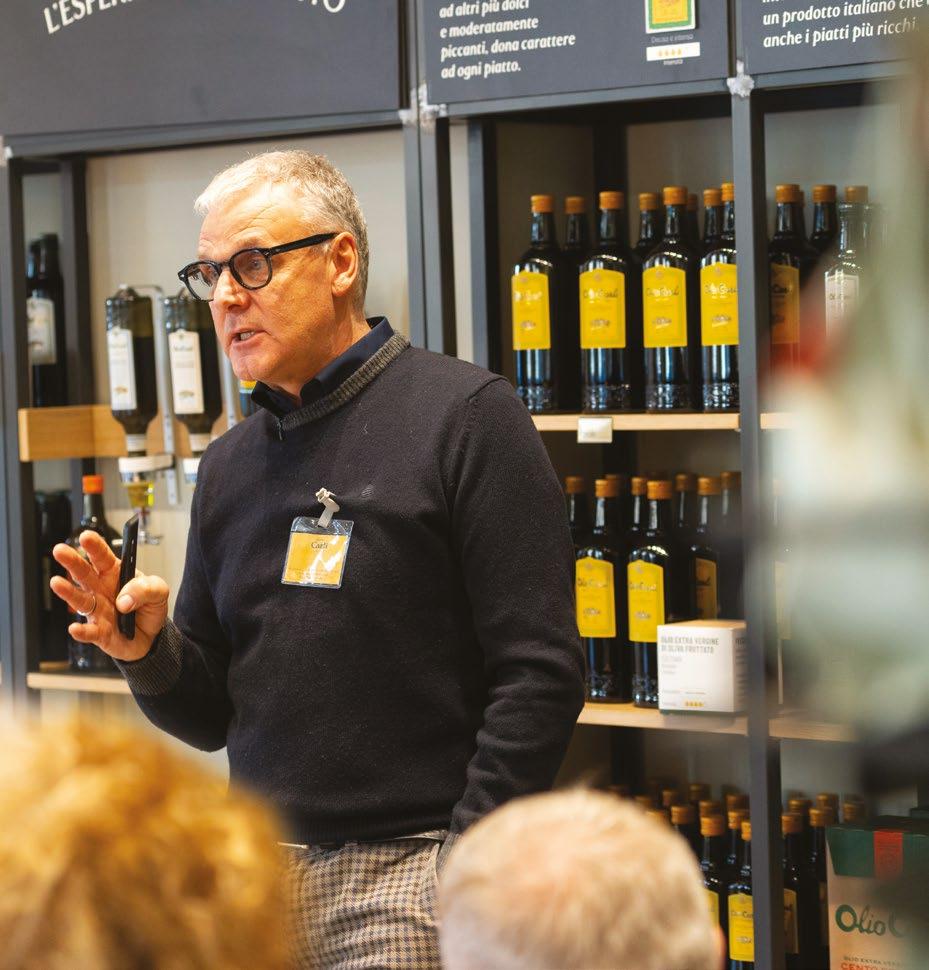

The challenge we have risen to Training has always played a fundamental role in our corporate strategy. Investing in the development of skills and awareness not only allows us to rise to the challenges we face today; it also gives us an active role in shaping the future of the company. On the strength of this conviction, we have strived over the years to constantly boost in-house training on ESG issues (+67% hours in 2023) and to make it increasingly effective and exhaustive. But how can we make it more stimulating and engaging for all our employees and those who work with us? This challenge has prompted us to innovate the way we design and deliver in-house sustainability training.
The change we have made
This year, the Sustainability Committee has endeavored to bring a new look to training encounters, involving participants both before and during training sessions.
The questionnaire entitled “Our Responsible Progress: your opinion matters!” sought to collect impressions, opinions and suggestions from workers on the company’s Sustainability Report and on the activities and objectives in the Sustainability Plan. These questions were then discussed together during the various training encounters.
Employee responses to the questionnaire
Which of our five pillars of sustainability were you most interested in?
+67% Hours of in-house training on ESG issues
How important do you think sustainability is for the future of Fratelli Carli?
But we went a step further. Classroom training was prepared using a storytelling approach, rather than a more traditional method. This allowed us to transmit, in an accurate and engaging way, the may fundamental interconnections between the various functions and departments necessary to achieve the company’s sustainability objectives, which often exceed expectations.
The more we are able to tell our people the stories behind the projects and activities under way and explain the obstacles faced and the progress made, the more effective we will be at creating a culture of sustainability and awareness.
What we have learned
The adoption of a new way of sharing the activities of our Responsible Progress strategy with our people has allowed us to make the concepts more accessible and more tangible. We have realized how the use of a properly structured narrative, engaging our employees and asking for their feedback have all inspired a strong sense of belonging and participation. These ingredients are essential for us to tackle future challenges together.
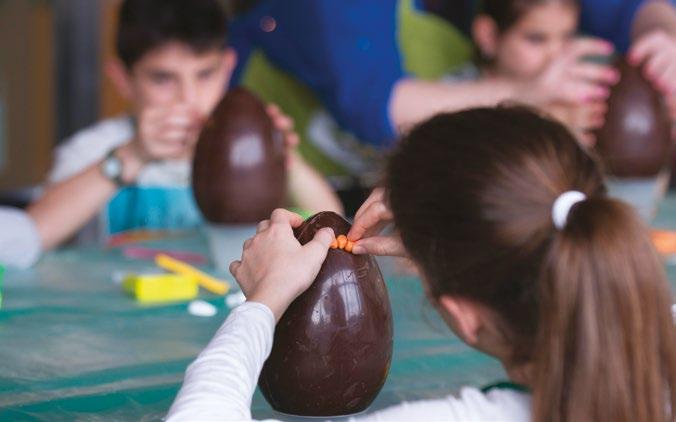
Fratelli Carli shows its commitment to the communities it operates in through solid, lasting, high-quality links with the local areas, also reflected in the choice of local personnel for each site. The company’s relationship with the local areas is based on dialogue and constant attention to peoples’ needs, actively supporting the various local communities through cooperation with workers, farmers and the company’s stakeholders.
Fratelli Carli’s awareness of its responsibilities toward the local context also emerges in initiatives and activities that support and sustain communities, aimed at creating positive impacts for these communities while fostering a spirit of collaboration and trust and remaining a point of reference for the area at all times.
In 2023, the company confirmed its commitment to the local community by donating a total of over 9 tons of its products to some 40 associations, parishes and charities.
Both for the lunches served at the Emporium in Imperia and in all the company’s reception rooms, WAMI Water is the water of choice. WAMI is a B Corp that builds aqueducts worldwide, and a contribution can be made to its mission simply by drinking its water: each WAMI bottle means a donation of 100 liters of water to a community involved in its water projects.
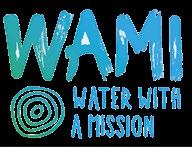
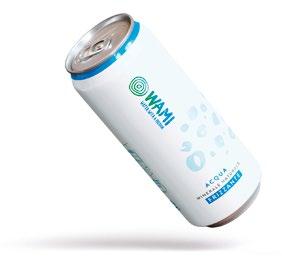
The QR code on the label allows the consumer to immediately see the family that has been guaranteed water, and to find out more about the countries involved. Thanks to this collaboration, in 2023, Fratelli Carli contributed to getting 2,268,000 liters of water to communities that did not have access to it.
2,268,000 Liters of drinking water guaranteed for water projects
Within the framework of the Informafood project, which envisages actions aimed at promoting the collection and distribution of leftover food in the city of Imperia, the company contributed to the purchase of a vehicle to be donated to the local Caritas charity organization for the distribution of foodstuffs to the needy.
The Diana cooperative, which coordinated the project, worked on raising awareness among local shopkeepers regarding the redistribution of food left over at the end of the day, as well as organizing a series of encounters and workshops to encourage young people to reflect on responsible use of food to prevent waste.
For many years now, the Christmas gifts for employees’ children have been chosen not only to bring joy, but also in the spirit of solidarity.
Starting from 2021, we decided to support more than one organization, paying particular attention to children’s needs. This year, the Christmas gifts have contributed to the activities of the Lega del Filo d’Oro association, the Dynamo Camp Foundation, the CUAMM Medici con l’Africa Association, and Unicef
Our aim is to be part of a large community of people in which everyone’s needs are listened to, understood and given the attention they deserve. Fratelli Carli strives daily to maintain a direct link with its customer base.
This is ensured through the home distribution model that has always been the hallmark of the company, and through our 20 single-brand stores: two sales channels that allow Fratelli Carli to establish a close, family relationship with each customer
The attention paid to customers’ needs and desires allows us to meet their requirements, visiting their homes as an old friend might. For over a century, the Customer Care team has developed a relationship of trust based on experience and the "spirit" of Fratelli Carli, which today is also rewarded by the most modern web evaluation systems, such as Trustpilot, where the company has an "Excellent" rating on all markets.
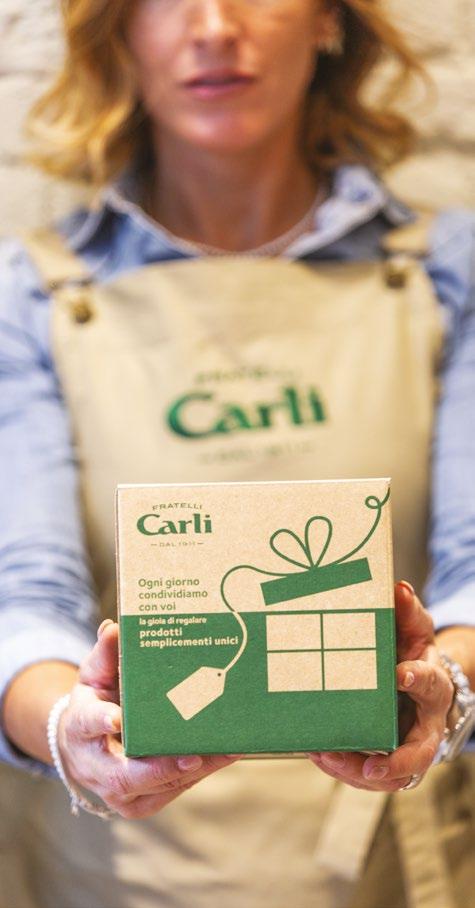
Protection of privacy and the security of personal data is a priority concern in all fields of corporate activity. Since 2005, Fratelli Carli has held ISO 27001 certification, guaranteeing customers optimal security standards, while safeguarding data confidentiality, availability and integrity. This choice reflects the company’s ongoing attention to processing customer data. Fratelli Carli has always complied with strict rules and procedures, which were promptly adjusted to GDPR standards
The Company also has the Net-Comm seal, awarded to e-commerce websites that offer transparency, quality and reliability in their dealings with consumers. Fratelli Carli also has the World E-commerce Quality Mark.

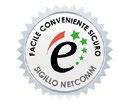

Eight websites, each with an innovative design and fully responsive technology, are the online calling card Fratelli Carli presents to customers in each market it operates in. This is a core element of the broader transformation Fratelli Carli has embarked on, with a view to creating a brand experience that meets all the needs of our customer base. With this in mind, a study is under way for the redesign of all the corporate websites, to make them even more innovative and complete in terms of the services and content provided.
The aim of this process is an increasingly efficient integration of the traditional and digital channels of contact, ranging from telephone calls to the internet, e-mails, online chat services and text messages, as well as our local Emporiums, offering services able to move with the times, while remaining soundly anchored to the company’s traditions.
Fratelli Carli has embarked on a process aimed at creating a brand experience able to satisfy all the needs of its customers. This technological and management change has involved the corporate organization at all levels.
This technological and management change has involved the corporate organization at all levels, and has included a new partnership with Salesforce for the CRM system, which manages all aspects of relations with customers.
To further improve service, in 2023, Fratelli Carli extended the range of payment methods available by adding the Klarna instalment payment system, as well as the Apple Pay and Amazon Pay electronic payment systems.
Fratelli Carli is aware, however, that technological evolution must go hand in hand with maintaining the excellent relationship it has developed with its customer base over the years. One of the key elements of our corporate approach is the skillful blend of innovation and tradition: a winning combination that makes the company strong and creates a unique customer experience.
Fratelli Carli has always been part of an extended family for its customers, thanks both to the home delivery service and the direct, daily contact, based on shared values: by phone, by post, by e-mail, and now, thanks to the new websites, by online chat service
Every day, the 60 members of our Customer Care team are on hand to receive orders from customers, respond to requests, and arrange efficient deliveries, or, in the rare event it is requested, carry out a simple, swift return process that is guaranteed for 90 days. All this helps ensure an excellent purchasing experience.
Calls to the Call Center last about three minutes on average. While some customers are quick to place an order, many others call to ask for advice or information from a company they consider as family.
To maintain an excellent ability to respond to the needs and requests of customers in all countries, whatever the channel used to contact us, Fratelli Carli has continued to enhance and improve the skills of our Customer Care team.
This outstanding service earned Fratelli Carli a place on the list of Italy's Best Customer Service 2023-2024, drawn up by Corriere della Sera and Statista.

67,778 replies to customers via mail or e-mail
60 Customer Care operators
With a view to responding increasingly promptly and effectively to the new needs of customers who interact with the company through digital channels, the company has embarked on an innovative Marketing Automation project.
Given the high levels of customer retention, Fratelli Carli engages with both “traditional” consumers who like to be contacted by post and more “modern”, digital customers.
To respond to customers’ needs also with regard to channels for contact and interaction, Fratelli Carli combines the sending of price lists by post with an e-mail marketing plan, in order to boost sales and promote the brand.
Since 2021, Fratelli Carli’s e-mail marketing plan has been complemented by a monthly communication focused on sustainability issues, with an editorial plan designed to update customers on the company's efforts in this area, as well as encouraging them to reflect on the importance of a sustainable approach to their own activities.
In addition, 2022 saw the continuing of the e-mail marketing pilot project initiated in Germany and in Italy, designed to gradually replace postal communications with mainly digital communications.
The plan also aims to broaden the range of communication channels with customers, with the accent on more direct, constant exchanges: both e-mail marketing and price lists sent by post invite customers to visit the websites, which are able to offer a broader, more engaging account of sustainability than the individual means of contact. During the reporting year, this project gathered speed, particularly in Italy, where positive results were recorded.
With a view to responding increasingly promptly and effectively to the new needs of customers who interact with the company through digital channels, the company has embarked on an innovative Marketing Automation project, which will be developed over the coming months. The aim is to optimize all the marketing processes, allowing us to reach out to customers at just the right time, with an offer and a service able to meet their expectations in full.
The challenge we have risen to
Empathy is key to outstanding customer service. In an increasingly digital world, Customer Care has a crucial role to play in customer satisfaction and retention, and this is no easy task. Over the last two years, we have used innovative methods and tools to enhance the skills of our Customer Care team in both professional and human terms.
The Empathy map is divided into quadrants, based on what the Customer Says, Thinks, Does and Feels.

Their role is played out in the collective, unifying dimension of a “Community of Practices”, sharing tools and experiences. One of the most effective tools for boosting empathy toward customers is the use of Empathy Maps that represent them. The map is divided into 4 quadrants that improve our understanding of what the customer thinks, says, does and feels when they interact with our Customer Care team.
The change we have made
Integrating this tool into our everyday operations has posed a number of challenges: here’s how we’ve tackled them. We have set up training workshops, involving our Customer Care operators, in particular those who are in direct contact with customers over the phone. During these workshops, the operators analyzed their experiences in dealing with customers, processing the emotions and motives of the people who contact Customer Care.
Our operators have worked as a team, exchanging experiences, and with the help of the Empathy Map, they have succeeded in customizing the approach to customers to ensure their experience with the world of Fratelli Carli is wholly positive.
For all of us, the customer has always been the focus of our everyday efforts, and our experience and tradition, stretching back more than 100 years, allows our Customer Care team to offer outstanding service.
We have sought to rise to the challenges we face, by adopting new tools and experimenting with solutions that offer us a new perspective on what we do. This was no simple choice, but we stepped up, and our efforts have been rewarded.
We’ve grown and improved along with our people, in terms of both service quality and team spirit, always with a view to keeping our customers happy. This is our daily mission.
do
What do they think and feel?
What do they say and do?
What do they see?
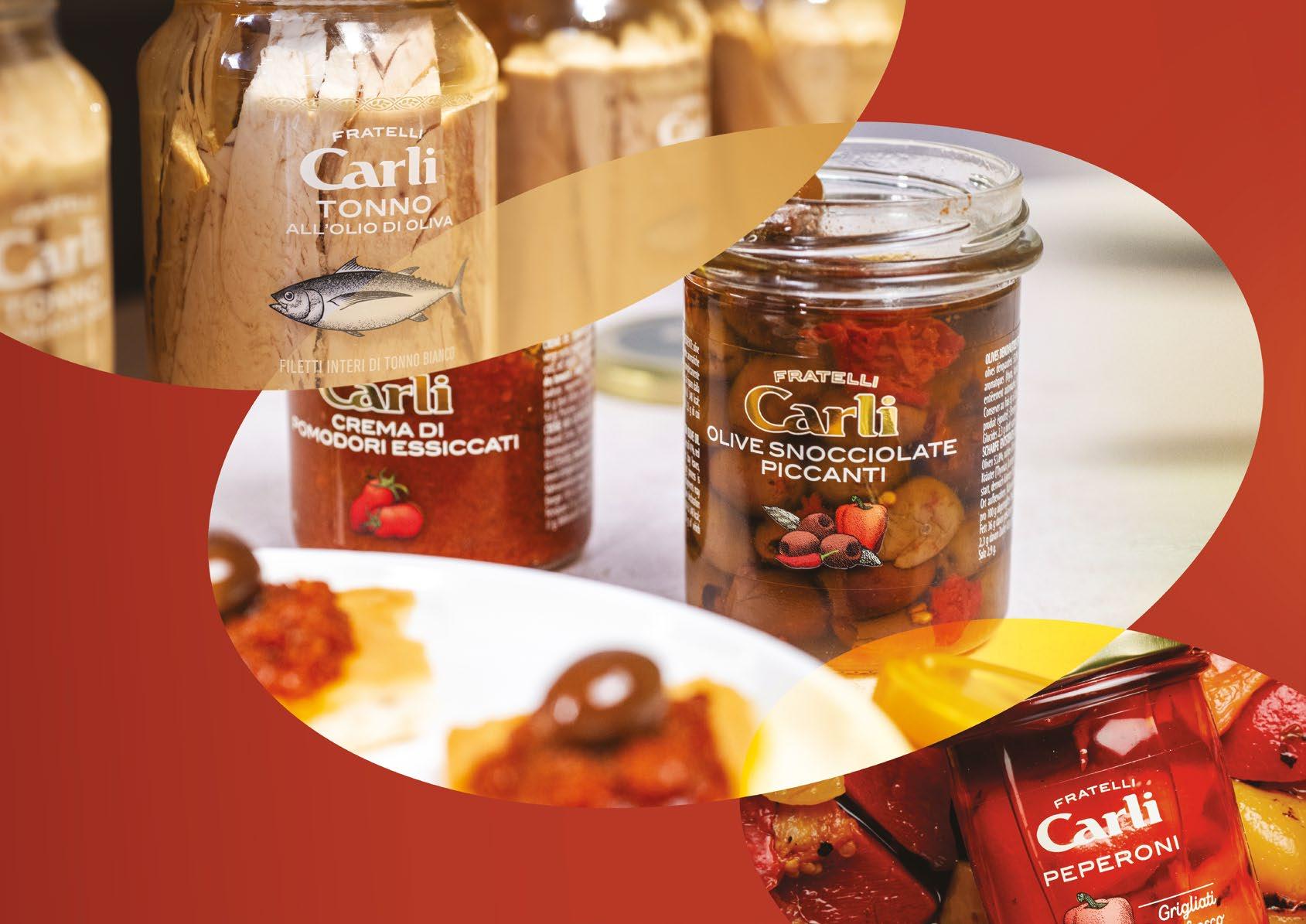
Prime quality has always been the Fratelli Carli way!
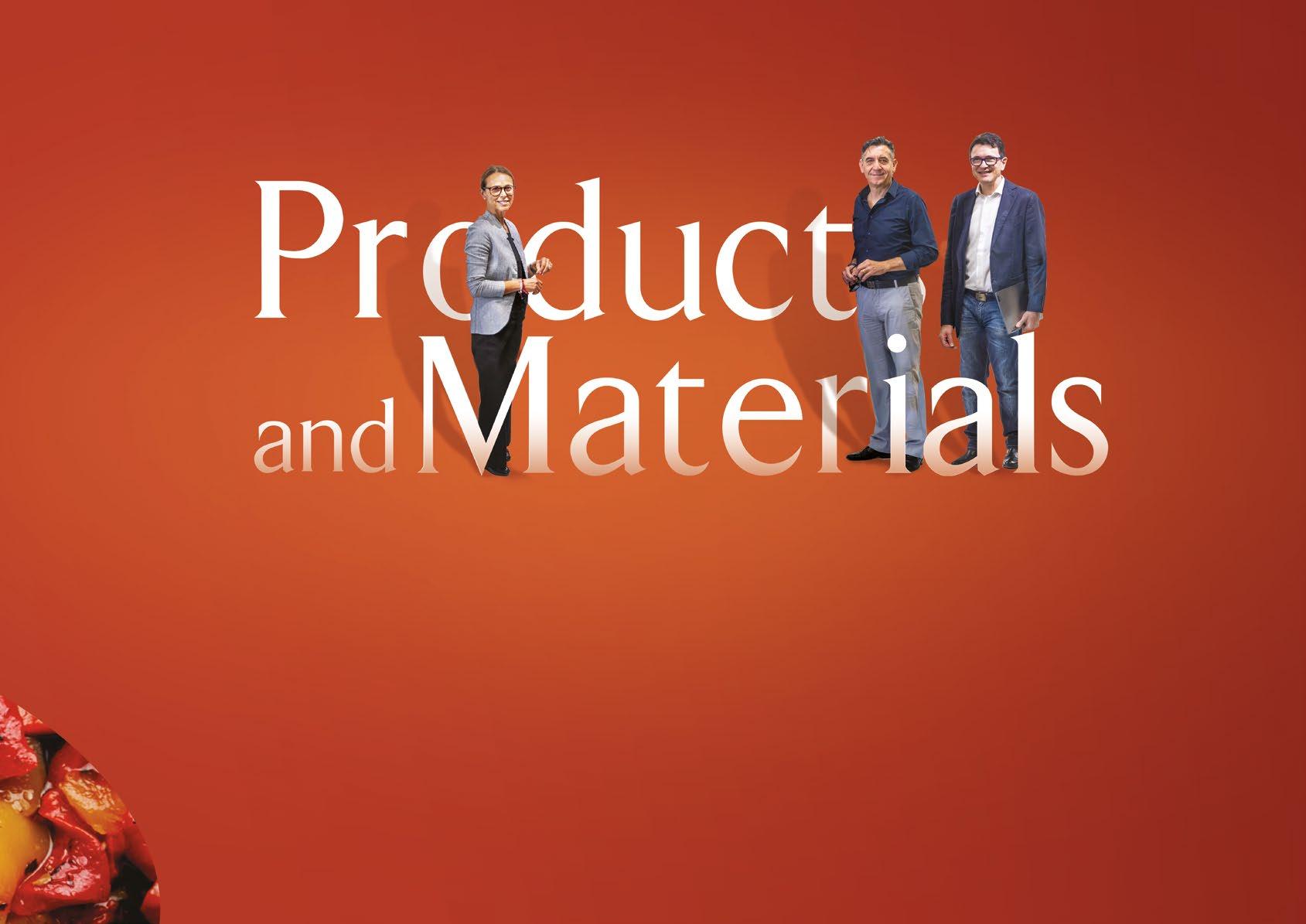
We have embarked on a virtuous process that leads us to analyze and enhance sustainability at each stage of the life cycle of our products: from the cultivation of the raw materials through to production, packaging and end consumption. This is the only way we can offer the very best to our customers, now and in the future.
Marketing and Food Product Development Manager
• To continue to offer new Mediterranean food specialties, lovingly prepared in the traditional way, using just a few simple, prime-quality ingredients
• To increase to 55% the amount of product ranges analyzed using the Life Cycle Sustainability Assessment (LCSA), which quantifies their environmental, social and economic impact.
• To carefully and constantly monitor the nutritional, safety and quality aspects of our products, to offer our customers top levels of excellence every time.
• To constantly renew the primary and secondary packaging of our products and free gifts, with a view to continual improvement in terms of sustainability.
• To increase the percentage of materials, raw materials and food specialties with sustainability certification and/or produced by B Corp certified companies or Benefit Corporations
2023 Highlights
MATERIALS analyses conducted on all our products 3,925 new products developed 9 product analyses conducted by our in-house laboratory 3,194 product ranges with LCSA 50% reduction in CO2 for the new Classic EVO Oil -7% weight of plastic out of the total weight of all the processing and packaging materials purchased 1.10% of all our packs made from FSC cardboard 99.96% recyclable materials used for the packs of our oils 100%
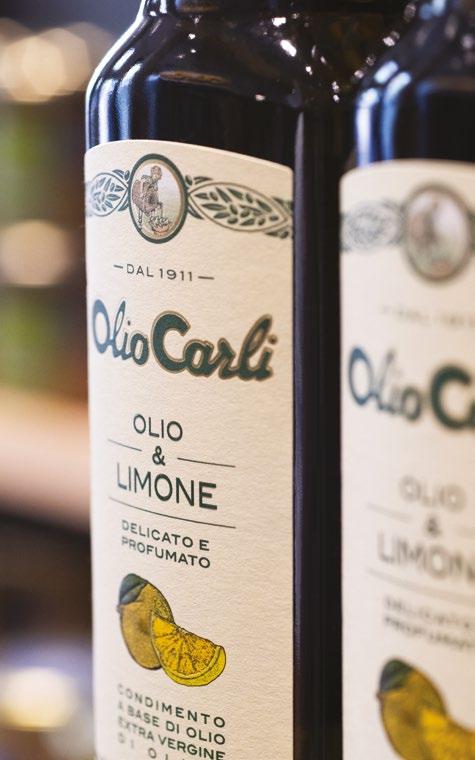
Fratelli Carli pays maximum attention to the quality and safety of its products. The company is constantly committed to ensuring high quality standards at all stages of the process, from the selection of raw materials, production and distribution through to the moment products reach our Emporiums and our customers’ homes.
Safety, quality and communication: success guaranteed
To comply with the standards set, Fratelli Carli follows a strict, adequately documented quality guarantee program. In addition to the pertinent, duly regulated regulatory checks, the company has an in-house laboratory in which specific chemical and physical analyses are conducted on each batch of olive oil produced and purchased, thus guaranteeing the presence of a Carli Guarantee Certificate for each bottle sold. Indicated on the Certificate are all the chemical, physical and organoleptic parameters of the oil, thus providing an authentic identity card for all the Carli Oils. Customers can also find the same information on the website, including traceability information on the oils, accessible from the lot number printed on the package. Traceability is an integral part of the quality management system, and is an effective, constant commitment we make to our customers, allowing them to quickly and easily access key information such as the date of bottling, where the olives were milled and the organoleptic characteristics of the oil.
The Fratelli Carli food safety management system complies with the principles of the Codex Alimentarius and EC Regulation 852/2004, carrying out an in-depth analysis of the dangers and associated risks and establishing which of those risks (chemical, physical and microbiological) may be significant for the different types of products. Safety is a top priority for the company, guiding its choices from the selection of the raw materials in accordance with very strict safety and quality criteria. Fratelli Carli maintains stable relations with its trusted suppliers, cooperating with them to guarantee high quality standards by implementing constant controls in compliance with the law and with our own in-house standards.
product analyses conducted by our in-house laboratory 3,194
Customer safety is a top priority for the company, and is taken account of from the selection of the raw materials in accordance with very strict safety and quality criteria.

In addition to guaranteeing safe raw materials, Fratelli Carli undertakes to ensure the quality and safety of all the production processes, right up to the moment products reach the end customer. In the three-year period 2021-2023, there were no reports of episodes associated with the company’s products that had a negative impact on consumer health. As well as guaranteeing premium-quality products, Fratelli Carli promotes the development of responsible communication able to provide customers with the correct information on the labels, not only to comply with regulations, but also to aid responsible, aware consumer choices through clear, transparent nutritional information.
In the three-year period 2021-2023, there were no reports of failure to comply with regulations and/or self-regulatory codes with regard to the marketing and labeling of the company’s products.



Fratelli Carli recipes have always been simple and wholesome, made as you might at home from a small number of exclusively natural, prime-quality ingredients, starting from the Carli Oil that gives them their unique flavor. All our products are carefully developed and embody the company's history: Mediterranean traditions, uncompromisingly high quality, and attention to people and the environment, attested to by the MSC, Dolphin Safe and SQNPI (National Integrated Production Quality System) and BIO certifications.
The direct, personal relationship with all our suppliers, carefully selected and fully involved in the company’s sustainable approach, ensures that the same values are shared right along the supply chain. So far, two of our most important suppliers of food specialties have obtained B Corp Certification.
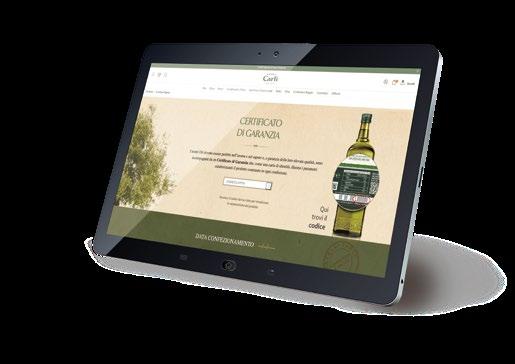
The company uses LCSA (Life Cycle Sustainability Assessment), an analysis method based on decades of scientific research that enables the evaluation of the sustainability profile of a product throughout its entire life cycle, from the sourcing of the raw materials to consumption, covering the production process, distribution, use and end of life.
LCSA enables the identification of positive or negative impacts in terms of sustainability principles, actively engaging all the players in the company’s value chain. The output enables the identification of the areas for improvement to be included in the subsequent yearly assessments.
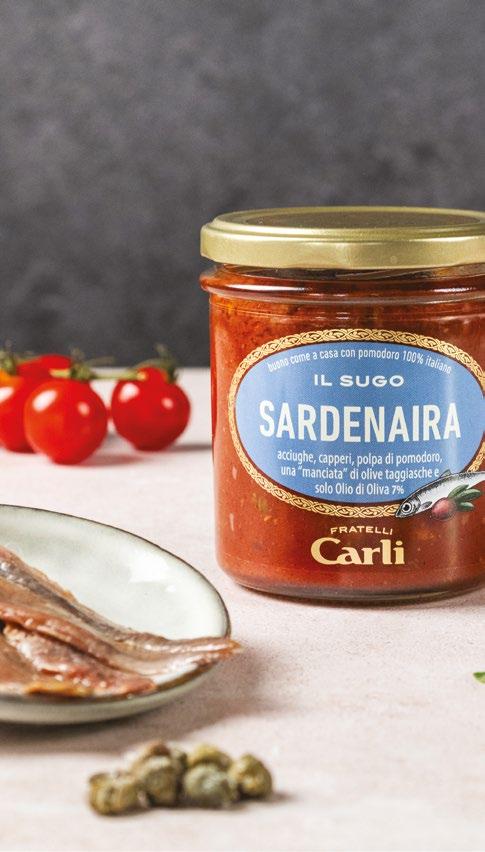
a sustainable society, nature is not subject to systematically increasing concentrations of substances produced by society
a sustainable society, nature is not subject to systematically increasing deterioration by physical means
LCSA analysis has been regularly conducted since 2012, to monitor developments following pro-sustainability remedial measures. 50% of all product lines were analyzed, accounting for 83% of total turnover.
In order to acquire full awareness of its relationship with the environment, a company selling consumer goods must be aware of the impact its products have on the ecosystem. This means understanding the implications along the entire value chain, by relying on rigorous methodologies that can accurately identify negative externalities.
For this reason, Fratelli Carli has carried out life cycle assessments (LCA) on its Extra Virgin Olive Oils (bottled), Olive Oil (bottled and canned) and White Tuna (canned).
The Life Cycle Assessment (LCA) allows companies to quantify the potential environmental impacts associated with a product, from raw materials to end of life, enabling the identification of the areas with the greatest impact.
If we look at the carbon footprint of products alone (one of the impact areas examined in the LCA), most of the impact of CO2 (78% for Oil and 93% for Tuna) is concentrated during the upstream production phases (cultivation and fishing respectively, together with processing) before the raw material is delivered to Fratelli Carli.
Materials/Products by weight – 2023
In line with the previous year, in 2023 the weight of the materials/products consumed was mainly accounted for by food raw materials (53.6%), almost entirely related to olive oil (92.3%). The amount of materials purchased for packaging amounted to 35%, while the finished products purchased accounted for 7.3% of the total amount of materials/products purchased. Mediterranea materials accounted for 3.6%. Just 0.5% was attributable to the free gifts purchased, the amount of which was significantly lower than in 2022 (-79%).


To offer our customers from all the countries we serve unique blends, skillfully created by combining selected oils made from healthy olives, harvested when perfectly ripe, as well as delicious, wholesome food specialties made from a small number of genuine, natural ingredients able to satisfy the needs and tastes of our customers: these are the aims we’ve been pursuing every day for more than 100 years now.
These efforts are the founding values of our business, so much so that they are set out in our Articles of Association as a Benefit Corporation as our Common Good Purposes, together with the pursuit of sustainability across the board for suppliers, customers, raw materials and packaging materials.
During 2023 we have developed 9 new products…. and there’s more
To rise to the challenge of responding increasingly effectively to the needs of our customers, on the one hand, and on the other, to study increasingly functional, sustainable solutions for the project to redevelop the pack of our Gragnano Pasta products, sold abroad, we decided to adopt our customers’ views as a starting point.
9 new products developed during 2023
Elimination of the transparent plastic window from our pasta boxes, in favor of a pack made from recyclable paper 100%
This prompted us to draft a brief questionnaire that was sent to all consumers of our pasta
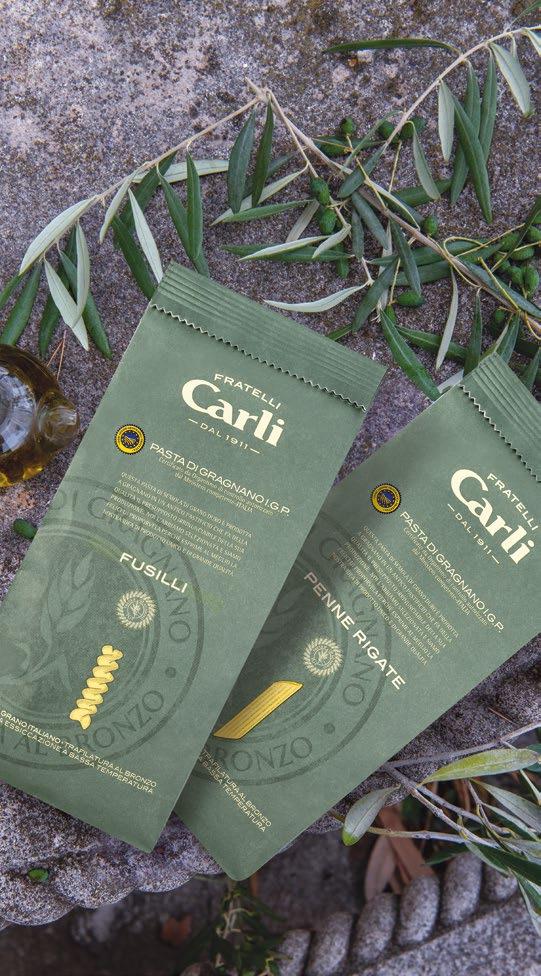
The responses were overwhelmingly in favor of our proposal to eliminate the plastic window that allowed customers to “see” the product, and to replace it with a pack made from 100% recyclable paper, now already in production.
And this year we have also embarked on a challenging, broad-ranging project that will regard many of our specialties.
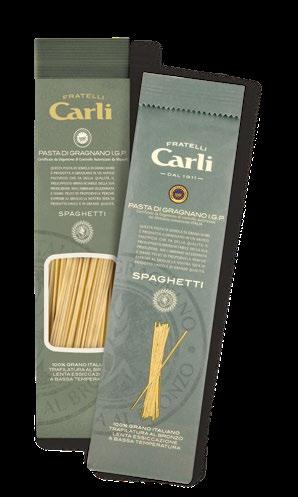
The aim is to focus on the breadth and depth of our product offer, ensuring that each product category is able to clearly and immediately inform customers of its specific qualities and excellence, as well as conveying the value of the “Fratelli Carli” name and the quality, reliability and sustainability it stands for.
This challenging effort will be continuing ceaselessly over the coming months, to ensure the message reaches our customers without delay.
The hallmark of our company has always been a responsible, attentive approach towards our customers and the world around us. The clear aims of the “sustainability governance” we have constructed over the years and shared with all our employees and our entire supply chain have succeeded in echoing and strengthening these values, and our convincing teamwork efforts have allowed us to implement a constant process of innovation, with some surprising results.
Some years ago now, Fratelli Carli, together with its entire supply chain, embarked on a process for the analysis of its product packaging, in order to gradually decrease the amount used, while maintaining performance, and to increase the use of more sustainable materials.
The main types of materials used by the company for packaging are paper, cardboard, glass, aluminum, steel and plastic.
For some time now, the company has been sourcing paper and cardboard from FSC certified supply chains, which guarantee responsible management of forests. In addition, 2023 saw the completion of the process for renewing the packaging of its specialties sold in jars, which it had embarked on the previous year. These packs have been completely redesigned, using Havana cardboard for all products, and with a comprehensive rethink of the graphics with a view to reducing and simplifying the use of inks. This action has been implemented in order to create solutions with a lower environmental impact. The packaging of products not sold in jars is also being replaced with a plain-colored Havana cardboard solution.
The attention paid and the efforts made to reducing the amount of plastic purchased for product packaging processes and the replacement of the remaining plastic with recycled material has yielded significant results in recent years, and plastic now accounts for just 1.1% of the total amount of materials purchased by the company.
To assess the reduction in the impact of the new pack for the specialties sold in jars, a Life Cycle Assessment (LCA) was conducted to compare the sustainability of the old and the new boxes.
Specifically, the assessment considered the differences with regard to both printing inksapplied using 5-color offset technology on the old boxes and single-color flexo technology on the new Havana boxes – and the weight and yields of the cardboard used for the two types of packs.
The LCA assessment mapped 6 environmental impact categories:
• climate change (kg CO2e)
• ozone layer depletion (mg CFC-11-Eq)
• formation of photochemical smog (kg NMVOC-Eq)
• acidification (kg SO2e)
• eutrophication - fresh water (kg PO4e)
• depletion of the water resources (m3-Eq).
If we examine the climate change aspect further, it can be estimated that the introduction of the new Havana boxes has allowed us to avoid the emission of approximately 109 tons of CO2eq per year, considering annual production volumes.**
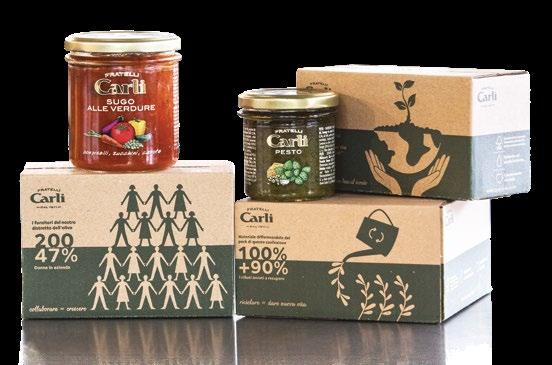
Compared to the previous packaging, the Havana box has allowed for an average reduction of around 40%* in environmental impacts across all six categories examined.
* The scope of the analysis system does not include product use and downstream distribution. This is because the product is not associated with any particular environmental impact during use. The downstream product distribution phase is currently not included, but will be incorporated as soon as the data is available.
** The estimate took into account the volume of boxes used during 2022. The comparative LCA assessment only covered 2x314 boxes: to estimate emissions avoided, the impact identified by the LCA was then applied to all types of boxes purchased, regardless of the category.
This valuable result was bolstered in 2023 with the redesigning of the primary packaging for the durum wheat semolina pasta range, involving the elimination of the plastic window and the introduction of a bag in 100% recyclable paper
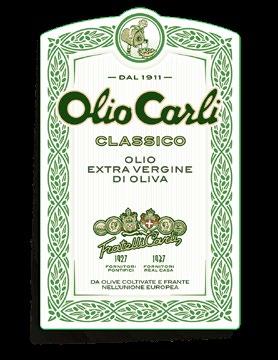
Thanks to the close collaboration with the supplier, the restyling of the new labels for the Classic and Fruttato Extra Virgin Olive Oil has also allowed for an overall reduction in the environmental impacts of the paper and the inks, resulting in a 7% reduction in CO2 emissions.
Co2 for the labels of the Classic and Fruttato Extra Virgin Olive Oils -7%
recycled PET plastic used for the trays in the focaccia range 90%
weight of plastic out of the total of al the processing and packaging materials purchased 1.10%
FSC cardboard for the packs of all our oils
In addition, a significant contribution to the aim of reducing the amount of plastic used in processes and for packaging has been made by the adoption of 100% recycled plastic for all the filling materials for shipments abroad, the move, for all the trays in the focaccia range, to a 90% recycled PET plastic, and the re-engineering of the technical support for the labels of the products sold in jars, which has allowed us to completely replace the backing film in glassine, a non-separable material that requires a complex disposal process, with a plastic backing that is 100% recyclable.
In the company's Printing Center, the exclusively plant-based inks, used to prepare the more than 10 million printed products intended for customers annually, are Cradle to Cradle certified. This standard provides manufacturers with a rating system that enables them to manufacture products that improve the quality of life and the environment. Products are assessed with regard to several aspects that have an impact on human health and the environment: quality and sustainability of materials, reuse, energy and emissions, water resources and social equity.
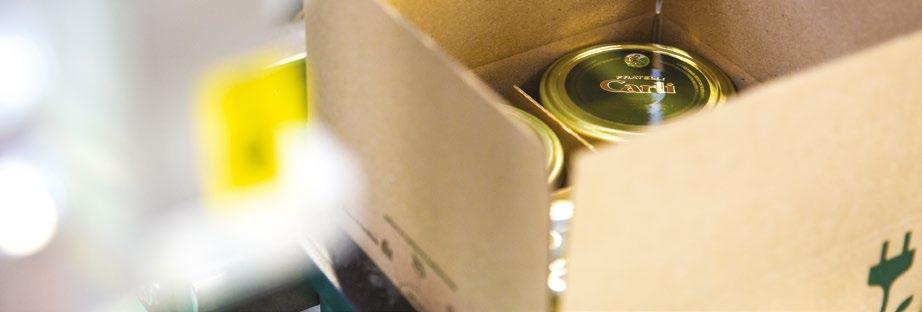
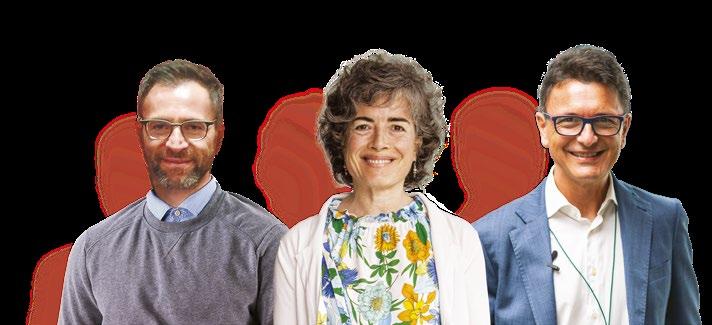
The challenge we have faced
As an integral part of our sustainability mission, we have embarked on an ambitious in-house process for the structured management of environmental, social and governance (ESG) data. These data, necessary for efficient sustainability governance, are spread across all company functions, and are not always readily available.
This was why needed to go a step further, to make all this information available through a shared, digitalized process.
The change we have made
We began by accurately mapping all the company’s sustainability data, highlighting the source, the company function responsible and how the data are interconnected, as well as the acceptability and certifiability criteria.
This formed the foundation for the first step in the data modeling project, which took into consideration the sets of data regarding the Materials and Products pillar
Creation of a Data Warehouse for full integration of all the information into the company systems
A dedicated, coordinated team effort allowed us to track the ESG data for all the materials, raw materials and finished products purchased and sold by the company, to guarantee complete, accurate information. Envisaged for the coming months is the implementation of all this detailed information in the company systems, and the creation of a Data Warehouse that will allow for full integration of the data and the production of the analyses and indexes required for sustainability governance.
What makes this project unique is that all the work has been conceived and carried out within the company, with all the various areas working in synergy: the administration, the purchasing office, the logistics and IT systems, the product marketing and technical offices, the production departments and the sustainability function. Together, we have been able to make the most of our skills and resources, sharing not only information, but also the purpose and the spirit of the project. This has heightened our attention for these issues even further.
And this is only the beginning: our ultimate aim is the construction of a complete ESG data governance and data modeling system for all the company’s sustainability data.
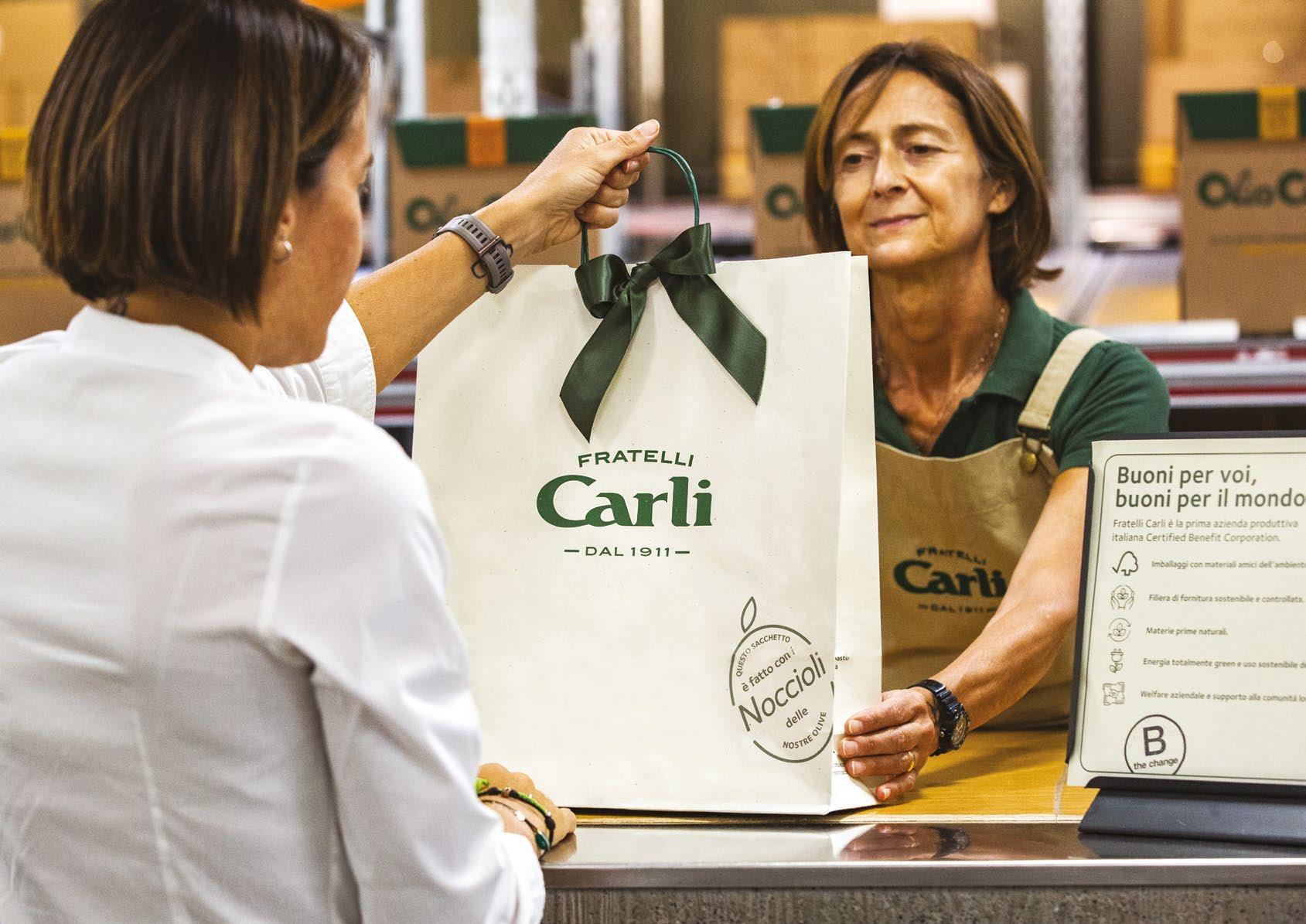
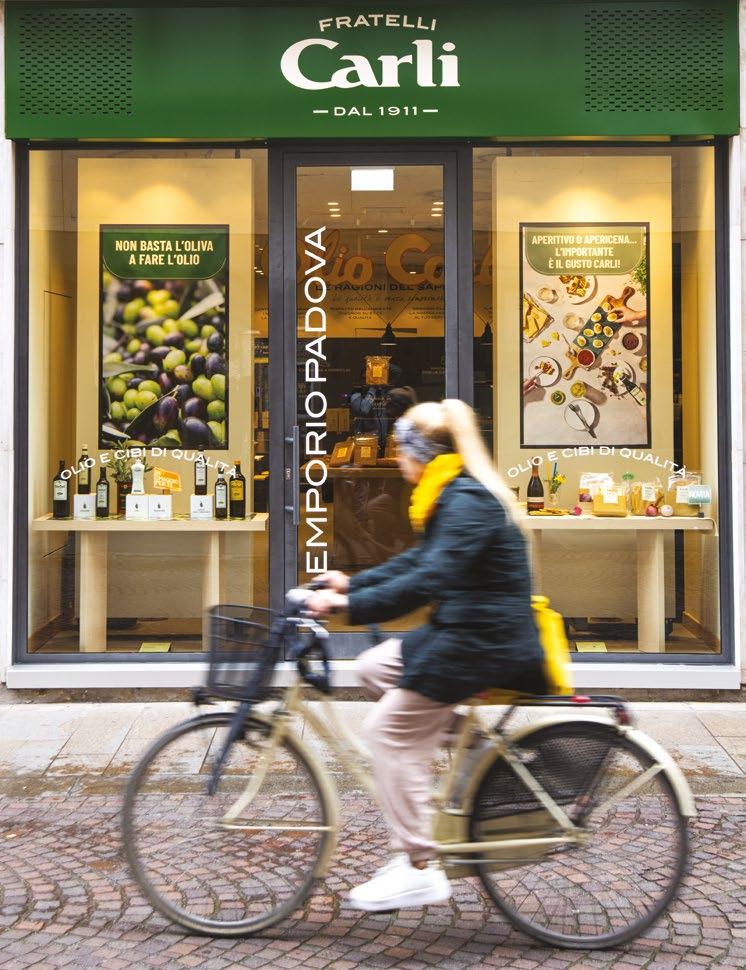
Fratelli Carli has embarked on a project to redesign and renovate the Emporiums, with a view to replacing traditional materials with environmentally sustainable alternatives, in line with the most innovative developments in green building
This strategic choice began with the opening of the Emporiums in Alba, Vicenza and Treviso, and continued in 2023 with the restyling of the Monza Emporium. It will be gradually applied to all the Emporiums, with a view to reducing the environmental impact of our stores. Specifically, the work involved repainting the inside of the stores and replacing the floors, drywall systems and furnishings, for which wood and iron elements were preferred. With the assistance of the specialized architecture firm Materiavera, Fratelli Carli carried out an analysis focused on comparing materials with the same use but with different characteristics, taking into consideration a number of parameters (the use of energy from renewable sources, overall CO2 emissions, soil and water acidification potential, and consumption of water resources).
The outcome of the study confirmed the reduction of the environmental impact associated with the choice of environmentally friendly materials in terms of reducing emissions and resource consumption, and highlighted some further areas for improvement, which will guide the company's future actions towards an increasing use of environmentally friendly materials.
In line with these developments, Fratelli Carli has taken a variety of actions for the progressive dematerialization of the Emporiums’ communications, such as the replacement of posters in shop windows with digital monitors, and the replacement of plastic price tags with alternatives made from biodegradable PLA. These actions testify to Fratelli Carli’s ongoing commitment to adopting sustainable, responsible solutions in the conducting of its business.
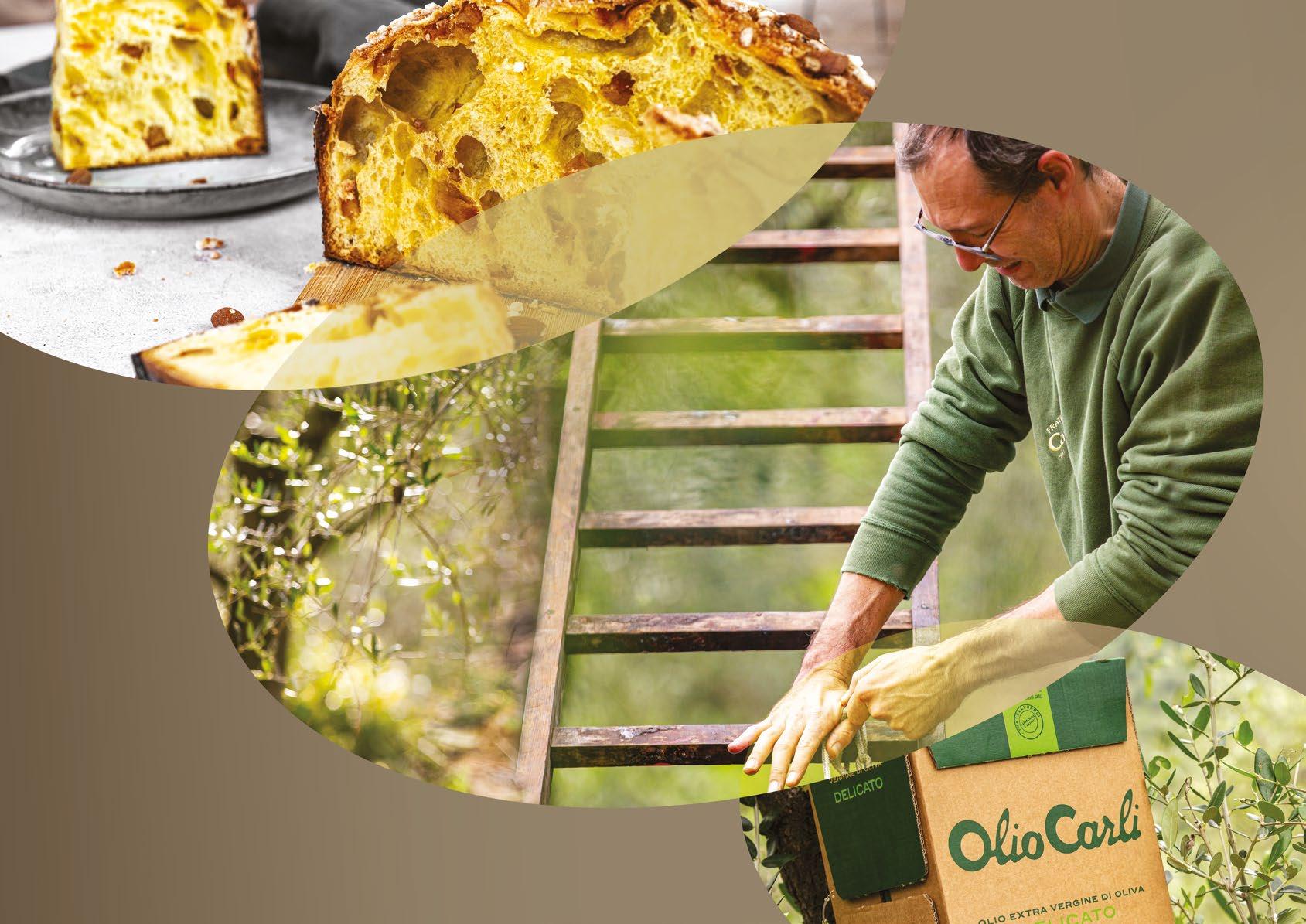
We always choose our suppliers carefully and get to know them personally
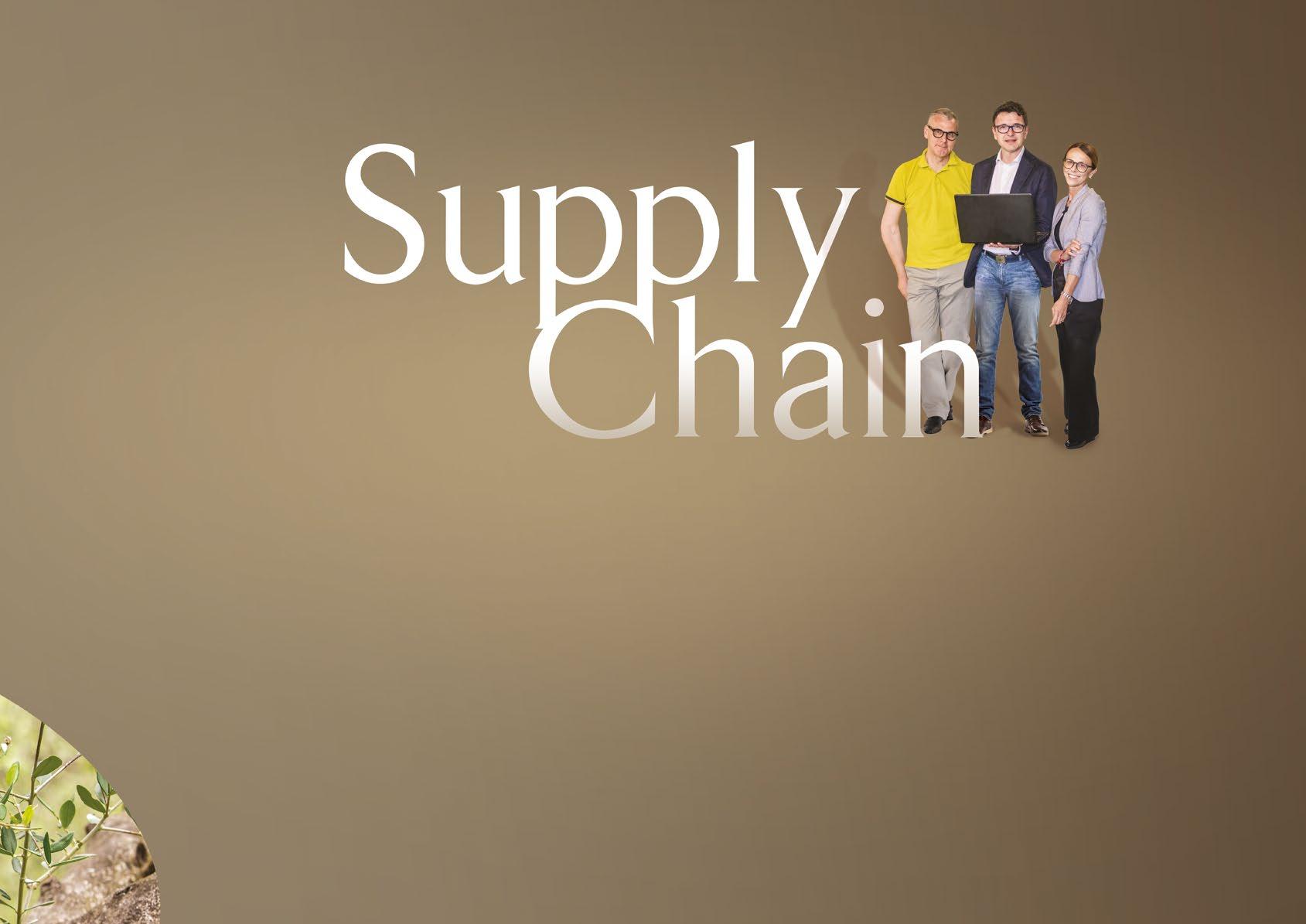
The strong, valuable relationship we have built up with our suppliers over the years has allowed us to establish a trusted reputation for top-quality products. We are aware that our commitment to sustainability and quality would have no future without their help.
This is what prompted us to implement the Fratelli Carli Districts and Codes project, which is key to the sharing of a process formed by shared values, and above all effective actions.
• Turning the Goodness District into a Benefit District.
• Opening up the Transport District to new suppliers of logistics services.
• Bringing the Transport District on board the “Carbon Neutrality” project
• Working with the entire supply chain to gather all the shared sustainability KPI into the pertinent codes, using the tools established
• Increasing the percentage of major suppliers involved in the Codes and assessed according to environmental and social criteria to 55%
2023 Highlights
suppliers involved in the Olive, Goodness, Beauty and Delivery Codes out of the total number of major suppliers
46.2% life cycle sustainability assessments (LCSA) conducted with suppliers +60 share of the total procurement budget spent on local suppliers located in Italy 76%
B Corp Certified suppliers or Benefit Corporations in our supply chain 4
Sustainability Codes shared with our suppliers of materials, finished products, olives and logistics 3
One of Fratelli Carli’s hallmark features is our supply chain. In conducting its business, the company can count on a solid network of suppliers, which over the years has not changed significantly; this is indicative of a sound, lasting relationship.
Fratelli Carli shows a clear preference for local suppliers located in Italy, with 76% of the procurement budget allocated to them.
Proportion of expenditure to local suppliers (2023)
Fratelli Carli is aware of how important it is to establish a relationship of trust and of active, direct engagement with suppliers when creating its products and company policies, which seek to integrate aspects of sustainability at each individual stage of the process.
This is why, starting from 2012, the company identified three supplier Districts, drawing up a specific “Code” for each that identifies the shared values and principles underpinning the actions to be taken and the targets to be set.
During the year, all the suppliers were involved in the specific activities regarding their Codes, aimed at the achievement of the District targets and monitoring KPIs.
Fratelli Carli’s new suppliers considered most significant based on goods code are selected in accordance with the environmental and social criteria established in the Codes. In 2023, the 5 new suppliers corresponding to this definition were assessed according to these criteria.
The longest collaboration with a supplier (in years)
Codes shared with suppliers to achieve sustainable innovation goals together
The Olive Code involves more than 200 olive oil suppliers from the traditional olive-growing areas in the Mediterranean (Greece, Spain, Italy), carefully selected for both the quality and excellence of their products and for the attention paid to sustainability during the production cycle. The process envisages a shared effort to develop sustainability practices during the growing and production phases.
By subscribing to the Olive Code, suppliers undertake to share the values and objectives of Responsible Progress, engaging with one another on the monitoring KPIs regarding the use of water and energy, waste management, safeguarding biodiversity and the landscape, and occupational health and safety.
In addition, 2021 saw the start of a collaboration with a sample of Greek producers on the joint creation and implementation of a sustainability protocol in collaboration with BASF. The “Lifemax” protocol envisages the application, during both the growing and the milling process, of practices uncompromisingly aimed at guaranteeing personal wellbeing and safeguarding the landscape and the olive growing areas; these practices are carefully monitored using the model set out in the regulations. The data collected during the previous olive harvests have allowed for the further development of the protocol, designed to be gradually extended to an increasing number of producers. in collaboration with suppliers, Fratelli Carli has also updated its Olive
Code, integrating its values and objectives with the SDGs of the United Nations, and collecting increasingly accurate data with a view to enhancing the care and attention paid to an effective, shared sustainability model.
Olive and olive oil suppliers involved in the Olive Code

suppliers of finished products and components involved in the Goodness Code
The Goodness Code was established in 2013, in collaboration with the suppliers of the food specialties and components we work with, based on a shared vision, to define the goals of the entire District regarding two key issues:
• sustainability of all the production phases of the food specialties (cultivation, resources, technologies, people), guiding the companies in the District toward a regenerative model;
• reduction of the amount of materials and use of recyclable, biodegradable and renewable materials for packaging, with a view to improving the sustainability profile of the products.
2021 saw an evolution of the Code, with the active contribution of the entire District and the assessment of the impacts generated by the supply chain with regard to the pursuit of the Sustainable Development Goals (SDGs), as well as the integration of new KPIs for both the District companies and their products.
The Districts have seen a constant improvement in sustainability performance, with 4 companies in the supply chain becoming B-Corp or Benefit Corporations.
Work began in 2023 to incorporate specific Common Good Purposes into the Code, which will make it possible to turn the District into a Benefit District, inspired by the Benefit Corporation model.
The monitoring indicators consider aspects including the percentage of energy from renewable sources, the presence of women in the workforce in the District, any ESG certifications, and the number of products analyzed using LCA or LCSA methods.
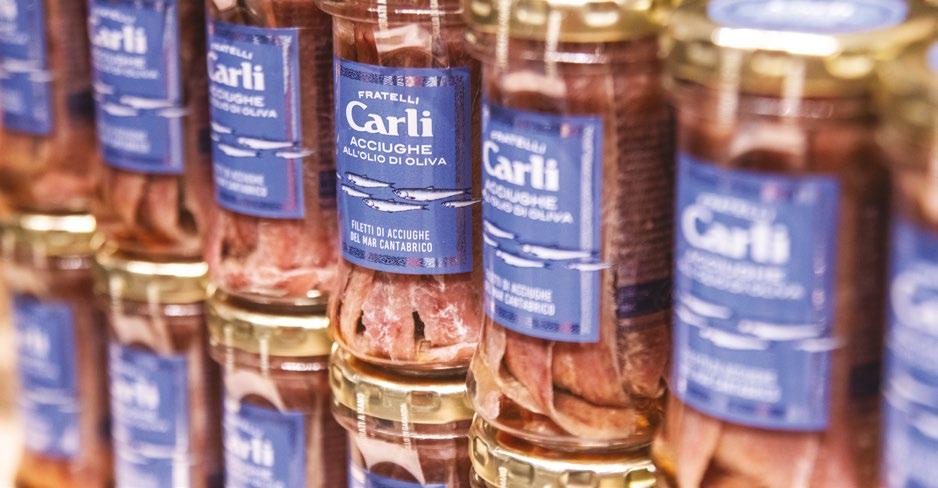
Specifically, more than 60 LCSA carried out periodically with the District suppliers on both products and material enable the identification of the improvements implemented by the supply chain throughout their life cycle.
The outcomes of these assessments offer an overall vision of the impact of the products –divided into two categories, finished food products and packaging – during the various phases of their life cycle:
• production;
• distribution
• use;
• end of life
With regard to the 4 sustainability principles:
• systematic increase in the concentration of resources extracted from the Earth’s crust;
• systematic increase in substances produced by society;
• deterioration of nature caused by physical means;
• systematic barriers regarding the integrity, competence, influence, significance and impartiality of people
The Fratelli Carli District shows mostly white fields, indicating full compliance with the sustainability principles. The yellow fields indicate an impact that is being mitigated, while the red fields indicate areas that require attention and must continue to be worked on. The most critical areas typically regard the extraction of fuels from the Earth’s crust, and the distribution phase.
This approach has allowed the District to constantly improve its sustainability performance, with 4 companies in the supply chain becoming B Corps or Benefit Corporations.
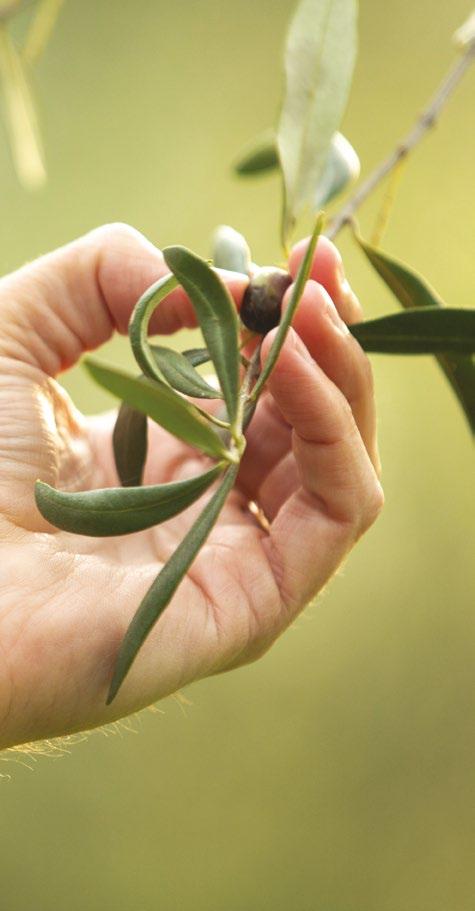
a “Benefit” spirit
The challenge we have faced
Since 2013, we have shared a Goodness Code with all our suppliers of finished products, components and services. This document identifies our shared values, commitments and objectives in terms of sustainability, and has allowed the entire District to develop and grow together, constantly setting new targets.
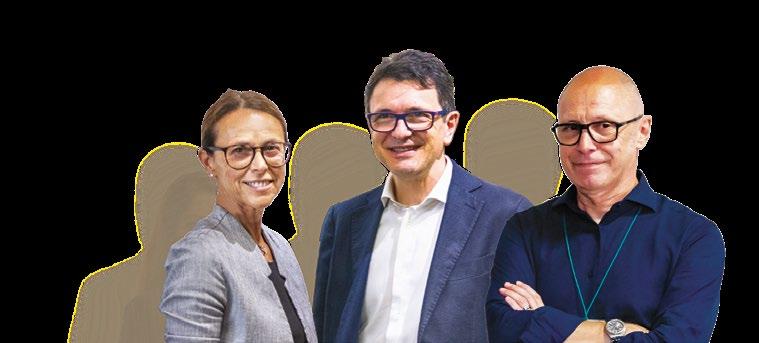
With this spirit, during 2023, we embarked on a challenging, innovative project, with the ambition to create a Benefit District, inspired by the principles and the structure of Benefit Corporations.
The change we have made
Together with the more than 60 supplier companies that make up the District, we have identified a series of “Common Good Purposes” able to consider the key areas of our business: production, employee well-being and use of resources.
During the most recent “Goodness Day”, the annual encounter held in our premises in Imperia, we worked with the more than 100 representatives of the companies in the District, using specific teamwork methods, to identify the actions to be implemented to positively impact each individual Common Good Purpose.
More than 100 representatives of the companies in the District during the most recent “Goodness Day”
We design and create products, defining their social and environmental criteria and complying with them at every stage of the process.
At the end of the working day, a vote was taken on the top 5 actions:
• an Ethical Code governing raw materials and finished products;
• a tool for the exchange of information on the impacts of production;
• a collection of the virtuous practices aimed at employees;
• a sustainable “market” for the District;
• a permanent round table for energy.
We guarantee the wellbeing of our employees safeguarding their health and safety in the workplace and extending the range of welfare services. We strive to promote an inclusive working environment, respect the diversity of those who work with us and offer valid professional development programs.
We guarantee the use of economical, reliable, sustainable and modern energy systems
We pool ideas for sustainable innovation in the District. Outside of it, we raise awareness among our suppliers, collaborators, employees and customers regarding the pursuit of all the shared objectives of the 6 SDGs in the District.
teamwork with the World Café technique
This truly challenging project has enhanced and strengthened our relationship with our supply chain, making us not just suppliers and purchasers, but indeed partners in our desire to make a positive impact on the world
This unprecedented collaboration, which we have a strong faith in, will continue throughout 2024, with the themed Working Groups that will be tasked with shaping the 5 actions that received most votes from the District.
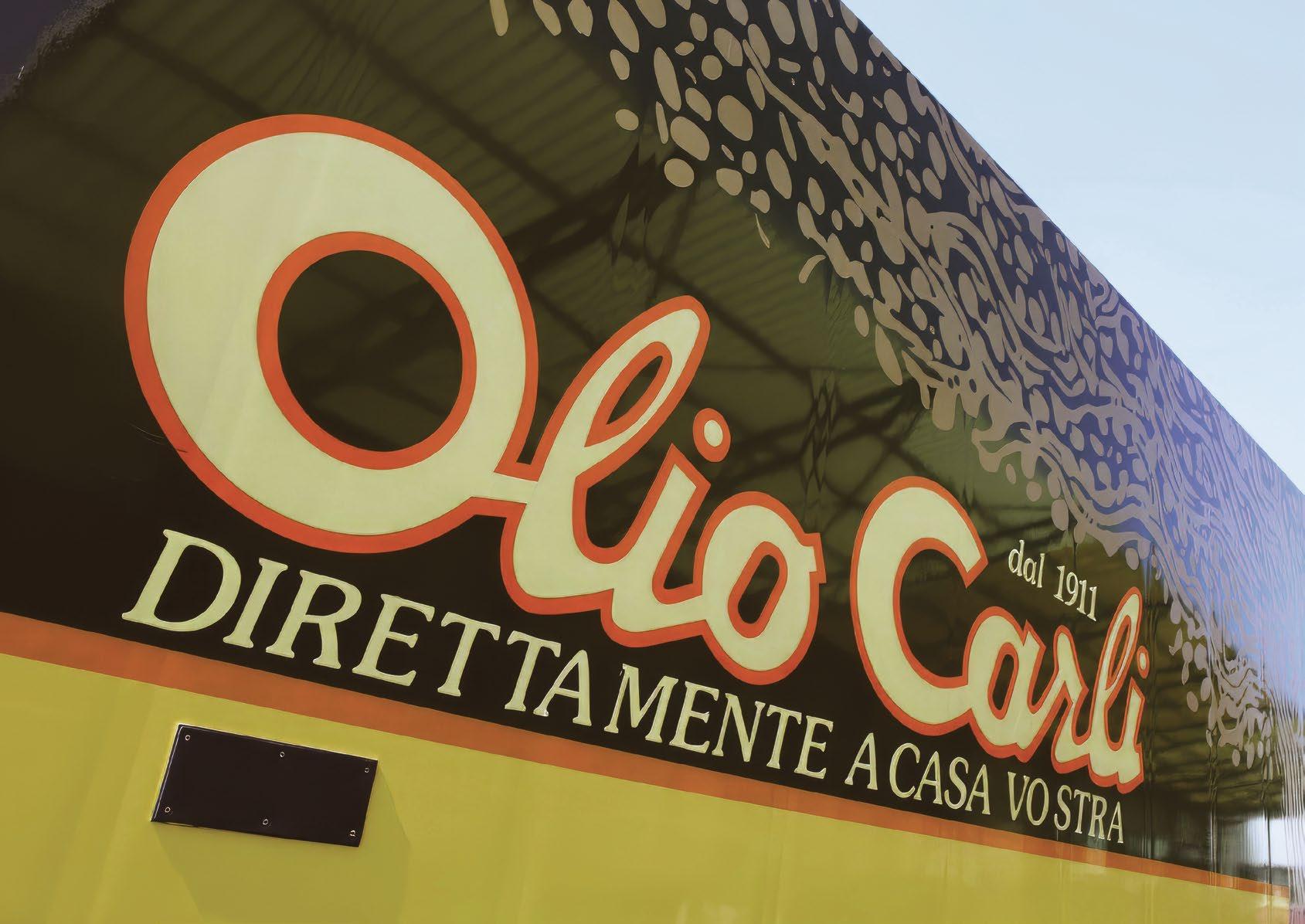
To complete the supply chain sustainability process, Fratelli Carli has also brought on board its delivery drivers, the jewel in the crown of the company’s distribution logistics, drawing up a “Delivery Code” with the aim of reducing consumption and emissions, by working together on two main fronts:
• sharing virtuous practices for the driving and maintenance of the vans;
• monitoring checklists regarding the shared objectives the the Code and the reference SDGs.
The monitoring envisaged in the Code of the application of good practices and their impact on reducing consumption forms the base of an important project aimed at offsetting all the emissions deriving from Fratelli Carli delivery logistics
The entire transport chain has been fully involved in the achievement of this objective, and trained, during a series of dedicated encounters, on the calculations made to determine the total amount of climate-altering emissions, the importance of sustainable driving practices in constantly reducing emissions, and the ways chosen to offset emissions.
More than
self-employed van drivers involved in our Transport District
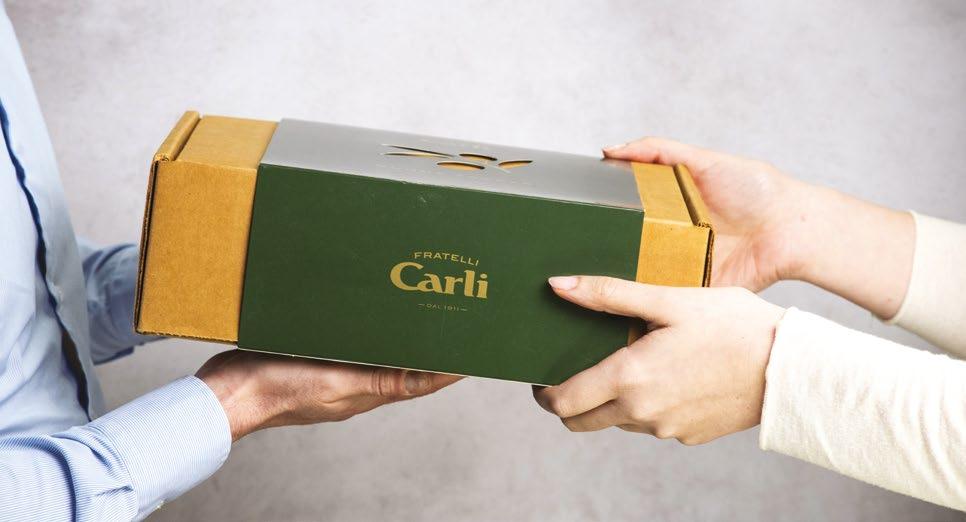
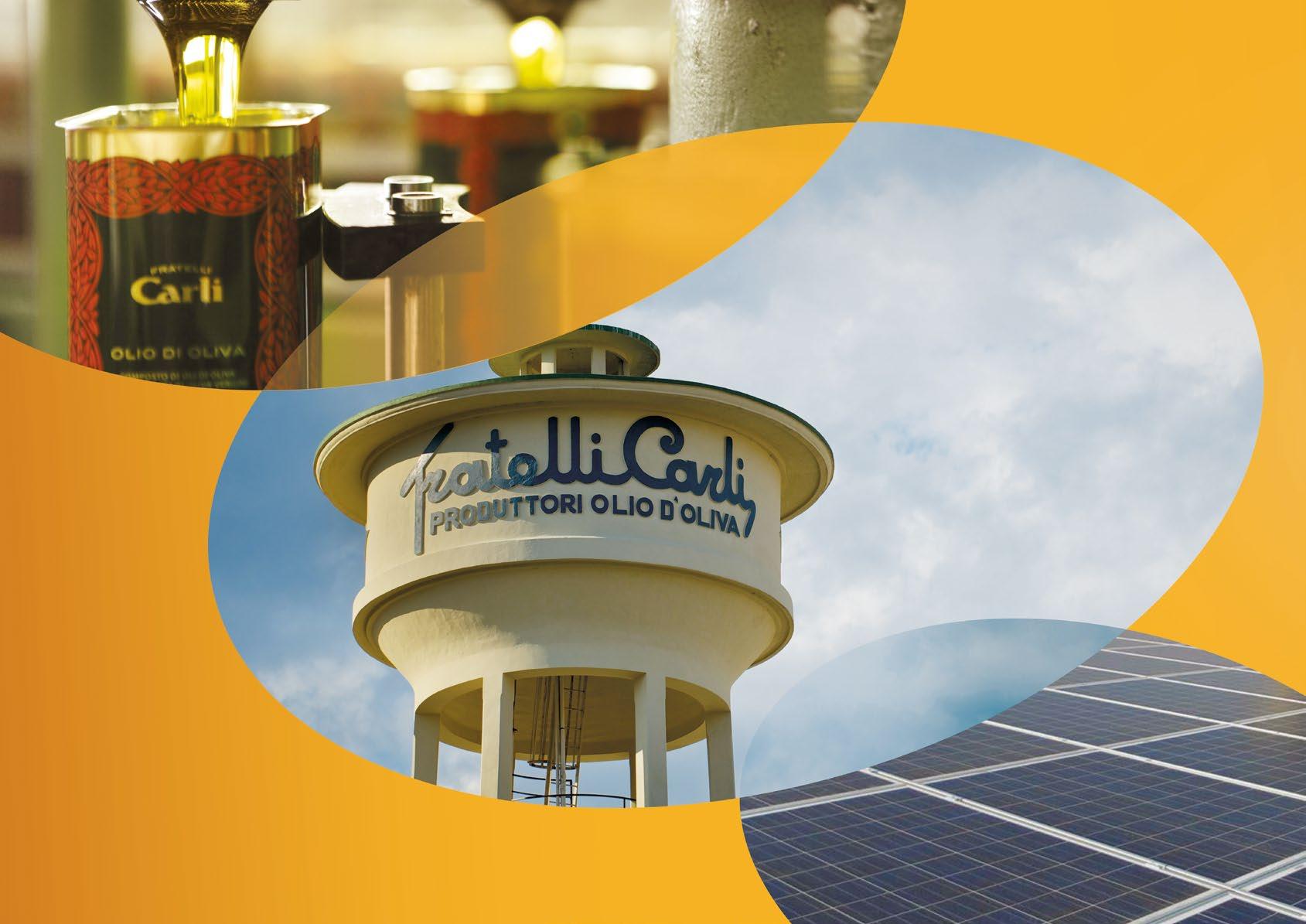
Waste is disrespectful, so we have always avoided it
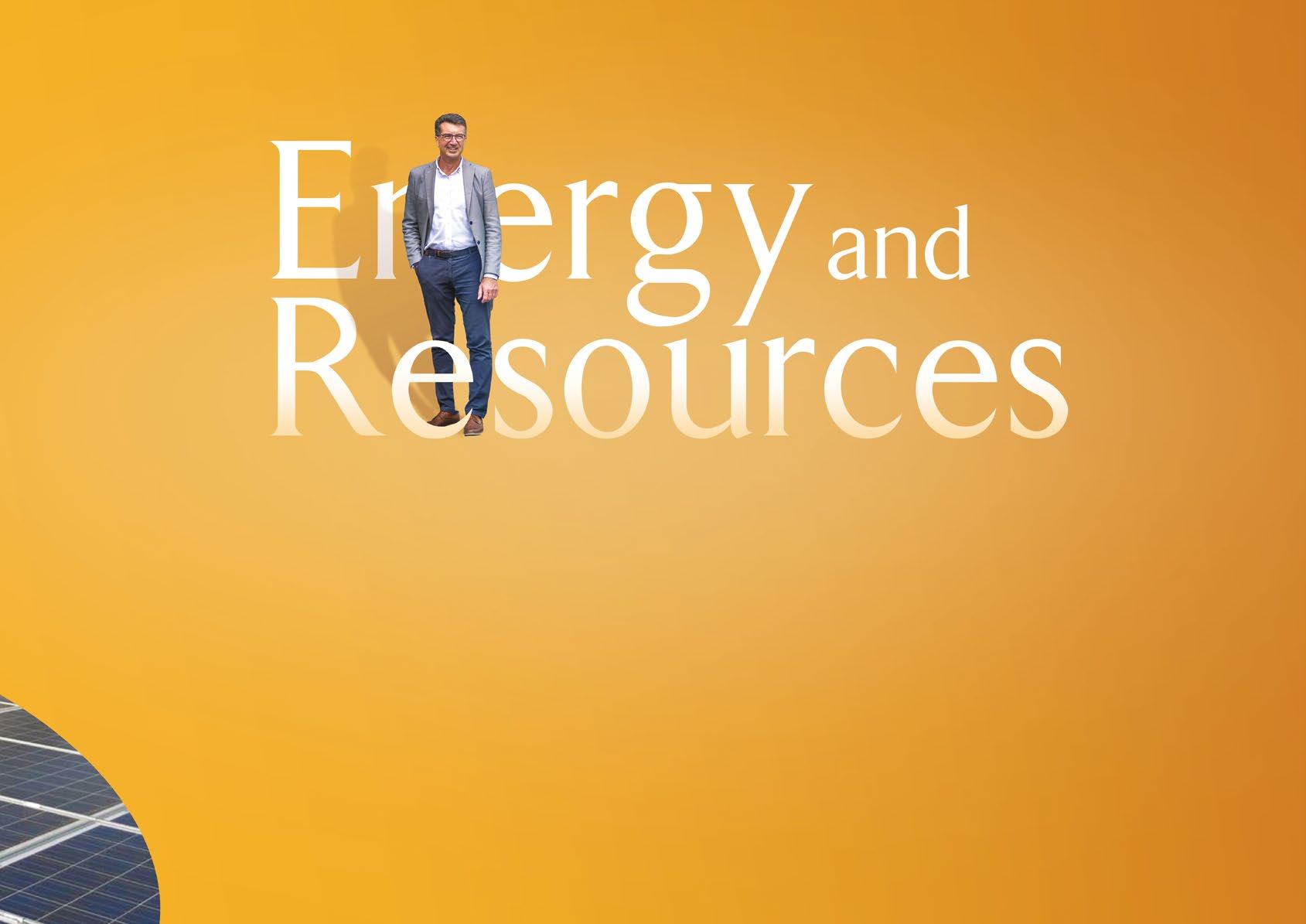
We are committed to constantly reducing our energy footprint during the production and logistics phases. On the production front, we have created a model for saving and for reducing our carbon footprint based on a synergy created through three essential actions: the use of electrical energy derived entirely from renewable sources, self-production of energy through a photovoltaic plant and actions aimed at reducing consumption.
Federico
Calzamiglia Operations Manager
• Updating and validating Scope 1, Scope 2 and Scope 3 emissions inventories.
• Defining measurable actions to mitigate the company’s impact on climate change.
• Implementing and extending the scope of the new integrated safety and environmental management system
• Offsetting the environmental impact of all home deliveries in all countries served.
• Designing an Ecodrive course for our primary transport drivers
• Maintaining the figure of more than 90% of total waste recovered
2023 Highlights
ENERGY AND
of electric power from certified renewable sources 100% of waste sent for recovery out of total waste 89% of CO2 emissions generated by the entire delivery logistics process in Italy and abroad that will be offset 100% kWh of electrical energy produced by our own photovoltaic plant 987,867 decrease in the index of waste generated on the value of production in 2023 compared to 2022 2% of total Co2eq Scope 1 and Scope 2 emissions -26% of self-produced and consumed electricity from renewable sources compared to total electricity consumed 19% tons of CO2 (Scope 1 and 2) per million of turnover 17
The
attention Fratelli Carli pays to energy
With the aim of optimizing energy consumption, the company carefully monitors. and regularly reports on the use of fuels, gas and electrical energy, by carrying out an energy diagnosis. This was updated again in 2023 with the 2022 performance data.
The efforts Fratelli Carli has been making for years now to reduce its energy footprint at all stages of the process brought effective results in terms of energy efficiency once again in 2023.
This process allows for an accurate analysis of the company’s energy performance, and the identification of any areas for improvement.
The two-year period 2022-2023 saw a constant decrease in energy consumption, thanks to Fratelli Carli’s on-going efforts to optimize systems and processes. Specifically, consumption fell from 45,009 GJ in 2020 to 33,993 GJ in 2023.
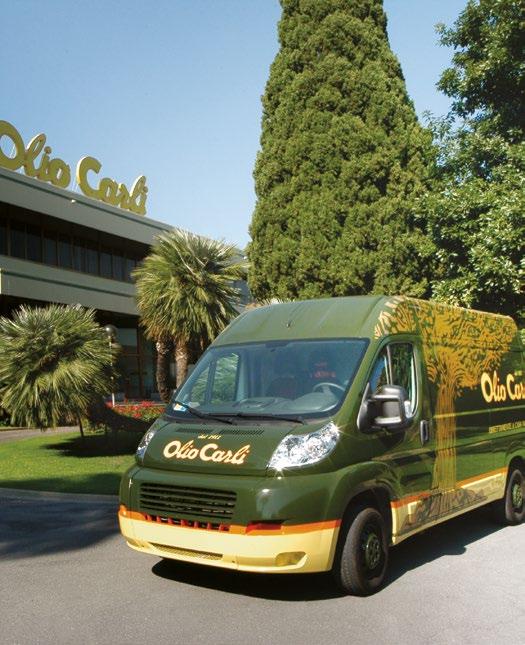
-26% of total CO2eq Scope 1 and Scope 2 emissions
The most significant reduction in consumption was recorded in natural gas (-39%), because the refinery activity was limited to the first months of the year.
Most of the company’s energy consumption was in the form of natural gas –used for the oil refining processes, and to a marginal extent for heating - and electrical energy
Electrical energy accounts for over a third of total energy consumption, and in line with previous years, Fratelli Carli has continued to pursue a sustainable energy strategy, using 100% electrical energy from renewable sources.
Of this total, 80% was accounted for by electrical energy purchased and consumed, while the remaining 20% was self-produced using the 5000-square-meter photovoltaic plant installed on the roof of the factory in 2012.
This plant produces an average annual total of 977.000 kWh and also makes a positive contribution to sustainable power use outside the company. The proportion of energy produced and not consumed (about 11%) is channeled back into the power grid. This amounted to 111,495 kWh in 2023, contributing to the reduction of the country’s energy mix.
Fratelli Carli’s commitment to lowering energy consumption has also had a positive impact on our greenhouse gas emissions. In 2023, in line with the trend for the previous year, the company succeeded in lowering its Scope 16 emissions, which include direct emissions deriving from sources owned or controlled by the company, from 1,767 tons of CO2eq to 1,319 tons of CO2eq (-25%)
The strategy of using electrical energy entirely from renewable resources also allows the company to have zero Scope 2 Market-Based7 emissions. In line with previous years, the company continues to seek to reduce its impact in terms of overall emissions (Scope 1 and 2), going from 3,150 tons of CO2eq in 2022 to 2,425 tons of CO2eq in 2023, a reduction of 26%.
(tCO2eq)
1 Scope 2 (Location based)
6 Scope 1 emissions are direct emissions of greenhouse gas from sources within, or controlled by, the company.
7 Scope 2 emissions are indirect emissions of greenhouse gas due to energy consumption from sources not within, or controlled by, the company. These emissions are Scope 2 emissions calculated using the market-based method, where, for energy produced and consumed via photovoltaic panels and for the energy purchased and certified as renewable (e.g. with ‘certificati verdi’ or green certificates), a factor of virtual emission of zero is adopted.

Paolo Arimondi Contract Management and Maintenance Manager
The production of clean electricity through the photovoltaic system installed at the Imperia plant allowed for a reduction in emissions of a total of 451 tons of CO2eq that would have been emitted into the atmosphere for the production of an identical amount of energy using fossil fuels. The emissions avoided trend perfectly mirrors the trend relating to the self-generation of electricity with photovoltaic panels.
In addition, in order to monitor and understand the magnitude of the carbon footprint deriving from the activities outside of the company along the entire value chain, for the planning of effective management strategies, Fratelli Carli has quantified the indirect, i.e. Scope 3 greenhouse gas (GHG) emissions that occur upstream from the organization. This measuring and reporting process, which began in 2021 and was completed in 2022, and also continued in 2023, follows the requisites of the GHG Protocol, the most widely recognized methodology guide on the issue. The protocol identifies 15 indirect emission categories, both downstream and upstream from the organization. Those included in the Fratelli Carli inventory, for their significance for the company, are listed in the table below.
Scope 3 Category Description
Goods and services purchased
This category includes all the upstream emissions (from the cradle to the gate) deriving from the production of products purchased or acquired by the company. Products comprise both goods (tangible products) and services (intangible products). 2. Capital goods
This category comprises emissions deriving from the extraction, production and transport of capital goods purchased or acquired by the company during the year considered.
451 tons of CO2 saved through the photovoltaic system
Activities connected with the consumption of fuels and energy
This category comprises emissions relating to the production of fuel and energy purchased and consumed by the company that are not included in the categories of Scope 1 or Scope 2. They are the upstream emissions of fuel and energy.
Scope 3 Category Description
Upstream transport and distribution – inbound
Upstream transport and distribution – outbound
1. Transport and distribution of products purchased during the year considered, carried out by third-party suppliers or by Fratelli Carli using vehicles it does not own or manage;
2. Third-party transport and distribution services purchased by the declarant company in the year under examination (directly or via an intermediary), including inbound logistics, outbound logistics (of products sold, for example), and the transport and distribution of third parties within company facilities.
5.
Waste generated by the company
6.
Business travel
Activities connected with the consumption of fuels and energy 0.65%
7.
Work-home journeys
Emissions deriving from the disposal and treatment of waste by third parties generated during operations belonging to or controlled by the declarant company.
This category includes emissions deriving from the transport of employees for business travel, in their own vehicles or vehicles managed by third parties, such as airplanes, trains, buses and cars.
This category includes emissions deriving from the transport of employees from home to work, in their own vehicles or vehicles managed by third parties, such as cars, buses and trains.
Fratelli Carli’s climate-altering emissions are mainly linked to indirect activities classified as Scope 3, amounting to 95% of the total. With regard to the Scope 3 categories reported on, the greatest impact is in Category 1 (Goods and services purchased), which includes the emissions incorporated into the raw materials, packaging and finished products purchased by the company, and in Category 4 (Upstream transport and distribution), regarding transport upstream and downstream of the production activity carried out in the company. Overall, the figure is down 29% compared to the previous year, as a result of the drop recorded in the purchase of raw materials, waste produced and upstream transport and distribution activities (the impact of which in terms of emissions fell by 38%). Impact has also been reduced thanks to Fratelli Carli’s awareness-raising efforts aimed at the self-employed delivery drivers. The category 2 figure is also 70% lower than the previous year, as a result of significant investments recorded in 2022, linked, for example, to the purchase of a new warehouse and the leasing of new machinery for the packaging lines, which were not necessary in 2023.
The quantification of Scope 3 emissions is an important step on the path towards climate change impact mitigation embarked on by Fratelli Carli in 2021. Mapping the impact generated by the activities upstream and downstream from the company has allowed us to highlight the areas it is most important and urgent to act on.
Starting from 2022, Fratelli Carli has focused its strategic efforts for the management of CO2 emissions specifically on the impact of its delivery logistics in the Italian market, followed by the overseas market, starting from 2023.
This has been made possible first and foremost by bringing on board the self-employed van drivers exclusively entrusted with delivering Fratelli Carli products directly to customers’ homes.
The company has been sharing the “Transport Code” with them for years, and has embarked on a process of raising awareness of good driving practices that help to reduce emissions and environmental impacts at least in part.
100% of CO2 emissions offset for all the delivery logistic in Italy and abroad in 2021 and 2022
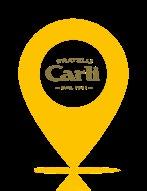
A calculation was thus made of the total CO2 emissions generated by the entire delivery logistics process, regarding both primary transport from Imperia to the warehouses and secondary transport from the warehouses to customers’ homes, in Italy and abroad, and to the Emporiums.
Lastly, Fratelli Carli has embarked on a process to offset emissions by purchasing an amount of “carbon credits” equal to the amount of CO2 emitted for the following operations:
• deliveries for the Italian market for the year 2021, offset with 1,230 credits purchased;
• deliveries for the Italian and overseas market for the year 2022, covered by 1,230 credits purchased.
The projects chosen for offsetting emissions focus on the production of energy from renewable sources, and the financial support from the sale of the credits helps them to continue. Thus, the emissions generated for all Fratelli Carli deliveries in the years 2021 (Italy) and 2022 (Italy and abroad) have been offset in full. To continue along this path, the company has undertaken to purchase the credits necessary to offset the outbound logistics for both Italy and abroad once again for 2023, based on the results presented in this Report.
Waste management has always been a priority for Fratelli Carli. This commitment involves all the people who work for and with us and the companies we come into contact with right along the value chain. Proper waste management and the responsibilities related to it are governed by a specific procedure, which is constantly implemented and updated to incorporate any changes to the production process and to comply with the requisites established by the pertinent legislation in force. This commitment is part of the actions Fratelli Carli takes to prevent possible damage to the environment and its biodiversity, with the awareness that any introduction of exogenous substances into the environment – caused, for example, by inappropriate waste disposal - can have a negative impact on the ecosystem.
In recent years, Fratelli Carli has conducted a detailed analysis of all the activities that generate “waste” and/or “scrap”, in order to obtain a classification and characterization of such materials. This process has enabled the identification of appropriate ways to manage the waste produced and the preparation of dedicated areas for the temporary storage of special waste and for separate urban waste collection. For the latter, the company hosts waste collection areas termed “isole ecologiche” to collect and appropriately separate the waste produced before it is given over to the public waste collection service.
The waste produced by the company is largely of the non-hazardous kind. Specifically, the main categories are:
• packing materials such as paper, glass, plastic, wood and metal;
• soapstock;
• water and sludge from olive milling operations;
• food waste;
• bleaching earths for filtering;
• edible oils and fats.
Fratelli Carli actively undertakes to monitor the operations of its suppliers that play a part in managing waste (hauliers, waste disposal companies and intermediaries). When defining contracts, the company considers the authorizations of each supplier, and while working with them, monitors their compliance with the measures established in the various local and national regulations.
As part of our ongoing improvement, Fratelli Carli trains and informs all relevant personnel and collaborators to ensure they pay the closest of attention to the correct application not only of legal provisions but also of inhouse procedures, so that everyone is more attentive to how waste is managed. To this end, we conduct awareness-raising and information campaigns on how to prevent the production of waste and how to dispose of it correctly.
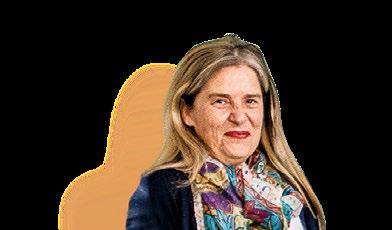
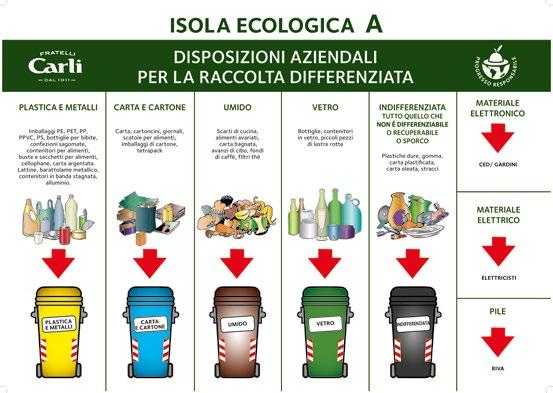
Waste disposal areas have been set up in the company to ensure proper waste separation
For a preventive approach to the production of waste, the company has adopted several actions in recent years that have led to a significant reduction. These actions were developed not only in-house but also upstream and downstream from the value chain of the organization.
Upstream of the organization
• engagement with all our suppliers regarding the issue of waste reduction and the various solutions implemented along the supply chain.
Downstream of the organization:
• mapping of all the packaging materials, so as to accurately quantify their end-of-life impact and identify areas for intervention and improvement.
In-house:
• lighter packing materials;
• redesigning of packs with a view to cutting the use of plastic and multimaterials;
• dematerialization of communication.
Waste for recovery and disposal (Kg)
-47% total waste generated in 2023
89% of waste sent for recovery out of total waste
Fratelli Carli sends most of its waste for recovery and recycling. In the two-year period 2022-2023, there was a decrease in the amount of waste, thanks to the ongoing commitment of Fratelli Carli to preventing waste production, and also to changes in the oil market, which during the year experienced a slowdown in production. The main categories of waste where a reduction has been observed are: paper, plastic, aluminum, waste from olive milling operations, and laboratory solvents. In these conditions, the amount sent for recovery now accounts for 89% of the total waste produced, down 4% compared to the previous year.
The soapstock and greasy earth derived from the production process are submitted for assessment to the National System for the Certification of the Sustainability of Biofuels and Bioliquids. If considered compliant, instead of being disposed of as waste, they are assigned for use as a useful raw material for the production of biofuels, pursuant to current regulations.
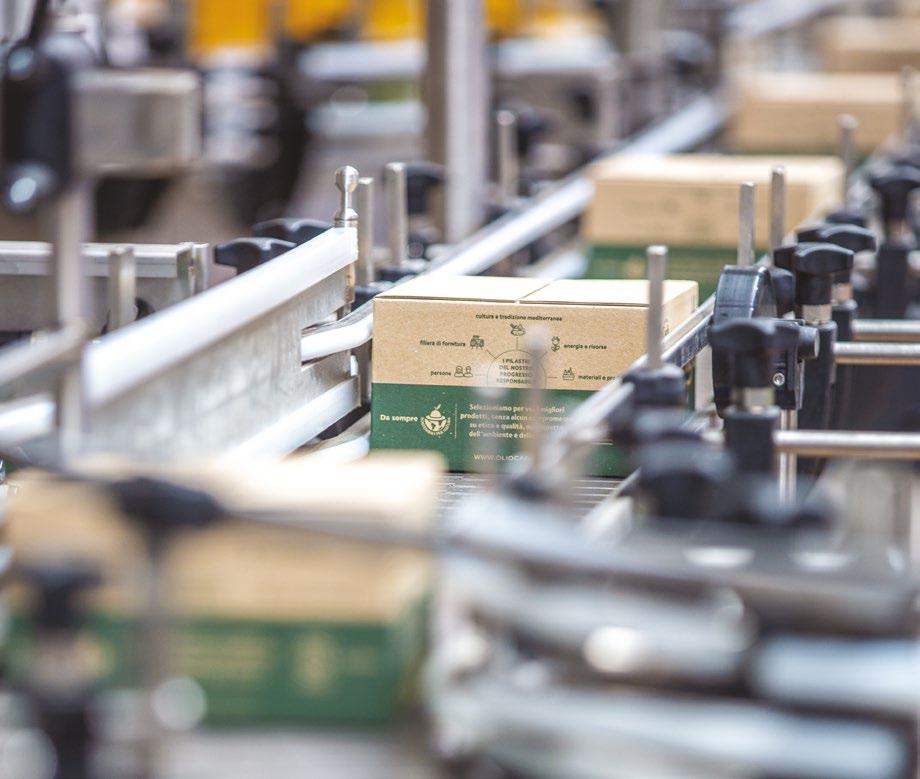
The design of a new warehouse offers a place to develop sustainable innovation
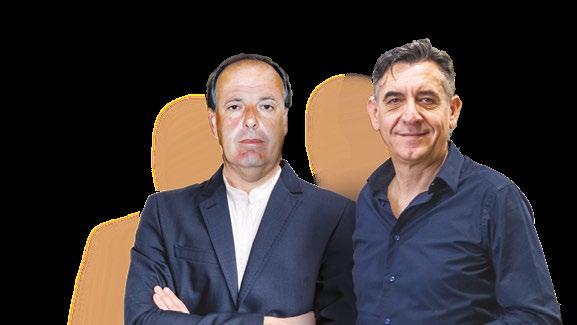
The challenge we have faced
When we started working on the design of our new system for labeling, boxing and palletizing for our specialties sold in jars, it became immediately clear that this could offer a major opportunity for change. Looking beyond the strictly industrial aspect, we reflected on how it could impact almost all of our Pillars of Sustainability: from Energy to Materials and Products, as well as the Supply Chain and People.
The change we have made
An in-house round table was set up, with a team involving the Technical Office, the Warehouse Managers, the Product Marketing Department, the Purchasing Office, the Logistics Department, our delivery drivers and suppliers. The aim is to optimize and simplify, by monitoring the flow of each process connected - upstream or downstream, inside or outside of the company –with the new system.
More than 3,5 quintals of inks avoided 46 tons of cardboard saved -50% inbound journeys by suppliers
We have worked on a complete redesign of our packs, moving from more than 60 customized packs using inks and paint, for each product to just 5 different types of boxes. Each of these features an innovative new technical design, in a single color and with graphics referring to sustainability. Customization with the name of the product can now be done in-line, thanks to an innovative laser engraving process.
The results obtained thanks to our redesign efforts:
• more than 3.5 quintals of inks avoided every year
• approx. 46 tons of cardboard saved every year. We have adapted our organization, processes and inbound logistics so that the new system can also work with all the projects in jars that were already boxed on arrival.
The result obtained with our reorganization efforts:
• -50% inbound journeys by suppliers
Finally, both in-house and from all our suppliers involved, we have collected extremely detailed information for the purpose of using a Life Cycle Assessment (LCA) to reliably measure the improvement obtained by our project in terms of environmental impact.
The outcome of our assessment confirms the success of the team’s efforts:
• -40% environmental impact of the new packaging, in all the categories taken into consideration in the LCA*.
This was a particularly complex challenge, because it was not easy in each area to strike the right balance between operational efficiency requirements and positive impacts in terms of sustainability, and there was no guarantee we would succeed.
The close collaboration among all the parties involved, the clear objectives focused on our Pillars of Sustainability and the courage to adopt innovative approaches were the real turning point of this “sustainability story”. The obstacles faced and the success factors we have highlighted also made this project a storytelling tool we have used in our in-house sustainability training, resulting in engagement and attention that exceeded our expectations
*Impact categories and results of the study
As part of its ongoing improvement initiatives, Fratelli Carli undertakes to promote and support all the actions necessary to protect the environment and occupational health and safety. It is to this end that the company decided, in 2022, to adopt an Integrated Environmental and Safety Management System, implemented based on the requisites of the UNI ISO 45001:2015 standard and the INAIL guidelines (UNI-INAIL). This system allows us to constantly verify and improve the environmental and safety performance of the organization and guarantee on-going efforts and evaluation of compliance with the applicable regulatory obligations.
The structure of the Integrated Management System is based on the definition of an Integrated Policy, the latest version of which was issued in September 2022 and which illustrates the principles and guidelines of the Integrated Management System, as well as the main environmental and safety objectives.
Specifically, the Integrated Management System controls and monitors the environmental aspects considered significant based on the outcome of the materiality analysis, by drawing up procedures and instructions aimed at defining responsibilities and means of control.
In 2022, Fratelli Carli adopted an Integrated Environmental and Safety Management System.
The integrated policy is inspired by the founding principles of the company and the common good purposes set out in the Articles of Association, and is an integral part of Fratelli Carli’s management and operating choices.

Pursuing the implementation and improvement of sustainable practices and raw material savings, over the years the refinery has undergone major innovations that have allowed us to save about 3 liters of water per kilo of olive oil processed.
Fratelli Carli has always paid the utmost attention to water consumption, and is committed to monitoring and controlling water quality, both inbound and outbound, as required by law.
Compliance with the limits in force for drainage into the sewerage system is constantly monitored by means of periodic analyses carried out on pollutant loads, comparing them with significant parameters. For this reason, a continuous sampling device, a flow meter and a thermometric probe have been installed in the Imperia factory, next to the drain. The quality standards set and complied with for water drainage are those set forth in Legislative Decree no. 152/06.
For the analysis of the waste water, the company uses an external laboratory, which has always confirmed compliance with the limits established by law.
Furthermore, during the days the refinery is in operation, the company’s in-house lab is used to conduct daily voluntary checks on the water, to verify that the quality parameters (e.g. COD, PH, Phenols) are being complied with in full.
At the Imperia and Gazzelli plants, water processing systems have been installed for drainage into the receiving body, in compliance with the requisites established by current legislation. On the Imperia premises, the water used for processing passes through settling tanks for the separation and recovery of any oily parts present, while the vehicle wash water is channeled to a purification system and downstream filtering.
In the offices, the water, from the municipal aqueduct, is used for all the toilets and changing rooms. To improve water efficiency and reduce consumption, all the traditional taps have been replaced with taps that mix water with air, creating a smoother flow and reducing the amount of water used without affecting the water pressure perceived.
In addition, in all the offices and production areas, stations have been installed for the delivery of drinking water, included chilled water, which filter the water from the aqueduct further, as well as allowing for a significant decrease in the use of plastic bottles throughout the company.
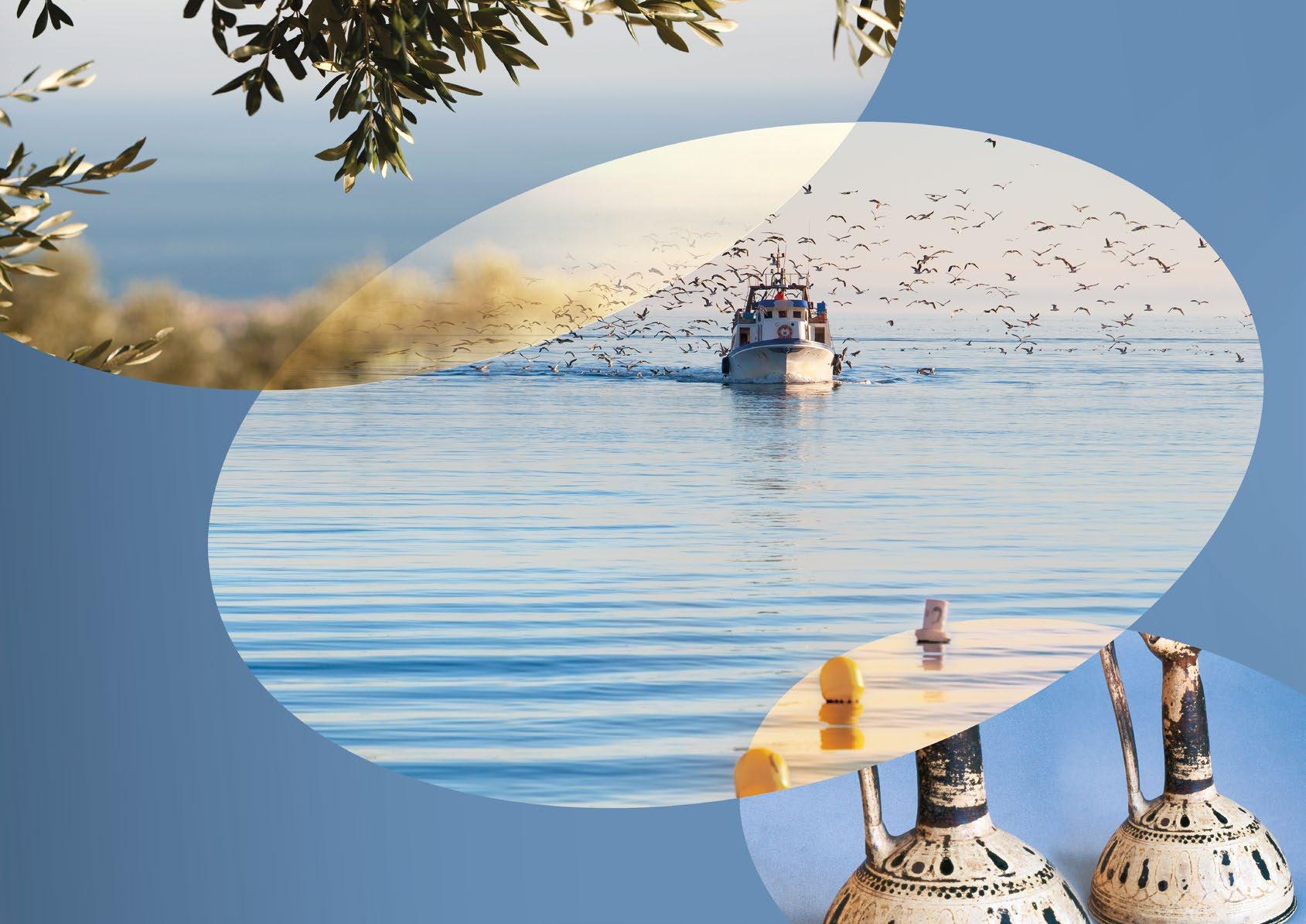
We have always endeavored to promote a culture of sustainability and healthy eating.
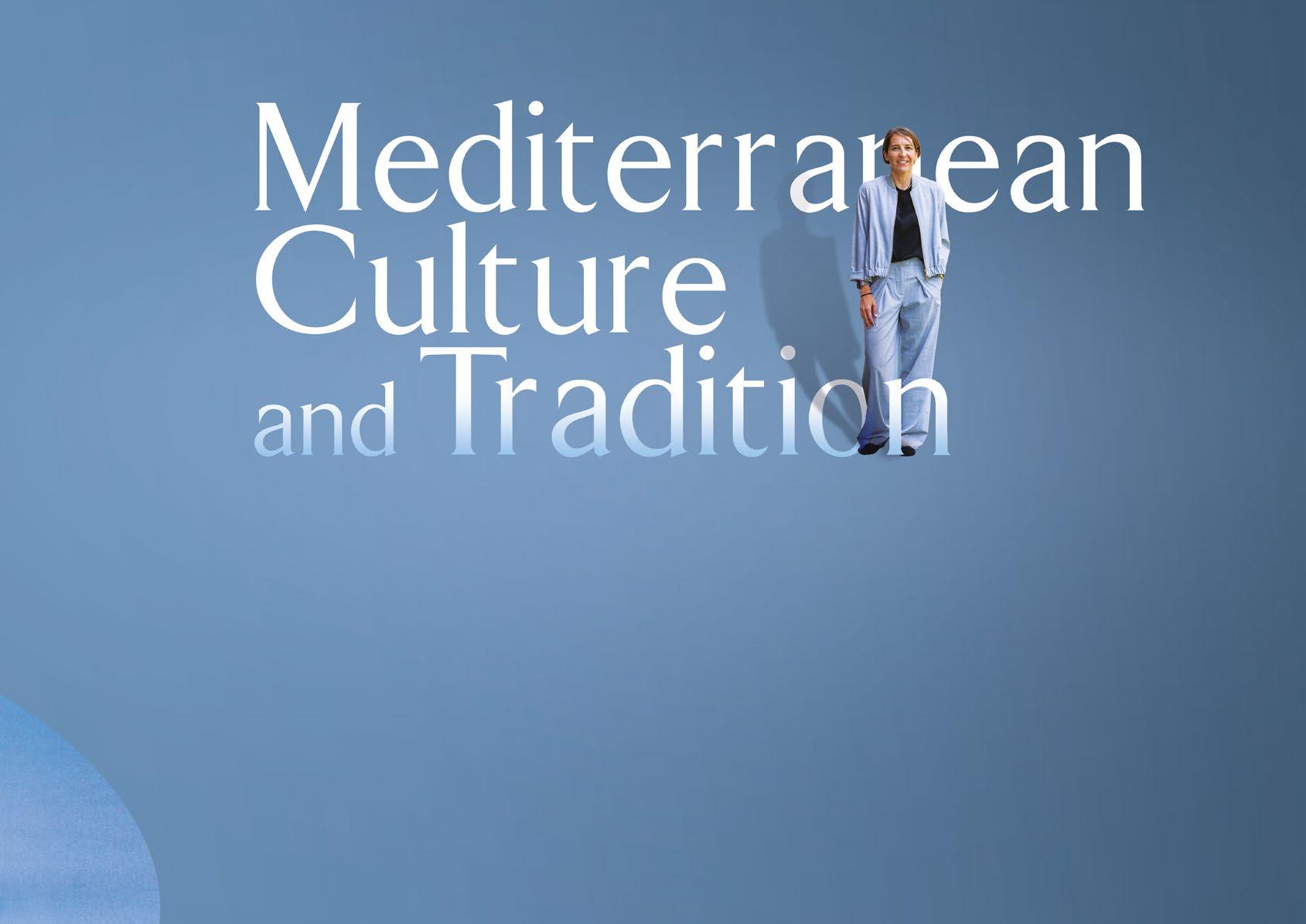
The olive tree and the precious oil it gives us are symbols of the Mediterranean: the heart and the root of the civilizations that gave birth to our world. This is where the passion and the mission of our enterprise stems from: the desire to help safeguard and transmit the traditions and knowledge that have created a food culture whose value is universally recognized.
Claudia Carli Head of Corporate Communications
• To spread the culture of olives and olive oil and the Mediterranean food tradition
• To spread the culture of Sustainability
CONTINUING
2023 2024 2025
CONTINUING
2023 2024 2025
2023 Highlights
CULTURE AND TRADITION
16,679
visitors to the Carlo Carli Olive Museum
+1,300 DEM messages on sustainability issues sent to customers
+4,846,000
students have learned more about their studies in the rooms of the Carlo Carli Olive museum
cooking courses held in the Emporium in Imperia 12 of the Emporiums provide information on sustainability 100%
Fratelli Carli is continually committed to sustainability and to spreading the concept of healthy eating through a series of activities in the areas of culture, tradition and sustainability.
“The Code -
–A competition for schools on food wastage
The company has worked along with Dentsu on the course they organized for high schools, entitled “The Code- Rise Up Challenge”. The classes taking part were called upon to create an advertising campaign starring Fratelli Carli, the focus of which was to respond to and support the 12th Sustainable Development Goal (SDG) of the United Nations Agenda 2030, which aims to reduce food wastage by half by the end of 2030.
Fratelli Carli is committed to promoting the culinary excellence typical of Italy, a traditional heritage of products and eating styles based on the Mediterranean diet admired all over the world.
The task gave all the participants the opportunity to look closer into the question. Strange though it may seem, there is not yet a single, clear definition of food waste, or a consistent, definitive method to approach the issue. The students looked at the FAO (Food and Agriculture Organization) classification that highlights two types of product wastage along the food supply chain:
1) food loss: a decrease in the quantity and quality of food (edible farming, forestry or maritime produce) due to decisions or actions taken along the food and farming supply chain, from production and harvest to storage and transport
2) food waste: a decrease in the quantity and quality of food (edible farming, forestry or maritime produce) that occurs during the distribution to consumers and retailers
Realizzata dagli studenti una Advertising campaign developed by students in support of the Sustainable Development Goal (SDG) of the UN’s Agenda 2030. 12°th
This theory formed the base on which the students constructed the Fratelli Carli advertising campaign, highlighting how the company can help promote increased awareness of good food consumption practices in order to avoid food wastage, encouraging everyone to adopt simple, responsible actions in their everyday lives and thus contribute to reducing the environmental, economic and social impact caused by food wastage.
Fratelli Carli’s commitment to raising awareness regarding a number of sustainability issues is directed at all its stakeholders, bringing them on board and informing them. For this reason, once again this year, the e-mail marketing plan included a plan exclusively focused on engaging customers further in the company’s commitment to responsible progress.
The information and ideas contained in the e-mail communications invite customers to reflect on sustainability issues that regard all the minor and major choices we make every day. This successful campaign has involved the sending of more than 4,260,000 DEM messages, and it will be continuing over the coming months.
than
4,846,000 DEM messages on sustainability issues sent to customers

The sustainability Information campaign in the Emporiums
The Emporiums offer a wealth of products and information, offering customers the chance to experience at first hand the special relationship between the company and its customers, based on trust, respect, transparency and communication.
A series of communication materials with a modern, immediate style have been studied with a view to developing and promoting the sustainable innovation process pursued daily in the company, helping customers to discover the wholesome flavor and superb quality of the products, as well as the comprehensively sustainable approach adopted by the company.
The challenge we have faced
Our history has earned us a benchmark position in the world of oil, which is a cornerstone of the Mediterranean culture and tradition we are committed to promoting and preserving every aspect of – so much so that this objective has become one of our five Pillars of Sustainability
The challenge we decided to rise to more than a year ago now involved creating an experience able to transmit all the rich, distinctive characteristics of this product, exploring all its secrets and illustrating the unique nature of the oil making process.
The change we have made
To design and create an experience able to allow us to share the olive oil culture with our customers, and to achieve a truly surprising result in sensory and emotional terms, we created a dedicated team within the company. This allowed us to pool all the skills and experience of our people and our family, adopting an agile method and innovative resources.

The ”Experience Map” allowed us to explore the various phases of the relationship between our company and its interlocutors.
The ”Experience Map” allowed us to explore the various phases of the relationship between our company and its interlocutors, analyzing, for each phase, the thoughts, expectations and needs in relation to the experience we were designing.
The ”Experience Map” allowed us to explore the various phases of the relationship between our company and its interlocutors.
”You are the Origin” is a unique experience, the result of this major effort
In our Emporiums, under the guidance of our professional taster, the head of the Federolio 1 panel, participants have the chance to discover, in a simple yet highly engaging way, the peculiarities and the rich experience of the olive oil world: the cultivars and their history, the different areas of origin, the secrets of oil tasting and the art of creating a perfect oil, skillfully blending the flavors and aromas of different oils… and each participant, as part of the sensory element in the experience, also has the chance, for a moment, to become a taster and to create their own unique, exclusive “blend” of oil
How to see the product that has been the center of our work for over a century through the eyes of someone who wants to explain its history and its distinctive characteristics and qualities, integrating the unique skills that have allowed the company to continue to grow.
The whole team has been able to bring on board and pool the specific professional skills of each individual, to design a unique activity and offer everyone the chance to learn more about the world of oil in an original, immersive way.
The Levels Pyramid was then able to use this analysis to create the structure of a project able to engage the mind, imagination, senses and emotions of participants.
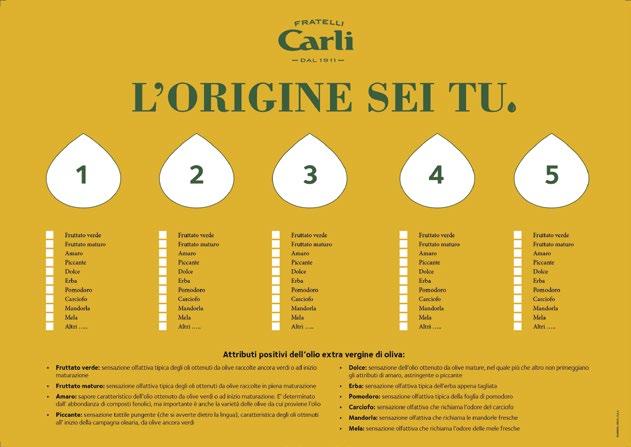
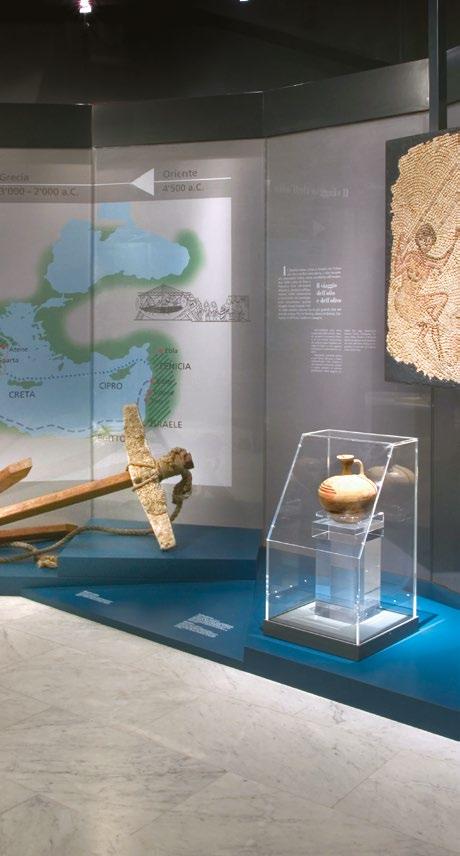
The Carlo Carli Olive Museum took part in the 22nd “Business Culture Week”, the theme of which this year was “People at the center of sustainable development. The soul of a responsible enterprise”.
The Carlo Carli Olive Museum, founded in Imperia by the Carli family in 1992, hosts one of the most important private collections in Italy of archaeological finds, rare objects, containers and oil lamps, as well as a fine library, all dedicated to the culture of the olive. The collection has been put together over many decades, and has also been declared of "exceptional archaeological interest” by the Archaeological Heritage Office of Liguria, and is protected by ministerial restrictions. Olives and olive oil played a key role in the history of the earliest civilizations, featuring in their food, art, culture, economy, customs, religion and cosmetics.
The Carlo Carli Olive Museum plays an important role in enhancing and promoting the tangible and intangible heritage of the olive and of olive oil, and in promoting the Mediterranean diet, recognized by UNESCO as part of the world’s Intangible Heritage.
Its keen awareness of this role prompted the Carlo Carli Olive Museum to take part in the Convention on the General Assembly of Industrial Archaeology, held in Rome in 2022, making a contribution to the “Cultural Industry” concept defined by UNESCO that is perfectly representative of the bond between the Fratelli Carli company and its Carlo Carli Olive Museum
In collaboration with the University of Genoa, the company also took part in the research project entitled “PatrimOlio culturale”, which took the form of a scholarship for a research PhD entitled “L’Olivo e l’olio a Bisanzio:dall’età classica a quella tardoantica tra mitologia, magia e religione” (Olives and Oil in Byzantium from the Classical Age to Late Antiquity: mythology, magic and religion). Based mainly on Greek texts, the aim of the research is to look into how the meaning and significance of oil and olives changed and evolved during the shift from the pagan to the Christian era, also by studying the texts and materials held in the Carlo Carli Olive Museum.
archives and museums of Italian companies brought together by Museimpresa
During 2023, the Carlo Carli Olive Museum’s membership of Museimpresa, the Italian Association of Business Archives and Corporate Museums, was consolidated and strengthened. Museimpresa brings together over 130 archives and museums of Italian companies, both large and small. This choice was made to make a practical contribution to the aims of the Association, which include preserving the memory of Italian industry and focusing on the importance of entrepreneurial skills as a driver of sustainable development. By joining the association, the company also seeks to help spread knowledge and experiences across the various museums, and to boost research and training activities in the field of museology and corporate archiving.
With this in mind, the Carlo Carli Olive Museum once again this year took part in the most significant activities of the Association: “International Museum Day” organized by ICOM, the “Bibliografia d’Impresa” for the creation of a shared bibliography that can be consulted online, the “Settimana della Cultura d’Impresa” (Business Culture Week) and the project “Itinerari Museimpresa” in collaboration with the Italian Touring Club.
Of particular importance was the participation of the Carlo Carli Olive Museum in the 22nd “Business Culture Week”, the theme of which this year was “People at the center of sustainable development. The soul of a responsible enterprise”.
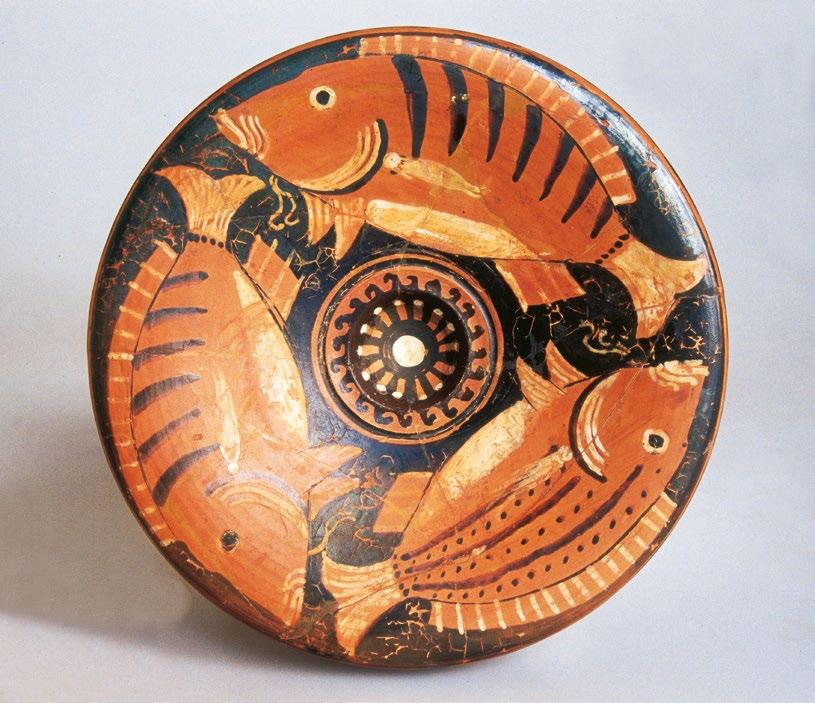
Scan the QRcode to learn about
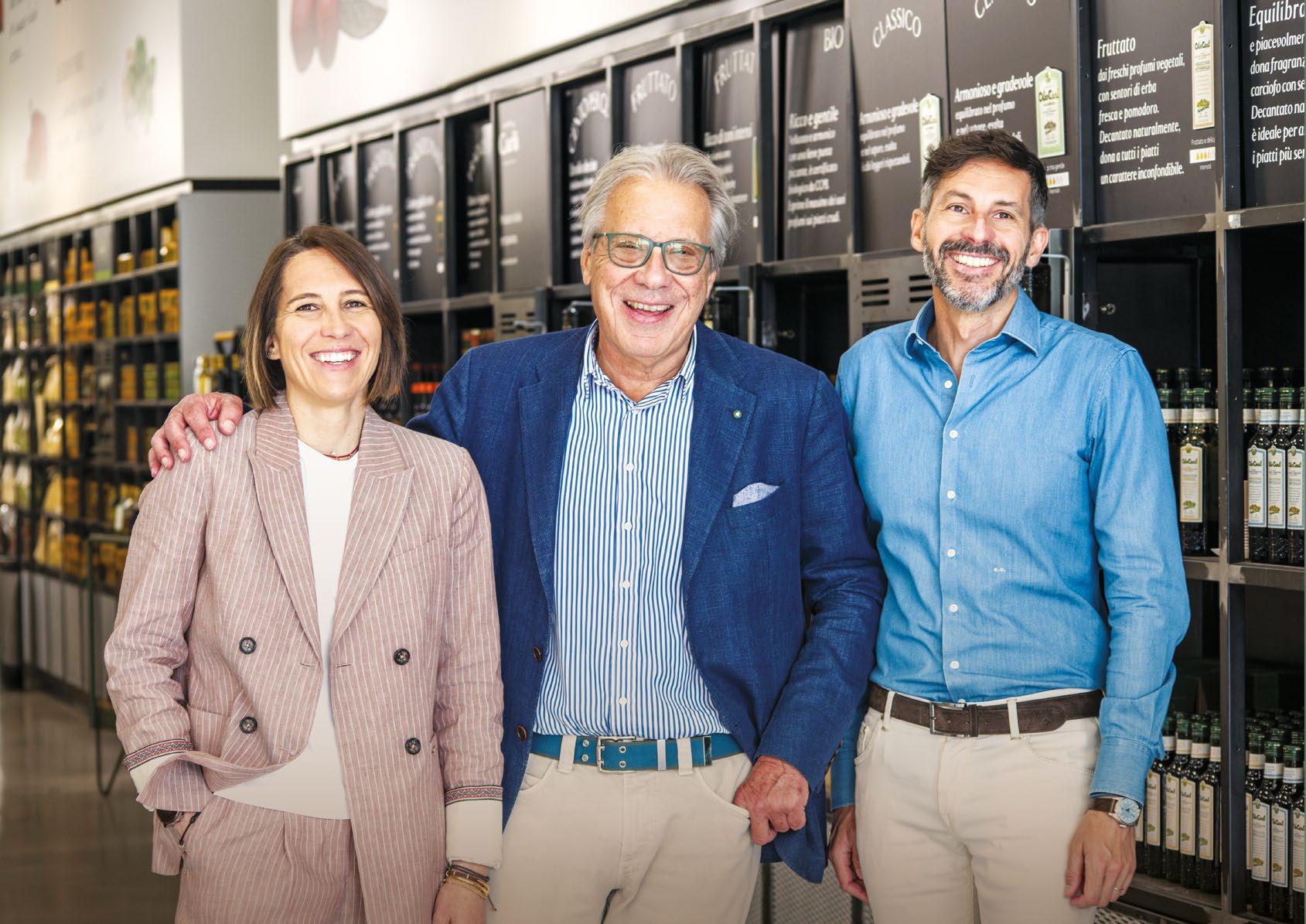
METHODOLOGICAL NOTE
This Sustainability Report has been prepared in accordance with the principles of balance, comparability, accuracy, timeliness, clarity and reliability, as defined by the GRI Standards.
This document was drawn up in conformity with the GRI – Global Reporting Initiative –Sustainability Reporting Standards published in 2016 and updated in 2021.
This Sustainability Report has been prepared with the “in accordance option”, in conformity with the principles of balance, comparability, accuracy, timeliness, clarity and reliability, as defined by the GRI Standards. The document highlights both strengths and weaknesses, as well as potential areas for improvement. The data collection and the reporting process were structured in order to guarantee comparability and correct interpretation of the information on the part of the main stakeholders with an interest in the evolution of performance. Furthermore, the company adopts the precautionary principle in all its activities.
In order to maintain an approach based on ongoing improvement, the strategic and management goals for the subsequent reporting years were defined, heading each section of the Report, together with the company’s sustainability highlights. At the foot of the document, in the “Appendix”, the tables and other data provide an in-depth account of the indicators linked to the material issues of Fratelli Carli.
Contextual analysis conducted for the purpose of updating materiality also enabled the company to focus on the challenges internationally acknowledged in the United Nations’ Agenda 2030, and to select 7 of the 17 Sustainable Development Goals (SDGs)8 on which Fratelli Carli can have the greatest impact, linking them to the company’s own sustainability goals.
Thus, the company focused on SDGs 3, 7, 8, 12, 14, 15 and 17. The sustainability goals indicated in each section of the Report are accompanied by the pertinent SDG icon.
8 On 25 September 2015, the 193 United Nations Member Countries unanimously approved the Global Agenda for Sustainable Development, with its 17 Sustainable Development Goals (SDGs), indicating 169 Targets to be reached by the end of 2030. Italy played a key role in negotiations and effectively committed to pursuing these international goals. Given the scale of the challenge, all public and private players are called upon to contribute within their own spheres of influence and action.
The scope of reporting includes the company Fratelli Carli S.p.A. S.B., with registered office in via Garessio 11, Imperia. With regard to aspects relating to energy consumption and relative GHG emissions, the data refer to the factory/ headquarters in Imperia, the factory in Gazzelli and the company’s own warehouses (Assago, Pognano). With regard to waste and water management, the data refer to the Imperia and Gazzelli sites.
For aspects relating to personnel, the data refer to the factory/headquarters in Imperia, the factory in Gazzelli, the warehouses owned by the company and the Emporiums.
This Sustainability Report is reviewed and approved in its entirety by the Board of Directors.
The information in the Report is based on data collected during the period from 1 January 2023 to 31 December 2023.
The following are the main methods of calculation adopted:
• Scope 1 direct emissions: for consumption of natural gas, gasoline, diesel and LPG, the emission factors taken from the table of standard national parameters of the Ministry for Environment, Land and Sea Protection (2020-2021-2022) were used; for refrigerant gas leakage from the air conditioning systems, the GWP provided by DEFRA (Department for Environment Food & Rural Affairs, United Kingdom) was used for the threeyear period 2021-2023.
• Scope 2 indirect emissions: Location-based: these emissions were calculated by multiplying the electricity purchased from the national grid by the emission factor taken from Confronti internazionali Terna based on Enerdata data –2018, 2019, and 2020 data;
Market-based: there are no such emissions (0), since the company uses only electrical energy from renewable sources and therefore the virtual emission factor is zero.
• Scope 3 other indirect emissions:
Category 1 – Goods and services purchased: emissions were calculated based on the amounts of materials purchased by the company, placing importance on their place of origin. A specific emission factor was attributed to each material, taken from the Ecoinvent data bank or from LCA studies conducted in-house and/or by suppliers. An evaluation was also conducted on the use of electrical energy from renewable sources on the part of suppliers, thus reducing the resulting emission factor, as well as the proportion of all types of materials recycled. Comprised within this category are the emissions deriving from water consumption. In this case, the emission factor was taken from the DEFRA data bank, as for the services purchased by the company.
Category 2 – Capital goods: for the calculation of emissions, the primary element considered are the goods identified as fixed assets by Fratelli Carli. Specifically, goods costing in excess of €10,000 were considered. In this case, DEFRA emission factors were used.
Category 3- Activities related to fuel and energy consumption: Emissions were calculated by multiplying the amounts of fuel, electricity and thermal energy by the pertinent upstream emission factors. In this case, consumption attributable to the warehouses not owned by the company and to the Emporiums was considered. The emission factors were taken from DEFRA.
Category 4 – Upstream transport and distribution: emissions relating to logistics are divided into: inbound materials, i.e. all the materials used as input for the production process; outbound materials, relating to the distribution of finished products and the delivery by self-employed van drivers. In both cases, the calculation was based on the distance travelled, the weight transported and the means of transport used (e.g. truck, train, ship). In some cases, the primary fuel consumption data were supplied by logistics service providers. Also in this case, the emission factor used was taken from the DEFRA data bank.
Category 5 – Waste generated by the company: based on the MUD (Environmental Declaration Form) and the respective EWC codes, the data are shown in kg and then combined with the emission factors from the Ecoinvent data bank, and to a marginal extent from DEFRA, regarding the processing of waste.
Category 6 - Business travel: emissions were calculated by considering the distance travelled (km) and the type of transport used by personnel for business travel. Distances were then multiplied by the specific emission factor taken from DEFRA. Please note that for stretches travelled by train in Italy, the average emission factor used was taken from the Sustainability Report of Trenitalia.
Category 7 – Work-home journeys: for this category, the valuation was based on the answers provided by Fratelli Carli employees in a questionnaire developed in 2020 to find out the distance they travel from home to work, and the means of transport used. The company believes that the information obtained from this survey remains current and accurately reflects how and how far our employees travel to work, so the data shown are based on the outcome of the questionnaire. The emission factors used were taken from the DEFRA data bank.
• Emissions avoided: emissions avoided were calculated by multiplying the total electrical energy produced using photovoltaic panels and expressed in kWh by the residual mix emission factor taken from AIB (Association of Issuing Bodies) 2021-2022-2023.
• Accidents at work :
rate of recordable accidents at work: ratio between the number of recordable accidents at work, not including accidents taking place while travelling, and the total number of hours worked, multiplied by 200,000;
rate of accidents with serious consequences (not including deaths): ratio between the number of serious accidents and the total number of hours worked, multiplied by 200,000;
rate of deaths resulting from accidents at work: ratio between the number of deaths due to accidents at work and the total number of hours worked, multiplied by 200,000.
The quantitative indicators that do not refer to any general or topic-specific disclosure in the GRI Standards, shown on the pages indicated in the Content Index, were not the object of a limited examination on the part of EY S.p.A.
SUBJECT MATERIAL ISSUES
People Employees’ safety and rights
Personal well-being and development
Diversity and equal opportunities
Customer satisfaction and safety
Materials and products
Food safety
Product quality and excellence
Sustainable materials and product eco-design
Supply chain
Responsible supply chain management
Enhancing local communities
Energy and resources
Climate Action
Reduction of production footprint
Mediterranean culture and tradition
Ethical business conduct
GRI STANDARD
GRI 403: Occupational health and safety
GRI 406: Non-discrimination
GRI 404: Education and training
GRI 401: Employment
GRI 405: Diversity and equal opportunities
GRI 416: Customer health and safety
GRI 417: Marketing and labelling
GRI 416: Customer health and safety
GRI 416: Customer Health and Safety
GRI 301: Materials
GRI 414: Supplier social assessment
GRI 308: Supplier environmental assessment
GRI 201: Economic performance
GRI 204: Procurement practices
GRI 302: Energy
GRI 305: Emissions
GRI 306: Waste
GRI 303: Water and effluents
Encouraging healthy lifestyles by promoting the Mediterranean diet -
Ethical business conduct
Observance of privacy regulations
GRI 205: Anti-corruption
GRI 418: Customer privacy
To comply with legal obligations and report on the company’s impact, Fratelli Carli uses the third-party standard B Impact Assessment . The measurement of its impact for the 2019 reporting year showed a score of 98.3, attesting to the company’s constant improvement in its sustainability performance over the years.
In 2023, Fratelli Carli again measured its performance against the B Lab B Impact Assessment standard, successfully completing the recertification process required.
At the date of publication of this volume, the official account with the updated score was not yet available. It will therefore be published in the 2024 Sustanability Report.
The result of the B Impact Assessment is expressed with an overall company score, ranging from 0 to 200, broken down into the five main impact areas considered:
• Governance: matters concerning ethics, transparency and corporate mission;
• Employees: matters concerning health and safety, well-being and employee satisfaction;
• Community: matters concerning inclusion, supply chain management and corporate social engagement;
• Environment: matters concerning climate change and natural resource management;
• Customers: matters concerning interaction with consumers.
Fratelli Carli's B Impact Report, complete and certified by B Lab (a non-profit organization supporting the B Corp movement internationally), can be freely consulted at the following link: hiips://www.bcorporation.net/en-us/find-a-b-corp/ company/fratelli-carli-spa/
Workers other than employees whose work and/or workplace is under the organization’s control

11 The indicator does not include the category “Free Gifts”, because the material is not considered significant compared to other types of materials presented.
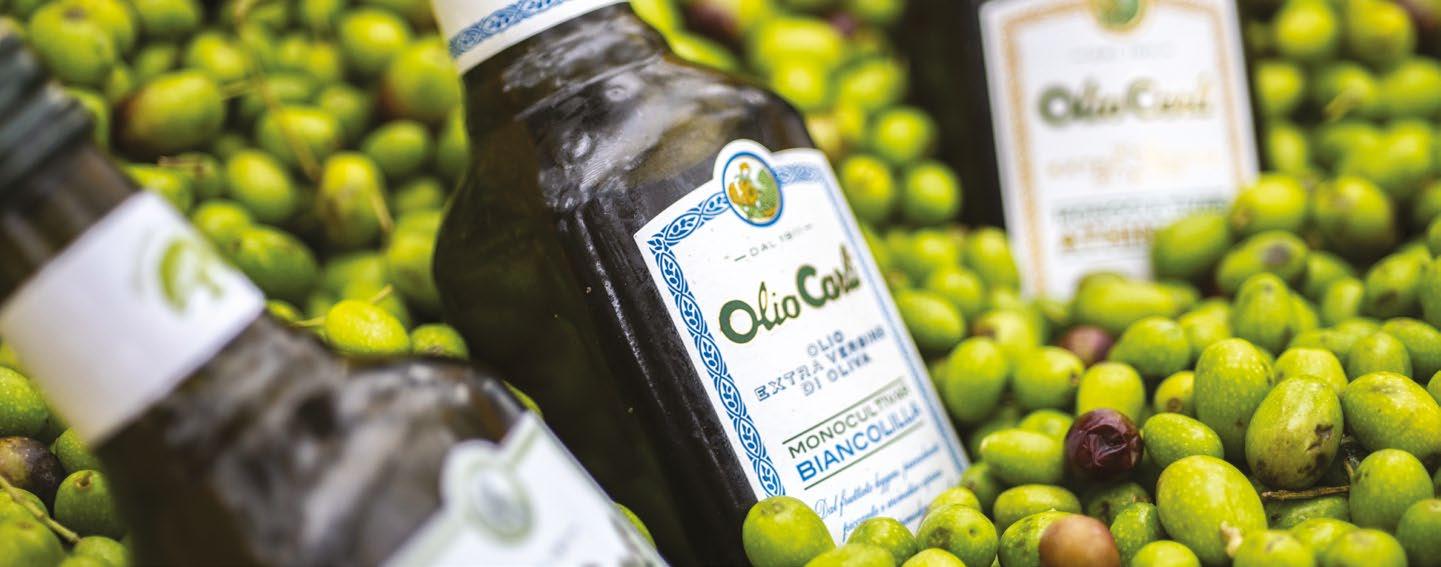
12 Zero Scope 2 emissions calculated by means of the market-based method, because the company consumes electrical energy solely from renewable sources, in part self-produced by means of photovoltaic panels and in part purchased and certified as 100% from renewable sources.
13 For the calculation method used, see the “Methodological Note” section.
14 For the calculation of the figure relating to water consumption, further details were made available compared to those considered and reported in the 2021 Sustainability Report for 2021. The data that became available during 2022 allowed us to make a more accurate calculation both for the reporting year (2022) and for the year 2021, so as to provide as reliable and consistent a picture as possible. The more accurate figure is therefore indicated in this report.
The material contained in this Sustainability Report refers to the following GRI Disclosures. Unless otherwise indicated, the disclosures are indicated in their entirety. Disclosure Description of the Indicator
The organization and its reporting practices
GRI 2-1 Organizational details
GRI 2-2 Entities included in the organization’s sustainability reporting
Pages 8; 20; 131
Page 131
GRI 2-3 Reporting period, frequency and contact point Page 131
GRI 2-4 Restatements of information
sosteniamoci@oliocarli.it
Compared to the data published in the 2022 Report, the following GRI have been updated: 2-8 | Workers who are not employees; 201-1 Economic value directly Generated and distributed 302-1 and 305-1 Energy consumed and the related Scope 1 emissions 305-3 Scope 3 emissions.
2-5
Disclosure
GRI 2-11 Chair of the highest governance body
GRI 2-12 Role of the highest governance body in overseeing the management of impacts
GRI 2-13 Delegation of responsibility for managing impacts
GRI 2-14 Role of the highest governance body in sustainability reporting
GRI 2-15 Conflicts of interest
GRI 2-16 Communication of critical concerns
GRI 2-17 Collective knowledge of the highest governance body
GRI 2-18 Evaluation of the performance of the highest governance body
GRI 2-19 Remuneration policies
GRI 2-20 Process to determine remuneration
GRI 2-21 Annual total compensation ratio
Strategy, policies and practices
GRI 2-22 Statement on sustainable development strategy
GRI 2-23 Policy commitments
GRI 2-24 Embedding policy commitments
GRI 2-25 Processes to remediate negative impacts
GRI 2-26 Mechanisms for seeking advice and raising concerns
GRI 2-27 Compliance with laws and regulations
GRI 2-28 Membership of associations
Stakeholder engagement
GRI 2-29 Approach to stakeholder engagement
GRI 2-30 Collective bargaining agreements
Page 20
Page 22
Page 22
Page 20
Page 23
Page 23
Page 20
The Board of Directors is not subjected to evaluation of its performance with reference to the supervision of impacts on the economy, the environment and people
Page 22
Page 22
Confidentiality constraints
Pages 29-30
Pages 22-23
Pages 22-23
Pages 22-23
Page 23
Page 23
Page 23
Page 42
Page 59
Disclosure Description of the Indicator
Material issues
GRI 3-1 Process to determine material issues
GRI 3-2 List of material issues
Enhancing local communities
GRI 3-3 Management of material issues
GRI 201-1 Economic value directly generated and distributed
GRI 204-1 Proportion of expenditure to local suppliers
Ethical business conduct
GRI 3-3 Management of material issues
GRI 205-3 Confirmed incidents of corruption and actions taken
Sustainability of materials and product eco-design
GRI 3-3 Management of material issues
GRI 301-1 Materials used by weight or volume
Climate action
GRI 3-3 Management of material issues
GRI 302-1 Energy consumption within the organization
GRI 305-1 Direct GHG emissions (Scope 1)
GRI 305-2 Indirect GHG emissions from energy consumption (Scope 2)
GRI 305-3 Other Indirect GHG emissions (Scope 3)
Reducing the production footprint
GRI 3-3 Management of material issues
GRI 303-1 Interaction with water as a shared resource
GRI 303-2 Management of impacts related to water discharge
GRI 303-3 Water withdrawal
Pages 34-41
Pages 37-41
Pages 39; 64-94
Page 43
Page 94
Pages 20-41
Page 136
Pages 39-76
Pages 143-144
Pages 40; 103-117
Pages 145-146
Page 147
Page 147
Page 147
Pages 40; 117
Page 117
Page 117
Page 148
Disclosure Description of the Indicator
GRI 303-4 Water discharge Page 148
GRI 303-5 Water consumption Page 148
GRI 306-1 Waste generation and significant waste-related impacts Pages 111-113
GRI 306-2 Management of significant waste-related impacts Pages 111-113
GRI 306-3 Waste generated Page 149
GRI 306-4 Waste not sent to landfill Page 149
GRI 306-5 Waste sent to landfill Page 149
Responsible supply chain management
GRI 3-3 Management of material issues
Pages 39; 91-101
GRI 308-1 New suppliers selected using environmental criteria Page 136
GRI 414-1 New suppliers selected using social criteria Page 136
Employees’ safety and rights
GRI 3-3 Management of material issues Pages 38; 51-71
GRI 403-1 Occupational health and safety management system Pages 58-59
GRI 403-2 Hazard identification, risk assessment and incident investigation Page 59
GRI 403-3 Occupational health services Pages 57-59
GRI 403-4 Worker participation, consultation and communication on occupational health and safety Pages 57-59
GRI 403-5 Worker training on occupational health and safety Page 60
GRI 403-6 Promotion of worker health Pages 57-59
GRI 403-7 Prevention and mitigation of occupational health and safety impacts directly linked by business relationships Pages 58-59
GRI 403-9 Injuries in the workplace Page 139
GRI 406-1 Incidents of discrimination and corrective actions taken Page 59
Disclosure Description of the Indicator
Personal wellbeing and development
GRI 3-3
Management of material issues
GRI 401-1 New hires and employee turnover
GRI 401-2 Benefits for full-time employees not available for part-time temporary employees
GRI 404-1 Average yearly training hours per employee
Diversity and equal opportunities
GRI 3-3
Management of material issues
GRI 405-1 Diversity of governance bodies and employees
Food safety
GRI 3-3 Management of material issues
GRI 416-2 Episodes of non-compliance concerning health and safety impacts of products and services
Product quality and excellence
GRI 3-3 Management of material issues
GRI 417-3 Incidents of non-compliance concerning marketing communications
Respect for privacy
GRI 3-3
Management of material issues
GRI 418-1 Justified complaints concerning breaches of customers’ privacy and loss of their data
Fostering healthy lifestyles by promoting the Mediterranean diet
GRI 3-3 Management of material issues
Customer satisfaction and safety
GRI 3-3 Management of material issues
Pages 38; 51-71
Pages 56; 138
Page 57
Page 140
Pages 38; 51-71
Pages 20; 141-142
Pages 39; 76-77
Page 77
Pages 39; 76-77
Page 77
Pages 41; 59; 60
Page 142
Pages 41; 119-127
Pages 39; 68-71

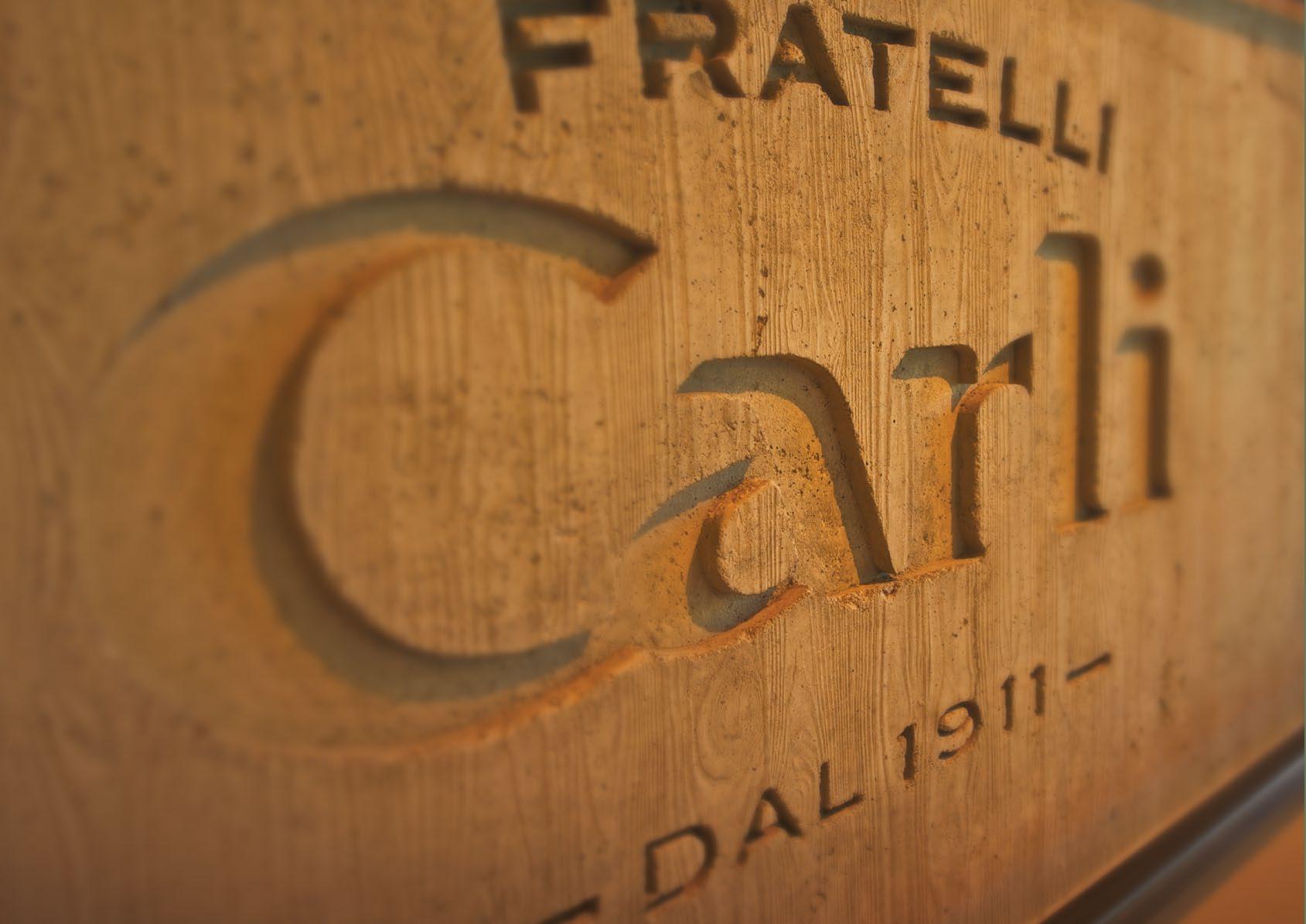

Relazione della società di revisione indipendente sul Report di Sostenibilità
Al Consiglio di Amministrazione della Fratelli Carli S.p.A. Società Benefit
Directors of Fratelli Carli SpA Società Benefit
We were entrusted with conducting a limited assurance engagement on the Sustainability Report of Fratelli Carli S.p.A. Società Benefit (hereinafter also “the Company”) regarding the FY that ended on 31 December 2023
Siamo stati incaricati di effettuare un esame limitato (“limited assurance engagement”) del Report di Sostenibilità della Fratelli Carli S.p.A. Società Benefit (di seguito anche “la Società”) relativo all’esercizio chiuso al 31 dicembre 2023.
Responsabilità degli Amministratori per il Report di Sostenibilità
The Directors of Fratelli Carli SpA Società Benefit are responsible for drafting the Sustainability Report in compliance with the “Global Reporting Initiative Sustainability Reporting Standards” defined by the GRI – Global Reporting Initiative (“GRI Standards”) as described in the section “Methodology Note” of the Sustainability Report.
Gli Amministratori della Fratelli Carli S.p.A. Società Benefit sono responsabili per la redazione del Report di Sostenibilità in conformità ai “Global Reporting Initiative Sustainability Reporting Standards” definiti dal GRI - Global Reporting Initiative (“GRI Standards”), come descritto nella sezione “Nota metodologica” del Report di Sostenibilità.
The Directors are also responsible for the supervisory role they consider necessary to enable the drafting of a Sustainability Report that does not contain significant errors due to fraud or unintentional behaviours or events.
Gli Amministratori sono altresì responsabili per quella parte del controllo interno da essi ritenuta necessaria al fine di consentire la redazione di un Report di Sostenibilità che non contenga errori significativi dovuti a frodi o a comportamenti o eventi non intenzionali.
The Directors are also responsible for defining the Company’s performance targets in relation to sustainability, as well as for identifying stakeholders and the significant aspects to report on.
Gli Amministratori sono inoltre responsabili per la definizione degli obiettivi della Società in relazione alla performance di sostenibilità, nonché per l’identificazione degli stakeholder e degli aspetti significativi da rendicontare.
Indipendenza della società di revisione e controllo della qualità
We are independent in compliance with the principles of ethics and independence of the International Code of Ethics for Professional Accountants (including International Independence Standards) (IESBA Code) issued by the International Ethics Standards Board for Accountants, based on the fundamental principles of integrity, impartiality, competence and professional diligence, confidentiality and professional conduct.
Siamo indipendenti in conformità ai principi in materia di etica e di indipendenza dell’International Code of Ethics for Professional Accountants (including International Independence Standards) (IESBA Code) emesso dall’International Ethics Standards Board for Accountants, basato su principi fondamentali di integrità, obiettività, competenza e diligenza professionale, riservatezza e comportamento professionale.
Our auditing firm applies the International Standard on Quality Control 1 (ISQC Italia 1), and consequently, maintains a quality control system that includes directives and procedures documented on compliance with ethical and professional principles and the applicable legal measures and regulations.
La nostra società di revisione applica l’International Standard on Quality Control 1 (ISQC Italia 1) e, di conseguenza, mantiene un sistema di controllo qualità che include direttive e procedure documentate sulla conformità ai principi etici, ai principi professionali e alle disposizioni di legge e dei regolamenti applicabili.
EY S.p.A.
Registered Office: Via Meravigli, 12 – 20123 Milan Secondary Office: Via Lombardia, 31 – 00187 Rome Share Capital Euro 2,600,000.00 fully paid up Registered with the Ordinary Section of the Register of Companies at the Chamber of Commerce of Milan Monza Brianza Lodi T.I.N. and registration number 00434000584 – Economic and Administrative Index of Milan no. 606158 – VAT no. 00891231003 Registered with the Register of Statutory Auditors under no. Published in the Official Gazette Suppl. 13 - IV Special series of 17/2/1998

Responsabilità della società di revisione
È nostra la responsabilità di esprimere, sulla base delle procedure svolte, una conclusione circa la conformità del Report di Sostenibilità rispetto a quanto richiesto dai GRI Standards. Il nostro lavoro è stato svolto secondo quanto previsto dal principio “International Standard on Assurance Engagements ISAE 3000 (Revised) - Assurance Engagements Other than Audits or Reviews of Historical Financial Information” (di seguito anche “ISAE 3000 Revised”), emanato dall’International Auditing and Assurance Standards Board (IAASB) per gli incarichi di limited assurance. Tale principio richiede la pianificazione e lo svolgimento di procedure al fine di acquisire un livello di sicurezza limitato che il Report di Sostenibilità non contenga errori significativi.
It is our responsibility, based on the procedures carried out, to draft a conclusion regarding the compliance of the Sustainability Report with the requirements of the GRI Standards. Our work has been carried out in accordance with the provisions of the “International Standard on Assurance Engagements ISAE 3000 (Revised) – Assurance Engagements Other than Audits or Reviews of Historical Financial Information” (hereinafter also “ISAE 3000 Revised”), issued by the International Auditing and Assurance Standards Board (IAASB) for limited assurance. This standard requires the planning and carrying out of procedures in order to acquire limited assurance that the Sustainability Report does not contain significant errors.
Pertanto, il nostro esame ha comportato un’estensione di lavoro inferiore a quella necessaria per lo svolgimento di un esame completo secondo l’ISAE 3000 Revised (“reasonable assurance engagement”) e, conseguentemente, non ci consente di avere la sicurezza di essere venuti a conoscenza di tutti i fatti e le circostanze significativi che potrebbero essere identificati con lo svolgimento di tale esame.
Therefore, the scope of our examination was inferior to that required for conducting a reasonable assurance engagement in accordance with ISAE 3000 Revised. Consequently, we cannot be certain that we have ascertained all the significant facts and circumstances that could be identified if such an engagement were carried out.
Le procedure svolte sul Report di Sostenibilità si sono basate sul nostro giudizio professionale e hanno compreso colloqui, prevalentemente con il personale della Società responsabile per la predisposizione delle informazioni presentate nel Report di Sostenibilità, nonché analisi di documenti, ricalcoli ed altre procedure volte all’acquisizione di evidenze ritenute utili.
In particolare, abbiamo svolto le seguenti procedure:
The procedures carried out on the Sustainability Report are based on our professional judgement, and included interviews, mainly with the Company personnel responsible for drafting the information presented in the Sustainability Report, as well as an analysis of documents, recalculations and other procedures designed to acquire evidence considered useful.
1. analisi del processo di definizione dei temi rilevanti rendicontati nel Report di Sostenibilità, con riferimento alle modalità di identificazione in termini di loro priorità per le diverse categorie di stakeholder e alla validazione interna delle risultanze del processo;
2. comparazione tra i dati e le informazioni di carattere economico-finanziario riportati nel Report di Sostenibilità e i dati e le informazioni incluse nel bilancio d’esercizio della Società;
Specifically, we carried out the following procedures:
3. comprensione dei processi che sottendono alla generazione, rilevazione e gestione delle informazioni qualitative e quantitative significative incluse nel Report di Sostenibilità.
In particolare, abbiamo svolto interviste e discussioni con il personale della Direzione della Società e del sito produttivo di Gazzelli e abbiamo svolto limitate verifiche documentali, al fine di raccogliere informazioni circa i processi e le procedure che supportano la raccolta, l’aggregazione, l’elaborazione e la trasmissione dei dati e delle informazioni di carattere non finanziario alla funzione responsabile della predisposizione del Report di Sostenibilità.
1 analysis of the process for defining the significant matters reported on in the Sustainability Report, with reference to how they were identified in terms of priority for the various categories of stakeholders and the internal validation of the process outcomes;
Inoltre, per le informazioni significative, tenuto conto delle attività e delle caratteristiche della Società:
2 comparison between the data and the information of an economic and financial nature reported in the Sustainability Report and the data and the information included in the financial statements of the Company;
- a livello di azienda:
a) con riferimento alle informazioni qualitative contenute nel Report di Sostenibilità abbiamo effettuato interviste e acquisito documentazione di supporto per verificarne la coerenza con le evidenze disponibili; b) con riferimento alle informazioni quantitative, abbiamo svolto sia procedure analitiche che limitate verifiche per accertare su base campionaria la corretta aggregazione dei dati.
3 Understanding of the processes underlying the generation, collection and management of the significant qualitative and quantitative information included in the Sustainability Report. Specifically, we conducted interviews and discussions with the Company Management and the personnel of the Gazzelli production plant, as well as limited checks on documents, in order to gather information on the processes and procedures supporting the collection, aggregation, processing and transmission of data and information of a non-financial nature to the function responsible for preparing the Sustainability Report.
- Per la sede di via Garessio, che abbiamo selezionato sulla base della sua attività, del suo contributo agli indicatori di prestazione e della sua ubicazione, abbiamo effettuato incontri nel corso dei quali ci siamo confrontati con i responsabili e abbiamo acquisito riscontri documentali su base campionaria circa la corretta applicazione delle procedure e dei metodi di calcolo utilizzati per gli indicatori.

Relazione della società di revisione indipendente sul Report di Sostenibilità
In addition, for the significant information, taking account of the activities and characteristics of the Company:
- At company level:
Al Consiglio di Amministrazione della Fratelli Carli S.p.A. Società Benefit
a) with reference to the qualitative information contained in the Sustainability Report, we conducted interviews and acquired supporting documentation to verify consistency with the evidence available;
Siamo stati incaricati di effettuare un esame limitato (“limited assurance engagement”) del Report di Sostenibilità della Fratelli Carli S.p.A. Società Benefit (di seguito anche “la Società”) relativo all’esercizio chiuso al 31 dicembre 2023.
b) with reference to the quantitative information, we conducted both analytical procedures and limited checks to ascertain the correct aggregation of data, on a sample basis.
Responsabilità degli Amministratori per il Report di Sostenibilità
Gli Amministratori della Fratelli Carli S.p.A. Società Benefit sono responsabili per la redazione del Report di Sostenibilità in conformità ai “Global Reporting Initiative Sustainability Reporting Standards” definiti dal GRI - Global Reporting Initiative (“GRI Standards”), come descritto nella sezione “Nota metodologica” del Report di Sostenibilità.
- For the facility in Via Garessio, which we selected based on its activities, its contribution to the performance indicators and its location, we conducted encounters, during which we discussed matters with the figures responsible and acquired documentary evidence, on a sample basis, regarding the correct application of the procedures and the calculation methods used for the indicators.
Gli Amministratori sono altresì responsabili per quella parte del controllo interno da essi ritenuta necessaria al fine di consentire la redazione di un Report di Sostenibilità che non contenga errori significativi dovuti a frodi o a comportamenti o eventi non intenzionali.
Gli Amministratori sono inoltre responsabili per la definizione degli obiettivi della Società in relazione alla performance di sostenibilità, nonché per l’identificazione degli stakeholder e degli aspetti significativi da rendicontare.
Indipendenza della società di revisione e controllo della qualità
Based on the work carried out, no elements have come to our attention that lead us to believe that the Sustainability Report of Fratelli Carli S.p.A. Società Benefit regarding the FY that ended on 31 December 2023 has not been drafted, in all its significant aspects, in compliance with the requirements of the GRI Standards as described in the Methodology Note paragraph of the Sustainability Report.
Genova, 28 June 2024
EY S.p.A.
Siamo indipendenti in conformità ai principi in materia di etica e di indipendenza dell’International Code of Ethics for Professional Accountants (including International Independence Standards) (IESBA Code) emesso dall’International Ethics Standards Board for Accountants, basato su principi fondamentali di integrità, obiettività, competenza e diligenza professionale, riservatezza e comportamento professionale.
Luigi Conti (Statutory Auditor)
La nostra società di revisione applica l’International Standard on Quality Control 1 (ISQC Italia 1) e, di conseguenza, mantiene un sistema di controllo qualità che include direttive e procedure documentate sulla conformità ai principi etici, ai principi professionali e alle disposizioni di legge e dei regolamenti applicabili.

Fratelli Carli S.p.A. Società Benefit
Via Garessio 11, 18100 Imperia www.oliocarli.it